Back to Home
PRODUCTIONS WORKED ON IN THE WEST END AND ON TOUR 1948-62
PRIOR TO JOINING BERNARD DELFONT LIMITED
1948
|
| |
At 9.30 a.m. on a Monday morning early in January 1948 my career in show business commenced. My first job was to collect two black cats from a pet shop near Cambridge Circus in London. I picked them up, put them in a wicker basket and set off by taxi to the Piccadilly Theatre, where as an assistant stage manager I was going to join the company of the play ‘I Remember Mama’ for the first day of rehearsals. The play had been an enormous success on Broadway and the theatrical company H.M. Tennent had decided to present it in the West End starring the leading lady from Broadway, Mady Christians.
I arrived at the stage door of the Piccadilly, paid off the taxi, which in those days cost nine pence plus three pence tip. I entered the stage door and was greeted by the company manager, a charming gentleman named Paddy Donnell. His very first words to me were, ‘Now that you are working on stage management you must never forget any detail, however small. Go out and buy yourself a reporter’s notebook and write down everything you need to remember’. The advice stuck; to this day I still write everything down in a reporter’s notebook.
He then introduced me to the rest of the stage management team, and we in turn were introduced to the company and to Mady Christians who was also going to direct the play. The usual pleasantries were exchanged, chairs were placed round in a semi-circle facing the auditorium which was in darkness, the cast all took their seats, ready for the first reading and I as a junior ASM, was dispatched with the two black cats in the wicker basket into the pitch-black auditorium.
The reading commenced. After about fifteen minutes I began to feel a little bored and decided to see how the cats were getting on. I lifted the lid of the basket to peer in and quick as a flash, the two cats jumped out and disappeared under the seats. Panic stricken, I started to scramble about on my hands and knees looking for them. After about five minutes of this activity, with the attendant noise, the cast became aware that something peculiar was taking place out there in the darkness and stopped reading. Mady Christians called out, ‘Is everything all right?’ In a frightened voice I replied, ‘I’m afraid not - the two cats have escaped.’ Mady called the reading to a halt and asked the entire company, numbering about twenty people, to go out and help in the search. There are about 550 seats in the stalls of the Piccadilly and everybody was crawling about on their hands and knees falling over each other in the dark. Eventually the house lights were turned on and the cats were retrieved and placed back in the basket. I waited with fear and trepidation for the sack, thereby establishing the shortest show business career in the annals of theatrical history – duration - a little over one hour. Fortunately for me, Mady thought it was a big laugh. It certainly broke the ice at the first rehearsal and my career was launched.
My father was responsible for me obtaining my first job as he was stage manager for HM Tennent's biggest show, 'Oklahoma' at the Theatre Royal Drury Lane. They were happy to oblige him and gave me a job as assistant stage manager.
I came from a theatrical background. My father was an actor and stage manager and his mother was an actress, performing sketches in variety shows in the late 1800s early 1900s. My mother was a professional pianist and violinist. She was also a dancer and as a Tiller Girl performed in the Folies Bergère in Paris during the 1920s, appearing in shows which starred The Dolly Sisters and Josephine Baker.
Her father, who spent twenty years of his life writing a book on the conquest of South America, (it was never published), came from Dublin and was a professional musician who played the flute and oboe in theatre orchestras. With that background, I suppose you could say the theatre was in my blood.
It's hardly worth mentioning, but I will anyway. My father's cousin, Reginald Mills, was a film editor and received an Oscar nomination for his work on 'The Red Shoes' and Bafta nominations for Franco Zeffirelli's 'Romeo and Juliet' and 'Jesus of Nazareth'. I can imagine you thinking - this is stretching the relationships a bit - but may I remind you that even you and I are related, be it out of Africa or via Adam and Eve, whichever version you care to believe. So there.
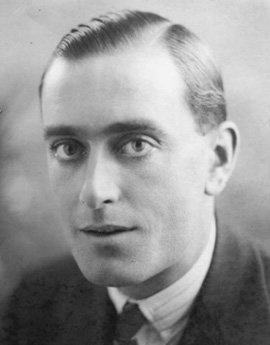
My father
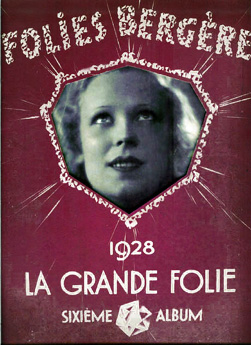
.................My mother whilst appearing in the Folies Bergère
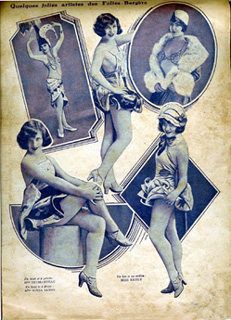
.......My mother in the Folies Bergère - centre and bottom left and right;
..........................the costumes look just a trifle dated
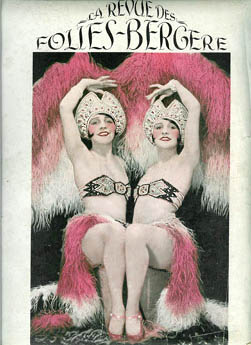
...................The Dolly Sisters starring in the Folies Bergère
|
| |
|
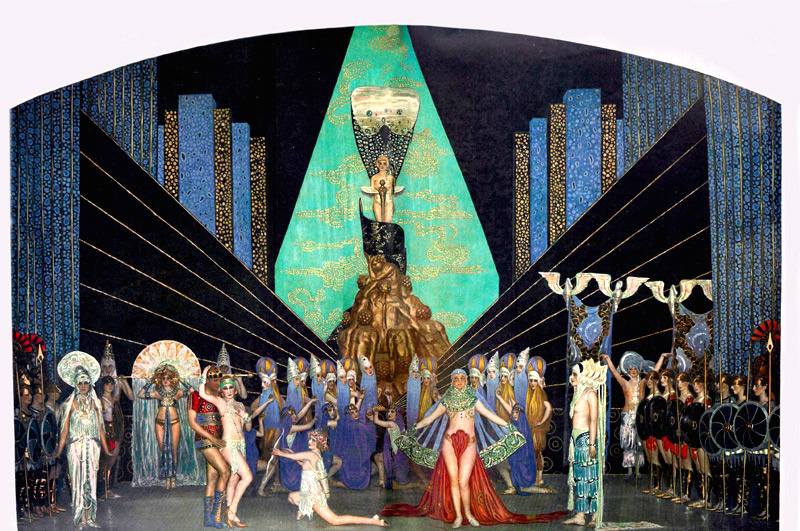
A scene from the Folies Bergère 1928
|
Here I was at sixteen acting as A.S.M – but there was a snag. Without any theatrical training at all, I was to understudy the part of Mady Christian’s son, a role that was created on Broadway in 1943 at the Music Box theatre by Marlon Brando, when he was a budding actor. I was extremely pleased that I never had to go on. I suppose in retrospect, it was just as well we weren’t doing one of Brando’s later plays ‘A Streetcar Named Desire’, since I think that to understudy his part in that play might have been just a little beyond my capabilities.
The Tennent headquarters were in the Globe theatre. In the foyer of the theatre just behind the box office was a rickety old iron lift which transported you up to the offices. It was surely among the smallest lifts in the world. The dimensions just exceeded the size of a largish coffin. At a pinch it would hold one fat man or two very thin men pressed up against each other, and it took about one and a half minutes to move two floors.
I had never been formally introduced to the managing director, Binkie Beaumont, but one day when I made my way to the lift, I found him just about to enter it. I stood back as he got in and with a smile, he beckoned me to join him. Being aware of Binkie’s reputation, I wasn’t quite sure which way to turn. I decided to face the gate and for the longest ninety seconds of my life, I was pressed firmly up against him, feeling his hot breath on the back of my neck whilst we rose slowly to the Tennent offices. We disembarked, he smiled sweetly, wished me a good morning, and that was the only conversation we had for the next twenty years.
It was during this show that I experienced my first brush with the gay side of show business (if you discount the lift encounter).One of the young gentlemen in the show was very friendly and invited me back to his flat for, I thought, tea and crumpet. After pouring the tea I found out I was to be the crumpet. I wasn’t exactly sure how to deal with it, but I decided it was likely to give me indigestion, made my excuses and left.
The show continued uneventfully. I was in charge of a truck, all the props on the OP side of the stage and also the cats. The principle Colditz trained cat in the show had to pretend to be dead when it was carried onstage and then recover and wave its tail. They say you can’t train cats to do tricks, but the other A.S.M, a young lady called Pamela, came up with the idea of vigorously stroking the cat’s tail just before it was carried onstage. This had the effect of the cat lying dormant for about a minute and would then wave its tail, much to the delight of the audience. Pamela became fond of the cat and gave it a home when the show closed. She later told me that every night at about the same time the cat used to wave its tail.
‘I Remember Mama’ was not a success and the notice to close was posted after only ten weeks. I was very upset and in the seclusion of my digs I wept for the first and last time over a show closing. Towards the end of the run I was approached by Joe Davis who was the Chief Lighting Designer for H.M. Tennent, who asked me if I would like to become a ‘Tennent Baby’. This was a young person who was trained in all aspects of the technical side of the theatre. Needless to say I jumped at the chance.
Tennents also had a scheme in which they put promising young actors under a one-year contract. Among these actors were Stanley Baker, Richard Burton and other household names. I can’t recall that any young actresses were put under contract. I’m sure there must have been, but not as many. This may have been due to the fact that a sort of ‘gay’ (although it wasn’t called that in those days), Mafia existed, the Don Corleone of which was Binkie Beaumont, who was the managing director of H.M. Tennent. As such, Binkie had almost total power over the West End. At any one time he had up to a dozen productions running and these were always at the most desirable theatres. No other producers had a chance of getting one of these plums. He had the first choice of all plays and the cream of actors, actresses, directors and designers queued up to work for him. If he wanted their services they agreed without hesitation, since to refuse was almost the end of their theatrical careers. Hence there was a virtual dictatorship.
Binkie was totally ruthless and very few people dared to cross him. He was however, handsome, elegant and charm personified. He also had a great sense of humour. One day a young butch actor was auditioning for him for the first time and being mindful of the fact that Binkie was more inclined to the ethereal style of acting rather than the bum scratching kind and, not wanting to take a chance that Binkie might possibly fancy him, at the end of his audition he shielded the light from the spotlights from his eyes, peered across the footlights and said ‘Mr. Beaumont, I know the character should be more poetical and I’m sorry if I made it appear too masculine,’ to which Binkie replied, (I’m sure with a twinkle in his eye), ‘That’s all right my dear, it doesn’t show from the front’.
People may not have agreed that one man should have so much power, but he entertained the public with the finest actors and actresses in the world. He filled the theatres, kept many people of the theatre employed and did it with quality, good taste and style and I for one, believe you could ask for no more. I miss him.
|
|

|
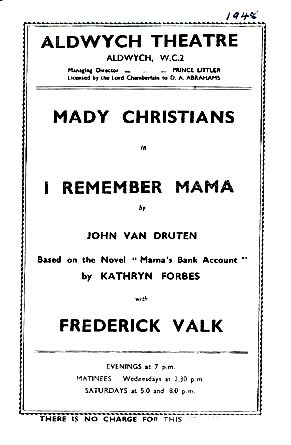
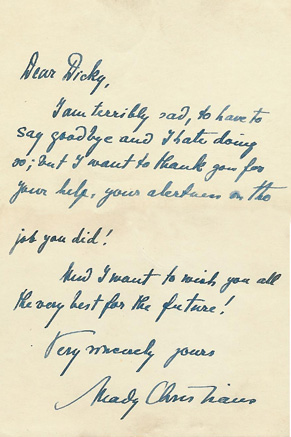
|
| |
‘I REMEMBER MAMA ’
In Order of Appearance:
..
|
Katrin Hanson |
|
Helen Backlin |
Mama |
|
Mady Christians |
Papa |
|
Gerard Heinz |
Dagmar hanson |
|
Maureen Davis |
Christine Hanson |
|
Henryetta Edwards |
Mr. Hyde |
|
Maurice Jones |
Nels Hanson |
|
Gunnar Hafsten |
Aunt Trina |
|
Adrienne Gessner |
Aunt Jenny |
|
Lilly Kann |
Aunt Sigrid |
|
Amy Frank |
Uncle Chris |
|
Fredrick Valk |
A Woman |
|
Josephine Dent |
Dr. Johnson |
|
Daniel King |
Mr Thorkelson |
|
Milo Sperber |
A Nurse |
|
Pamela Stocks |
Another Nurse |
|
Vivine Cornell |
A Scrubwoman |
|
Margaret Evans |
A Doctor |
|
Peter Grisewood |
Elevator Boy |
|
Fred Marshall |
Arne |
|
David Cole |
Another Nurse |
|
Ethel Ramsay |
Soda Clerk |
|
Peter Bartlett |
Madeline |
|
Gillian Raine |
Dorothy Schiller |
|
Sylvia Clarke |
Florence Dana Moorehead |
|
Josephine Wray |
Bell Boy |
|
Peter Bartlett |
| |
|
|
Directed by Mady Christians |
| |
|
MADY CHRISTIANS BLOOPER: It was reported that on-stage one night in New York, Mady gathered her family round her and said: 'You've all been such good children that tonight we will read you excerpts from Charles Dickens' 'A Sale of Two Titties'.
When ‘I Remember Mama’ closed, the moment we finished packing up and getting out of the theatre, my training as a ‘Tennent Baby’ commenced. I reported to the H.M.Tennent stores in Lambeth where I was to become a general dogsbody, sweeping the floor, running errands and helping to maintain all the stage lighting equipment. I received £6 a week, (a decent living wage then). My hours were 9 a.m. to 6.p.m. but then came the best bit. I had to go up to the West End each evening to further my training and stand in the prompt corner of various Tennent shows to see how they were all run. This was like nectar of the gods to me because even as an eight year old, I was in seventh heaven if I could just sit in my father’s dressing room in a theatre.
My first assignment was at the Phoenix Theatre where the Restoration comedy ‘The Relapse’ was playing starring Cyril Ritchard, Madge Elliot and Paul Schofield. The kindly Stage Manager who was running the show from the prompt corner asked me to stand next him to see how it was all done. For the next two weeks I stood there, fascinated by the sheer magic of what was going on around me The towering delights of the performances of Paul Schofield and Cyril Ritchard and, (as Irving Berlin wrote in one of his songs for ‘Annie Get Your Gun’) ‘the costumes, the scenery, the make-up, the props’ - there was indeed no business like show business. I was not however entranced by having to be in the stores every morning at 9.00 a.m.
One of my colleagues at the stores was a nineteen year old electrician called Norman who, when he was not in his working clothes was one of the most impeccably dressed young men I’d ever seen - in complete contrast to me with my one suit. When we were having a drink one evening he introduced me to a gay friend of his, who invited us both to a party he was throwing. Norman happily accepted but I asked if I might think about it. When Norman and I were on our own, Norman furiously asked me why I hadn’t accepted the invitation to what he considered would be a glamorous show business party. I replied, ‘To be quite honest Norman, I feel a little bit embarrassed about my clothing. This is the only suit I possess and it’s not that smart’. Norman who wanted me to go, mainly I think to make sure that there was somebody at the party that he knew, said, ‘Don’t worry – you can borrow one of my suits’. Since we were of almost identical size I accepted his kind offer. Looking immaculate, we both attended the party and I proceeded to get extremely drunk. Norman having persuaded me to attend was most solicitous and looked after me for the whole evening. When the host complimented Norman on his devotion to me, Norman said, ‘Fuck him - I’m just frightened he’s going to throw up all over my suit’.
When I wasn’t sent to a Tennent show to observe, I would go and stand in the prompt corner of my father’s show, ‘Oklahoma’. The leading role, Curly, was played by Howard Keel, (or Harold as he was known then), and the entire cast had been brought over from America. I felt as if I had died and gone to show business heaven - being within touching distance night after night of the lovely, radiant, brilliantly talented girls and the tall, handsome, all singing, all dancing, masculine American cowboys. At that time most of the English chorus boys were rather precious. In ‘The Student Prince’ when they sang, ‘Hey boys, lets all be gay boys’ I suspect they really meant it. I may be wrong but I believe this is where the expression ‘gay’ came from.
With H.M. Tennent’s approval, my father had been left in sole charge of everything artistic to do with ‘Oklahoma’ by Jerome Whyte, the Production Manager for the Theatre Guild of America, who had reproduced it for this country. Jerry was a character who had worked as a taxi driver in New York before he started working in the theatre and even after more than twenty years in the business, he always kept his cab licence up to date - ‘just in case’ as he put it.
My father took his duties seriously and was a very strict disciplinarian. One of my memories of him was him looking up at Harold Keel who towered about ten inches above him, and giving him a rollicking for trying to tell my father how many curtain calls should be taken, and Harold taking it.
About six years later when the show was on tour, my father who was extremely desperate to find a replacement for his deputy stage manager who was leaving, phoned me up and asked if I would like to take over the job. Whilst I was mulling this over, he added there was however, a catch. I had also to be second understudy in the dream ballet sequence to Jud Fry. Since Jud was a heavy surly thirty-year old (played in the film by Rod Steiger), and I couldn’t dance, I politely declined the offer.
Early in June, Joe Davis informed me that my training was now going to involve me going on tour with a revue that was just finishing a successful run at the Globe Theatre (now the Gielgud). All the Tennent shows were lit by Joe. Among his many creative endeavours, he designed the lighting for Marlene Dietrich whenever she performed her one-woman show. Because of her advancing years, she was paranoid about her lighting which had to be very softly lit from the front with a colour called ‘36 Pink’, (also known in the profession as ‘wrinkle remover’) and very strongly lit from the back. This had the effect of highlighting her figure which was in great shape, but not revealing too much of her once exquisite face, which was now beginning to show little signs of wear and tear.
Joe was the only person she would allow to light her on stage. So, as a superstar, wherever she was appearing throughout the world, the call would go out to Joe who if possible, had to drop everything he was doing and attend to her lighting. Once when she was appearing in London and staying at the Savoy Hotel, she phoned Joe and asked him to come and see her at once on a matter of supreme importance. He, thinking she wanted to discuss a world tour or something of extreme magnitude, hurried down to the Savoy. Breathless, he arrived at her suite to be met with the words, ‘Dear Joe, thank you for coming. Would you look at the lighting in my bathroom - I can’t see to make up properly’.
MARLENE DIETRICH QUOTE: "Sex. In America an obsession. In other parts of the world a fact".
Back to the plot. The review I was to tour with was called ‘Tuppence Coloured’ and starred Max Adrian, Joyce Grenfell and Elizabeth Welch. I was to be the assistant electrician and follow spot operator, or ‘lime’ as it was known then. I spent a week at the Globe Theatre with one of the resident lime operators learning the show. The following week, during which I had my seventeenth birthday, we opened at the Wimbledon Theatre. All was going very nicely and I was thinking what a good lime operator I was and how everyone in the cast would be very pleased with me, when the decrepit old lime I was working with collapsed, and I had to rush round to the other side of the theatre and take over the second lime and try to cover with one lime all the situations which required two. I managed - but not too successfully. Another great start to a job!
Incidentally, I believe that a follow spot operator has one of the most demanding jobs in the theatre. They can’t relax for a moment and a one inch deviation from the back of the gallery where the spot is usually situated, means a one or two feet deviation onstage - ergo, no light on the star. Sometimes the coloured filters on the front of the lens had to be changed in quick black-outs.
In the days when I started they were arc lights. Instead of bulbs, you had encased in the metal housing of the lamp two carbon rods, slightly separated through which a direct current was passed, creating a very bright light. As the rods burnt away, you had to keep adjusting them. Quite a juggling act, whilst trying to keep a pin spot on an actor’s face about eighty yards away.
The next date on the tour was Brighton. I was unsure of how to obtain digs and one of the young men in the show named Brian, offered to assist me. (You’ve guessed it. He was gay). We arrived at his digs and the landlady said she could fix us up with a twin-bedded room, but not until the next night. That night we would have to share a bed. After a minor tussle I finished up sleeping on the floor. However, he did take no for an answer and we formed a platonic friendship which lasted for many years.
Another of the gay men in the show was John Heywood who was also rather keen on me; I was only seventeen and fresh faced after all. He too was to become another platonic friend. Do I hear you saying to yourself, ‘Methinks he doth protest too much?’ If so, forget it – it’s true. John later went on to choreograph ‘The Boy Friend’ at the Players Theatre. In fact - he asked me to be his escort on the first night when it transferred to the Wyndhams Theatre, as his lucky mascot.
Over the years I spent many late nights in the restaurant at the Players Theatre. This was a meeting place for many show business people who had wanted to get a late night drink after their shows finished. A large percentage of them were ‘queens’ and I was sometimes the centre of attention, which, to be quite honest I was quite flattered by. But I would much sooner have been surrounded by girls, of which there was a bit of a famine at that time.
Whilst on tour with ‘Tuppence Coloured’, the only lady I got to know briefly was the wardrobe mistress named Wynne who was in her early thirties and attractive. I think she felt sorry for me. When the tour finished it was back to the stores at Lambeth and working in the evening on ‘Lady Windermere’s Fan’. John Gielgud was appearing in this and would give me the odd smile and chat occasionally, but he didn’t become a platonic friend.
|
|
|
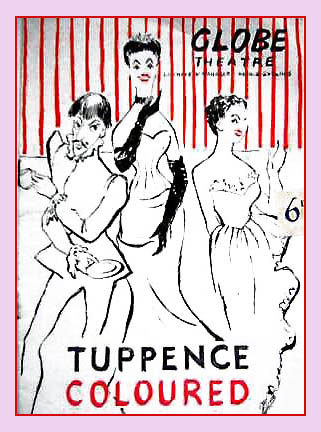
|
| |
‘TUPPENCE COLOURED ’
An Intimate Revue by Laurier Lister
...
|
Max Adrian |
Joyce Grenfell |
Elisabeth Welch |
Daphne Oxenford |
Charlotte Mitchell |
John Heawood |
Denis Martin |
Franklin Bennett |
Elizabeth Cooper |
Beryl Seaton |
| |
| |
Producer: Laurier Lister |
| |
| |
|
JOYCE GRENFELL QUOTE: "Happiness is the sublime moment when you get out of your corsets at night".
It was during this time that I fell in love for the first time. I met up again with Mrs Marsh who had been the matron on ‘I Remember Mama’, looking after two children in the show. She had two extremely attractive daughters who both attended the Aida Foster stage school. Jean who was fourteen, went on to create and appear in ‘Upstairs, Downstairs’ and in many other T.V programmes and films; Yvonne, who was sixteen and already a seasoned trouper had starred in a film entitled ‘The Little Ballerina’. Yvonne had been named ‘Britain’s Perfect Schoolgirl’ in a national newspaper campaign and was head girl at the Aida Foster School. She was tall, slim and beautiful with cascading blonde hair, funny and very self-possessed. I fell head over heels in love with her which to a certain extent was reciprocated.
Each night after the show I was working on finished, I would spend an hour on the phone to her (you could do that for tuppence those days), and each weekend I was invited to stay with them. I used to sleep on a divan in the sitting room and at night when everyone had gone to bed, Yvonne used to creep out of her bed and join me. Along with all the cuddles and fumbling, we used to listen to the radio very quietly, (the radio not us). I remember our particular favourite was ‘Jack Jackson’s Record Round Up’. We used to be awake until 4.00 in the morning but still couldn’t get up early enough to see each other the next day. We would spend the morning listening and singing along to records, with me doing my bad ‘Jolson’ impressions. But our favourite was Danny Kaye.
When he was appearing at the Palladium we waited at the stage door for two hours for him to arrive. When he got out of his car, Yvonne snatched his hat of his head and was about to run off with it when he gave her such an icy glare she was frozen to the spot (pardon the metaphor), and shame-facedly handed it back.
I said Yvonne was self-possessed. About twenty years later she was in a show with Max Bygraves called ‘Round About Piccadilly’ at the Prince of Wales. I was watching her sing a solo song downstage centre using the riser mike when slowly, her knickers began to descend. She didn’t bat an eyelid - she just continued singing, calmly stepped out of her knickers and kicked them into the orchestra pit.
My idyllic relationship with Yvonne was about to be put on hold. Joe Davis said he was going to send me to the Edinburgh Festival and then on tour with Euripides’ 'Medea', directed by John Gielgud and starring Eileen Herlie who was to replace Judith Anderson, who had played it on Broadway, but who had refused to come to London. Miss Herlie was a young actress from Glasgow who had created a great success in ‘The Eagle has Two Heads’. Binkie had great faith in her and wanted to build her into a star.
I thought I was working hard before - I was now about to find out what hard work was really like. We opened ‘Medea’ at the Edinburgh Festival and at the end of the run we went on tour. I received a weekly salary of £6 plus £2 for working on Sundays and a £2 touring allowance. On the final Saturday at Edinburgh, I worked in the morning, then did two shows working the lights on two temporary 12 way switchboards. As soon as the curtain fell we commenced breaking down the show and getting it out of the theatre. We loaded it onto lorries, which were then driven to the railway station, where we then unloaded it from the lorries onto railway trucks. By this time it was about four in the morning. I went back to the digs and got up at seven to catch the train call.
When we arrived at our destination, we immediately started unloading the scenery from the railway trucks onto lorries, drove them to the theatre, unloaded the show and started fitting it up. By this time it was late Sunday evening. We worked all through the night – Sunday fitting up and all the following day, Monday - lighting etc. We then did the evening show. This meant we had gone from Saturday morning until Monday evening with about three hours sleep.
Next day Tuesday, wasn’t too bad - just in the theatre in the morning, a break in the afternoon and back in the theatre for the show in the evening. Wednesday - theatre in the morning, matinee and an evening performance. Thursday and Friday - afternoons off; Saturday, Sunday and Monday same as previous weekend; this was the pattern for the tour. At the end of it I was pretty knackered. In those days, regardless of the size of the production, we always opened on a Monday.
Just to illustrate how tired we, the crew could get, on one occasion one of our electricians fell asleep on the switchboard whilst smoking a cigarette. When someone finally aroused him, the cigarette had burnt itself right the way through his fingers, down to the bone and it didn't wake him.
The distance between the dates on tour could sometimes create even greater problems in meeting the Monday deadline. On one occasion we closed on Saturday night in Southsea and after a thirteen hour train journey to Edinburgh, still had to meet the Monday deadline.
The show then came into the West End and we played at the Globe theatre. This meant I was back in the stores during the day and at the Globe in the evening, but I was able to speak every evening to Yvonne and see her on Sundays. The production was due to close just after Christmas and I had arranged to spend Christmas Day with Yvonne and her family, but there was a change of plan and they had to visit relatives. I was very disappointed, and consequently had a row with Yvonne which was the end of our relationship. Her lovely sister Jean turned up at the stage door of the Globe with a carrier bag full of Christmas presents, most which I believe Jean might have obtained from Boots. Anyway, they were very gratefully received. I tried unsuccessfully to patch up the relationship with Yvonne.
|
|

|
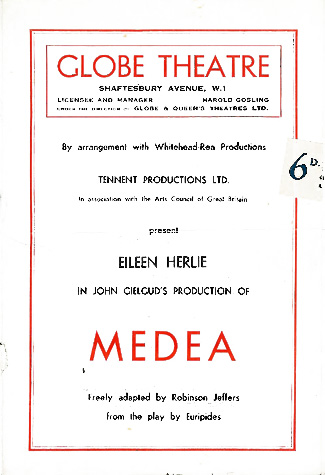
|
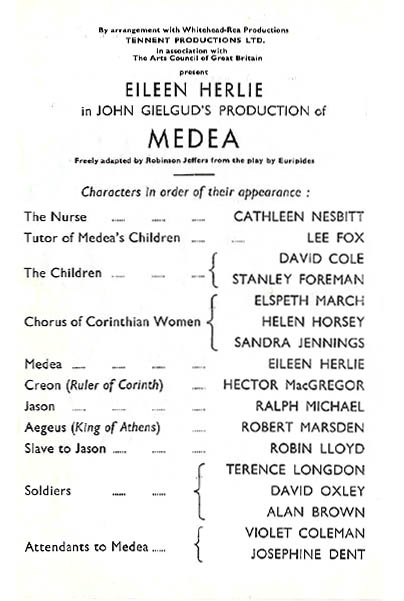
|
JOHN GIELGUD QUOTE: "Your English style will no doubt put all the other gentlemen to bed. I speak figuratively, of course".
|
|
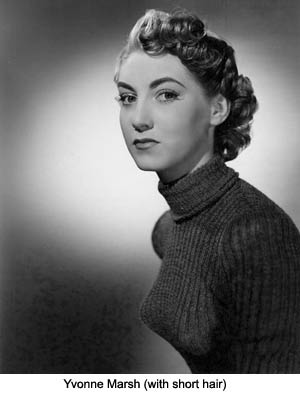
|
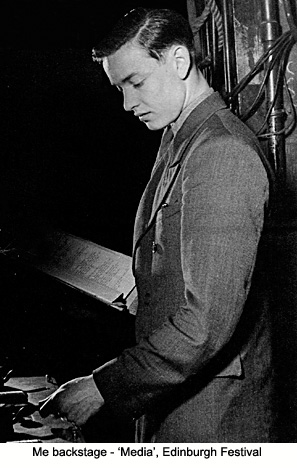 |
Joe Davis told me I was now going on tour as Assistant Electrician on ‘Adventure Story’ by Terence Rattigan. This was Rattigan's first attempt at a serious epic drama and he believed it was the best thing he had written. Binkie shared his faith by making it the most expensive and lavish production he had ever presented. It starred Paul Schofield who was in his mid-twenties and the word in the West End was that he was ‘ripe for super stardom’.
The story was about Alexander the Great and among an illustrious cast, there was a spear carrier called Stanley Baker. It was an enormous show, but once again there was no messing about. We had to open on Monday evenings so we were back to the same workload that we had had with ‘Medea’ - but even more so.
Paul was twenty-seven at the time and the play was specially written for him by Terence Rattigan. His wife, Joy Parker, also appeared in the play. Paul did indeed go on to become one of the century's greatest actors, but he was never the remotest bit interested in the glitter of showbusiness. He just wanted to act and as far as possible, he avoided all theatrical gatherings. His idea of a good time was to get on a train back to his home in Reading immediately after the performance and spend the next day walking his dogs in the country. This he continued to do for several decades.
He passed away in 2008 at the age of eighty-six.
At the end of the tour, the show moved into the St. James theatre which has long since vanished; it was just off Pall Mall, well away from the beaten track.
Once again I was in the stores during the day and at the theatre at night. The show wasn’t successful; Rattigan was attacked for attempting an epic drama instead of concentrating on what the critics considered he did best - his light comedies. When the notice was posted, Joe Davis said I had served my apprenticeship for just over a year and he was going to have to let me go. |
|
1949-1951

|
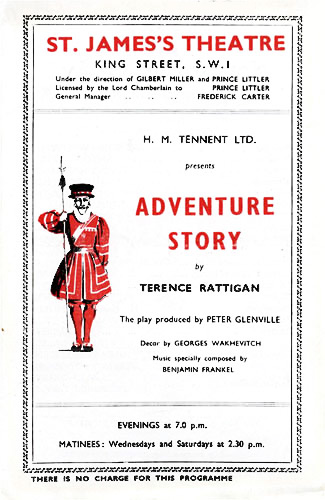
|
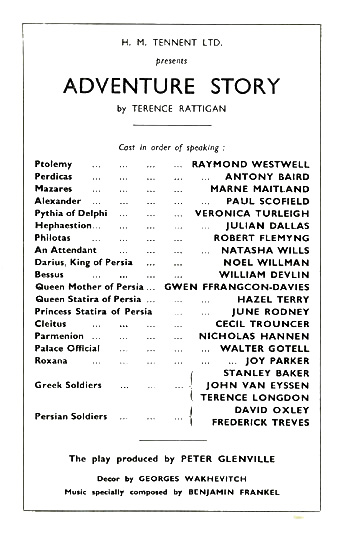
|
TERENCE RATTIGAN QUOTE: "I think the writer is trying to say: 'Look how unlike Terence Rattigan I am, Ma!'" - talking about John Osborne's 'Look Back in Anger'.
So here I was, seventeen, staying in digs, no job, no money and I had previously fallen out with my father over the company I was keeping, and although he didn’t say so, he thought incorrectly I was starting to prefer men to women, so there was no-one to turn to. I had to help myself as best I could. I went to the Labour Exchange – they said I was too young to receive unemployment benefit and too young for them to find me a job.
I foraged around the West End and got a job as an electrical showman at the Piccadilly theatre. That meant I was just employed for the shows, although I was looking for a full time job. The rates of pay were 40 pence a show, which just about paid for the cost of the bed and breakfast digs I was staying in and bus fares. Not a lot left for food, and certainly nothing for cigarettes which I had started smoking. I was reduced to foraging for dog ends, breaking them up and using the tobacco for roll-ups. I did one or two odd jobs for my landlady which meant I got the occasional free lunch.
The show I was working on at the Piccadilly theatre was titled ‘Ann Veronica’, starring Wendy Hiller. I was on the main switchboard and trying to supplement my income a bit by playing penny poker with some of the other operators. I can’t remember a great deal about the show, except that on one memorable occasion two ladies had to ride on the stage on a tandem bicycle - they rode straight over the floats into the orchestra pit. I will always remember Wendy Hiller coming forward to the floats, peering down into the darkness saying, ‘Are you all right down there?’
I will never forget the kindness of one of the permanent electricians at the theatre who, realising that I was rather hungry, took me out and bought me lunch at a café. It wasn’t very expensive but I can remember it was one of the best meals I had tasted for a long time.
I then took up with a lady called Audrey who was the Deputy Stage Manager of the show; this lasted for a little while. Audrey and I did a Sunday night performance as the Stage Management team of a show called ‘John Keats Lived Here’ which starred Denholm Elliott. We didn’t get paid for this but it was more experience.
Try as hard as I could, I couldn’t get a full time job; one of the reasons being that looming up ahead of me was the fact that I was going to be called up to do my two years National Service.
|
|
|
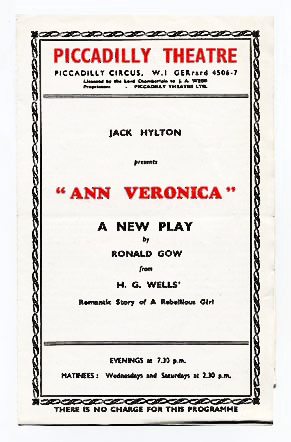
|
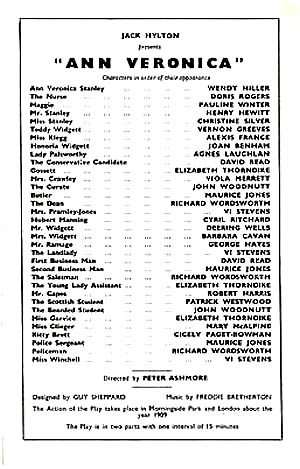
|
H.G. WELLS QUOTE: Cynicism is humor in ill health.
|
|
|
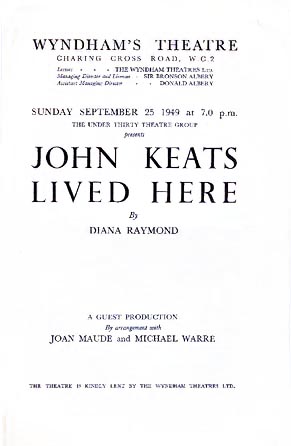
|
| |
DENHOLM ELLIOTT
‘JOHN KEATS LIVED HERE ’
In Order of Appearance:
... |
Charles Brown |
|
Eric Berry |
Abigale Donahue |
|
Josephine Crombie |
Charles Wentworth Dilke |
|
Jonathan Field |
John Keats |
|
Denholm Elliott |
Mrs. Brawne |
|
Mona Washbourne |
Fanny Brawne |
|
Rene Ray |
Joseph Severn |
|
Frank Duncan |
Benjamin Robert Haydon |
|
Robert Spaight |
Richard Abbey |
|
Kenneth Edwards |
| |
|
|
Designed and Directed by Michael Warre
Associate Director Joan Maude
|
| |
|
DENHOLM ELLIOTT QUOTE: "I like actors - such as Margaret Rutherford and Peter Lorre - who aren't afraid to over-act like real people. When I take a job I can always come up with ten different ways of doing the part. But I'll always choose the flashiest one. You've got to dress the window a bit."
JOHN KEATS QUOTE: "You speak of Lord Byron and me; there is this great difference between us. He describes what he sees I describe what I imagine. Mine is the hardest task".
When ‘Ann Veronica’ finished I still had about four weeks to go before call-up when a lifeline was given to me by Bill Bruce who was the Chief Electrician at the New Theatre, now known as the Coward.
He employed me as a showman working a temporary switchboard. The switchboard was in the flies and my cue sheets were propped up against the fly rail. One night I brushed against them and they fluttered down across the stage in the middle of the performance of ‘Love’s Labours Lost’ which starred Michael Redgrave. I don’t think the cast were too happy.
Incidentally the New theatre was one of the last theatres in the West End which contained water dimmers. These were tall cylindrical pots situated on the fly floor with a solution inside and a conductor, which by a series of wires, travelled up and down in the solution, thereby reducing or increasing the intensity of the current, which dimmed or increased the stage lighting. There was a novel method of topping these pots up. The fly men used to urinate into them - so much for a piece of theatrical history.
The day arrived for my call up. I bade a fond farewell to Bill Bruce who said that he would find me work in the theatre if I cared to coincide my leaves with times that his electrical staff were taking their holidays. The landlady I was staying with said she would store my suitcase for me; so there I was, relatively secure for the future and ready to do my duty for King and country.
I arrived at the transit camp where I was kitted out, issued with my service number, given intelligence tests and interviewed, with a view as to which particular branch of the Royal Air Force I would be placed in. When asked for my preference, since I was feeling rather bolshie at what I considered to be a complete waste of two years of my time, I replied, ‘drill instructor or military policeman’. I got neither; in their wisdom they decided I would be a radar mechanic
At the end of the week I attended my first pay parade. We marched in as a squad and formed three ranks in front of the paying officer. They called out our name and then we had to call out the last three digits of our service number and say, ‘Sir’. We then marched smartly forward to the paying officer’s desk, saluted, and we were handed our pay which in my case was the princely sum of 25p. I thought to myself, all this bullshit on a pay parade for 25p. If they had been giving me a pound they would have wanted a march past!
Together with my new found fortune I was dispatched to RAF Bridgenorth which was my square bashing or basic training camp. When I arrived there I was issued with a rifle and bayonet. The next eight weeks were spent learning to shoot the rifle, fire a machine gun and bayonet suspended sacks of sand. This was the light side of the training. The rest was marching and drilling known as square bashing, blancoing and polishing not only my equipment, but everything within sight - the floor, the stove, the bedsprings, the coal and scraping the wooden seats of the latrines with a razor blade. I never actually got to do the famous one, which was given as a punishment. That was to scrub the parade ground with a toothbrush!
I was billeted in a metal and wooden hut with twenty-one other recruits all from varying walks of life; some really hard nuts and some sensitive and retiring boys. As always, when a diverse group of people are thrown together, one or two people try to take control. If you are a retiring boy, you are going to be bullied. In order not to be put in that particular category I had to fight one of the hard nuts. I guess it was a draw, and after that they left me alone.
All the bullshit that went on was of course to make sure that the recruits never had an idle moment, and that they would obey any command no matter how silly it seemed, without hesitation. The system worked, and it instilled in those that needed it a sense of discipline. Some people say that it’s a pity we don’t still have National Service as it may help to solve the problems of juvenile delinquency. However what National Service did, was to remove the vast majority of eighteen to twenty year old men from the civilian population, and keep them employed in almost prison-like circumstances. Naturally, if you removed the same number of eighteen to twenty year olds from the current civilian population, it would reduce the crime statistics correspondingly.
By the time people reach the age of eighteen, they are either delinquent or they aren’t. You could try and put a fine gloss over it by giving them military training, but I believe they would still be delinquent at heart. Personally, I believe parents or single parents who do not instill a sense of responsibility and discipline is basically the cause of delinquency. Civilised behaviour does not come naturally to a large section of the human race; it has to be instilled. I suppose I shouldn’t be throwing stones in my particular glasshouse, since I was a bit of a delinquent myself. Fortunately I managed to overcome this by being involved in something which I loved - the theatre.

End of basic training - front row third from right
Ready to serve King and Country
When we finally passed out from our square bashing camp, RAF Bridgenorth, we were posted to the various camps where we would learn our trade. As I was to be a radar mechanic, I was posted to RAF Yatesbury where there were 3,500 other airmen, most of whom were being taught to be an electrician, radar operator or radar mechanic.
My billet was once again shared with twenty-one other people. The hut had an iron stove in the centre and each of us had a metal locker. Our metal beds had steel springs, a horse hair pillow and three horse hair filled slabs, 2 ft x 2 ft and about 3 inches deep known as biscuits, which when placed together formed your mattress. Not very comfortable, but during the square bashing we were kept so busy I slept like a baby when I was at Bridgenorth, but not quite so soundly at Yatesbury.
In the hut with me, the other recruits who were all training to be radar mechanics like me were regular airmen - not two year conscripts, but regular long serving, usually five years. I don’t know why I was selected, (probably something to do with the electrical training I’d had in the theatre). Normally they didn’t train many national servicemen to be radar mechanics because it was a costly exercise and took at least six months, so when the course was over, the national servicemen were only around for just over a year to perform their duties. No sensitive boys in the hut this time - but the same problems of one or more boys trying to assert themselves. The same result as before - one fight and I was left alone.
I was entitled to two lots of one week’s leave during the time I was at Yatesbury, and Bill Bruce at the New Theatre arranged work for me during these weeks. The first week was in February and I worked as an electrician on Michael Redgrave’s ‘Hamlet’. I remember while I was there his two daughters coming to visit him. Vanessa was about thirteen and Lynn, seven. Little did I dream at the time these girls would become two great actresses.
On the second week’s leave which was in May, I worked once again as an electrician on T.S. Elliot's ‘The Cocktail Party’ starring Rex Harrison. The landlady at my old digs in Streatham always managed to find a bed for me during my leaves, even if it meant sharing a room with two other people.
There was an examination at Yatesbury approximately every two weeks, which as far as I was concerned went more or less okay, but when we got to the fourth examination, I was the only one who passed. The result was that the entire class, me included, was put back two weeks and had to cover the same ground over again.
In the meantime, I had just agreed to play the part of Philip Lombard, in Agatha Christie’s (as it was known then) ‘Ten Little Niggers’. Later political correctness caused it to be changed to ‘Ten Little Indians’. That was still not correct enough and today it’s called ‘And Then There Were None’.
Talking of political correctness, there are still some areas of the theatre where it has not stretched out its cold clammy hand. Otherwise ‘Guys and Dolls’ would probably be called ‘Men and Women’, Oscar Hammerstein’s lyrics in South Pacific would be changed from There is Nothing Like a Dame to There is Nothing Like a Woman, and the lyric She’s Broad where a Broad Should be Broad, would be changed to She’s Large in Areas Where Ideally a Woman Should Be Ample, and as for the lyric in Carousel, You’re a Queer One Julie Jordan, - well make up your own.
The play was due to be performed for three performances in the camp theatre which was a converted aircraft hangar, seating about eight hundred. They were usually a pretty rowdy audience. There was a scene in the play in which all the lights go out, and in the dark someone is murdered. This was okay on the first night, but on the second night the word had got round and in the black-out there were eight hundred flashlights directed at the stage.
Coming back to the point, I had just started to rehearse the play at the time that the class was put back two weeks, and I spent the next two weeks learning my lines and did no work whatsoever on my radar studies. We sat the same exam again with of course different questions, and there were twenty-one passes and one failure – me. I was called before the Squadron Leader in charge of our group who asked me to explain. When I told him that the theatre was my life and I really didn’t want to be a radar mechanic he was surprisingly understanding, took the point and just told me to pull my socks up.
We eventually got to the end of our training and I went off on a week’s leave. Bill Bruce found me a job as showman/electrician for a week. We were then posted to RAF Bawdsey in Norfolk for our final four week’s training of the system we were going to work on, which was known as CH2 (Chain Home 2).
CH2 was an early warning system of the approach of enemy planes. It comprised of two transmitters, one of which was a stand-by, housed in a semi-bomb proof bunker. The transmitters created ultra high-frequency emissions which were passed to the transmitting towers, which stood about 200 yards away. There were three steel towers each 360 ft high, and strung between them was a steel mesh curtain which broadcasted the impulses. It had a range of about 60 miles. The impulses bounced off the incoming aircraft and were reflected back to the receiving towers, which were 240 ft high and constructed out of wood. These signals were picked up and then carried into another semi-concrete bunker housing two receivers, one main and one standby. The impulses could obviously reflect off any aircraft, but our planes had a system which was called IFF (Identification Friend or Foe), which triggered an impulse which came back to the receivers and showed up on the radar screen, thereby identifying the aircraft as friendly.
CH2 was invented during the 30s and when the war clouds gathered, a chain of these radar stations was established along the south, east and north coasts and were up and running, ready for World War II.
If it hadn’t been for this radar system, the whole course of the war could have been changed because we might have lost the Battle of Britain. Germany would have had air superiority, which would have allowed them to launch an invasion, and if they had been successful, America could not have marshalled her forces along with ours in this country for the European invasion.
One of the reasons, apart from the tremendous valour of the pilots, who won the Battle of Britain, was that by the time the German aircraft arrived over this country, they only had about ten minutes of fuel left before they had to return to their airfields. Because the radar gave us a ten minute warning at their approach and told us exactly where they were, we were able to scramble all our aircraft in three minutes and have them in position ready to meet the oncoming Germans. Our planes had plenty of fuel because they’d only flown a short distance and could break off when they ran out of ammunition, land, rearm, and be back in the air very quickly. This, together with the great courage of the Few, undoubtedly tipped the scales in our favour. Thank God the German intelligence was not up to scratch, otherwise they would have devoted all their initial bombing raids against the CH2 radar stations, putting them all out of action.
While we were at Bawdsey, the war in Korea was raging and there was a rumour that we all going to be shipped off there. I didn’t pay much attention to this, because having spent all that time training to work with a certain type of equipment, I figured there wouldn’t be a lot of 360 ft. steel towers scattered about Korea. As it turned out, I was fortunate enough to receive a slightly better posting than Korea. I was assigned to a station called RAF Pevensey, which is just outside Eastbourne.
The entire site at Pevensey was ringed with a 12 ft. high metal fence topped with barbed wire. Twenty-four hours a day the area was patrolled by guard dogs. The equipment was old-fashioned and more or less defunct by this time, so all the Chain Home stations were moth-balled, and were under what was known as ‘care and maintenance’. The total personnel on the camp were two radar mechanics, me being in charge of receivers, and the other in charge of transmitters, a cook, an administration orderly and three military police dog handlers. The parent station was RAF Wartling which was about three miles away. They weren’t particularly interested in us and nobody ever came to visit us. We were left to get on with it ourselves.
This was a dream posting. No authority; we were just left alone. I found myself a nice mattress to replace the service issue ‘biscuits’ and would quite comfortably lie in bed until 9 o’clock in the morning and then saunter down to the cook house for breakfast. After breakfast I would go and unlock the receiver bunker, switch everything on and run the receivers, whilst my opposite number in the transmitter block would do the same so that we could test the equipment.
The receivers were 8 ft high and 15 ft long, and had literally thousands of components which were subdivided into many panels. Although I had been trained as a semi-skilled radar mechanic, there was no way that I was competent enough to resolve any complicated malfunctions. If a problem developed on the main receiver, I would isolate the fault by removing the panels one by one until I found the one with the fault, and then replace it with a panel from the stand-by receiver. The end result was, by the time I’d finished doing my national service, I had one receiver which was working and one pile of junk. It was a photo-finish as to whether I was demobbed before the annual inspection of equipment took place, with all sorts of boffins coming to check that everything was alright.
It was laughable really that they’d left me in charge with millions of pounds of equipment, expecting me to keep it up and running. But perhaps they didn’t expect that; perhaps they merely wanted someone on site to make sure it was switched on occasionally, that the floor was polished and the roof didn’t leak.
After I had been there for about six months, a Sergeant was posted in as overall in charge of the radar equipment. He took one look at it and said, ‘I’m not trained for this. I’m trained for a different system’, so he went away and sat in his office somewhere else on the site and left me to get on with it. He lived with his wife in married quarters some miles away, so he was just with us on weekdays and not at nights. He was happy to let things remain as they were and not rock the boat.
The posting was very cushy, but boring. After I’d borrowed the guard dogs, (one at a time) from the MPs and taken them for a patrol around the camp (which was highly irregular), had sun bathed on the towers, listened to the radio and polished the floor, there wasn’t much else to do. I read Homer’s 'Iliad', 'The Odyssey' and most of Shakespeare’s plays. I had typing lessons in the evening for a while; I attended a drama course but only for a short time, since it wasn’t any good.
There was a dance held at a ballroom on the Eastbourne pier twice a week, so I thought it would be a good idea to go along and see if I could pick up some girls. Unfortunately I couldn’t dance, so I enrolled at a dancing class. The first evening I was there, I was paired off with a pretty seventeen-year old. She immediately became my girl friend and we spent the next year seeking out secluded places in Eastbourne; the favourites in the winter were the shelters on the sea front. One of the problems with our arrangement was, that she lived about a mile and a half from the railway station, and by the time I’d taken her home, I’d missed the last train which meant a four mile walk back to the camp. Oh well, you can’t have your cake and eat it.
One of the schemes I got up to was forming a bookmaking partnership with the corporal who was in charge of the telephone exchange at RAF Wartling, the parent camp. Airmen who wanted to make a bet could pick up a phone anywhere on the camp; he would answer and divert the call to me, where I would be sitting in the seclusion of my receiving bunker and take the bets. They were mainly 5p and 10p bets, but we made a reasonable profit of about four or five pounds a week, and all was going swimmingly until I went on leave.
When I returned, I asked in eager anticipation how much we’d made while I was on leave, (since we had been able to make alternative arrangements with someone recording the bets in my absence), and he replied, ‘We’ve lost eight pounds’. I didn’t believe it for a minute, but I bided my time and when he went on leave, we lost twelve pounds. To cover my tracks, I got a friend to inform him that he was the lucky punter who had won most of the money.
During the leave which I had taken, I went back to the New Theatre to work as an electrician on Alec Guinness’ ‘Hamlet’. The player king was Ken Tynan; he became a critic about two years later. It was once said by a critic that he played the king as if he were afraid someone would play the ace. But this was not about Tynan, although he wasn’t very well received. Kathleen Tynan in ‘The Life of Kenneth Tynan’ writes that the Evening Standard critic, Beverley Baxter, wrote, ‘I am a man of a kindly nature who takes no joy in hurting those who are without defence, but Mr Kenneth Tynan ….would not get a chance in a village hall unless he were related to the vicar. His performance was quite dreadful’. Maybe this coloured some of Tynan’s reviews in later life.
My national service drew to a close and I managed to escape unscathed which was lucky considering the bookmaking, the late rising, walking the dogs and leaving the stand-by receiver in a mess. If I had been caught on any one of these I might have finished up in the glasshouse.
|
|
NATIONAL SERVICE RAF 1949 - 1951
Radar Mechanic
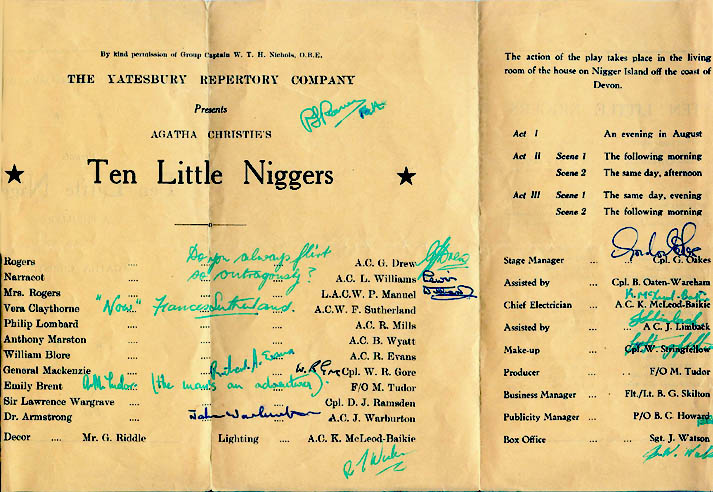
|
|
| AGATHA CHRISTIE QUOTE: "Every murderer is probably somebody's old friend". |
|
| |
|
1951

|
The day after demob on 19th October 1951, I moved back into my digs in Knollys Road and went to see Bill Bruce, the Chief Electrician at the New Theatre who came up trumps as usual. He provided me with some casual work for a few weeks as showman/electrician on a show entitled ‘And So to Bed’, a musical by Vivian Ellis about Samuel Pepys starring Leslie Henson. I then did a very short stint on a play called ‘Heloise’ at The Duke of York’s theatre and then it was back to the New Theatre to work on ‘Columbe’ starring Yvonne Arnaud. After a week Bill said, ‘I’ve got a permanent job for you as second electrical day man at the Wyndhams theatre with my brother John Bruce, who is the Chief Electrician. Among other things, the job will entail being boiler man’.
|
|
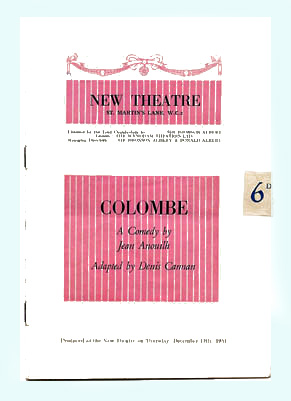
|
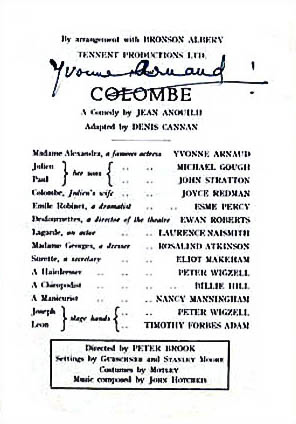
|
JEAN ANOUILH QUOTE: "Every man thinks God is on his side. The rich and powerful know he is".
I was due to start on the morning of Boxing Day. I had celebrated Christmas Day with my dear Aunt Gladys, Uncle Leslie and their family, and I must confess I’d had far too much to drink. The next morning I presented myself to John Bruce at 9 a.m. and was instructed to go to the boiler room, which was down a metal ladder into the bowels of the earth, and light the boiler. The boiler room was a tiny compartment measuring about 6 ft x 6 ft, with a coal chute on one side and the boiler on the other. I had to rake all the ashes and embers out and light it. The confined space was an almost impenetrable fog of ash, and there I was, with the most monumental hangover of all time, in the middle of this swirling, choking mist. I managed to get the boiler lit, then climbed up the metal ladder and staggered out into the fresh air. This, I thought to myself, is another poor start to a new job.
However, there was a rainbow on the horizon. It was Boxing Day and at one o’clock just before the matinee, the first electrical day man went out and got pissed. When he returned to the theatre, John Bruce fired him immediately and promoted me. Four hours into the job and already a promotion!
The show running at the Wyndhams was ‘The Love of Four Colonels’ written by and starring Peter Ustinov. I applied myself industriously to my new position, which among other things meant working the switchboard. Time went by quite reasonably and I was now receiving a liveable wage.
Early on in the run one of the understudies, an actor called William Franklyn, who later on gained a certain amount of fame as the Schweppes advert man, (but of course he did many other things as well), asked me where I was living. I told him I was living in digs out in Streatham which were okay, except that on Saturday nights when we did two shows back to back, I could only get as far on the tube as Stockwell, then had to walk from the Oval to Streatham via Brixton - which wasn’t very good news late on a Saturday night.
Bill asked me if I would like to rent a room in his flat in the Earls Court Road, which he could let me have at two pounds a week. This sounded very good to me, so I went to have a look at it. I discovered he had used the word ‘room’ in its loosest possible sense since the ‘room’, nine feet long by five feet wide, was in the attic with a sloping roof and a fanlight. So of the five feet width, you could only stand upright in about two and a half feet. There was a bed, a very small table, chair and a cupboard where I could hang my clothes.The room was so small;you had to go outside to change your mind.
I often drive past this house when I am coming back from the West End and I always look up, see this fanlight on top of the house and think, that’s where I used to sleep fifty odd years ago. I then start counting my blessings. There was however one major bonus to this room and that was, that if by any chance you happened to invite a young lady of your acquaintance to visit you, there was nowhere for her to sit except on the bed, circumnavigating a great deal of the usual manoeuvrings which go on in trying to persuade ladies to visit your bedroom. Mind you, they had to be pretty keen on you to go into the bloody room in the first place!
Whilst there, Bill who was a very keen member of the Stage Cricket Club asked if I played cricket. I said yes, and he arranged for me to be enrolled in the team where I spent many happy years playing with various theatrical personalities. Our first captain at the time was a loveable actor called Gary Marsh and later on, the captaincy, by Sam Kydd. Dear reader, these people may not be known to you, but they were charming.
After one of the Stage cricket matches I was standing on the platform at Thames Ditton railway station, when I was joined by another member of the team whose name was Tony Huntley-Gordon. I asked Tony what he was up to and he said he was company managing a murder mystery play, didn’t see much hope for it, but thought he might get a few weeks work out of it. ‘What’s it called?’ I asked ‘The Mousetrap’ he replied. It opened on 25th November 1952.
There is a side story to this. When it was presented by Peter Saunders, a film producer, John Woolfe, who subsequently produced many films among them ‘Oliver’, ‘Day of the Jackal’ and ‘The African Queen’, acquired the film rights to ‘The Mousetrap’, with the proviso that he couldn’t make the film until the show finished in the West End. Forty years later, when I was on the board of the First Leisure Company with him, he told me he was still trying to persuade Peter Saunders to let him make the film. But Peter resolutely refused. ‘The Mousetrap’ still hasn’t been produced as a film.
One of the joys of working on the ‘The Love of Four Colonels’ was that Peter Ustinov seemed to quite like me and when he was not on stage, he didn’t bother to go to his dressing room - he just used to sit on a chair at the side. Occasionally he used to beckon me over and we used to chat, and he would tell me various theatrical anecdotes. The most interesting of which was based on the film ‘Quo Vadis?’ in which he just played Nero.
Peter told me that when he went into this major epic, Mervyn LeRoy, the director, wasn’t too sure that being relatively young, how he would cope with playing the part of Nero. Peter pointed out to him that in fact, Nero was a very young man and Peter was actually older than he was, but I guess LeRoy was thinking in terms of experience rather than age.
Peter seeking inspiration on how to play the part asked Mervyn how he saw the character. Mervyn looked nonplussed for a moment and then muttered; 'it was a terrible thing he did to his mother'. Peter nodded in agreement; another pause - Mervyn said, 'I suppose you could see him as a person who played with himself every night'. The meeting ended and Peter departed bearing those rare nuggets of information about the character.
Peter told me that when he played his first scene, he played Nero as he considered, well over the top. LeRoy said to him, ‘Look – Nero is one of the great freaks in history – I want you to go as far over the top as you possibly can. Go bloody bananas’. Peter said he did, and the end result seemed to work out very well.
During one of our chats Peter told me he had purchased an enormous vintage Mercedes Benz. I asked him why he needed such a large car and he replied jokingly, ‘I want to make sure that if I have an accident, I won’t come off second best’.
He would also do impressions for me during his breaks on the side of the stage. It was like having my own private show. He could impersonate anyone - not only people, but he also did the most fantastic impression of the two cheetahs which were in the film with him; they repeatedly tried to mount his legs whilst he was in the middle of some of his scenes. Peter did actually manage to look like a cheetah, on heat.
There was one hilarious moment during the run of Four Colonels, (but not for the people concerned). In all theatres, the iron or safety curtain has to be lowered and raised in full view of the audience. On this occasion the fireman lowered it, and when it was time to raise it, he was slightly distracted and pulled the drencher handle by mistake. The drencher is a pipe full of water attached to the water main, which is situated immediately in front of the top of the safety curtain. In case of fire, this drenches the iron curtain. The water in the drencher is extremely dirty because it sits in the pipe for years. As soon as the fireman pulled the drencher handle, the filthy water hit the safety curtain and bounced out - the first three rows got it. The theatre management had a lot of cleaning bills to settle, apart from anything else.
Whilst working on the switchboard, I supplemented my income during the show by playing poker between cues with the Second day man who’d moved into my position when I was promoted. He made additional money by writing Westerns which he did quite successfully. Since I was a better poker player than him, some of this finished up in my pocket.
The days went by at the Wyndhams and it was enjoyable working with John Bruce. Since the shows on Saturday were twice nightly, it meant that I could go to watch Arsenal on Saturday afternoons when they were playing at home. It was always difficult to get back from the game in time for curtain up, but John always kindly covered for me.
The worst part of working at the Wyndhams was that although I was not the boiler man, I had to keep the coal bunker stocked with coal. The bunker was on one side of the theatre and the coal cellar was on the other. My job was to lift the cover of the coal cellar, take a ladder, climb down into it with a bucket, fill it and then pass it up to John Bruce. (The boiler man was never on duty when this operation was performed). We then transferred the coal into a dustbin and wheeled it around to the other side of the theatre.
The problem was that filling the bucket in the confines of the coal cellar, a great deal of coal dust was disturbed. It was like being in a large coffin surrounded by swirling black clouds of coal dust which got into every conceivable orifice. When I finally surfaced I was as black as the ‘Ace of Spades’ and covered in coal dust from head to foot. There were no such things as baths or showers in the theatre and the only way to get reasonably clean was to use a cold tap at the sink under the stage; but you couldn’t get rid of the coal dust which had got into your lungs.
I felt rather like the man who worked in the circus, whose job was to keep the ring tidy, so twice a day, six times a week, he followed the elephants round, cleaning up mountainous piles of dung. When asked why didn’t he give it up and find something more rewarding he replied, ‘What? – and give up show business?’ It so happened that one of these days coincided with my twenty-first birthday so it wasn’t exactly celebrated in style, although my father had sent me a cheque for twenty-one pounds.
‘The Love of Four Colonels’ eventually finished. I will always remember with affection Peter Ustinov’s kindness to an obscure young electrician.
|
|

|
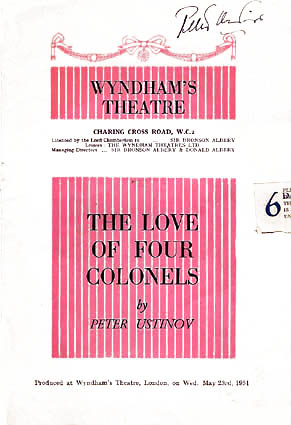
|
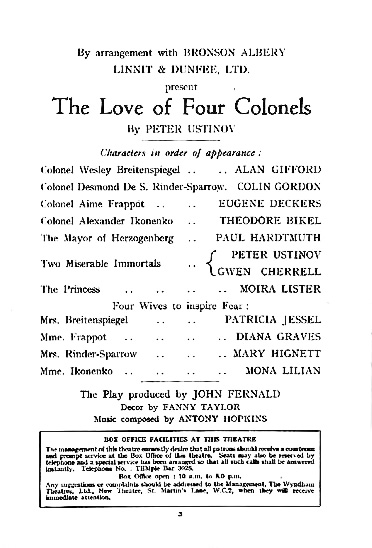
|
PETER USTINOV QUOTE: "I have three daughters and I find as a result I played King Lear almost without rehearsal".
The next play to open at the Wyndhams starring Eric Portman and Dorothy Tutin was titled 'The Living Room', by Grahame Greene. It opened on April 16th. After it had been running for about three months, George Ivor, who had been the company manager of 'The Love of Four Colonels' approached me and knowing that what I really wanted to do was to be a Stage Manager, asked me if I would like to be his Deputy Stage Manager on a play which was about to go into rehearsal called 'The Devil's General', written by Carl Zuckmeyer.
|
|
1953

|
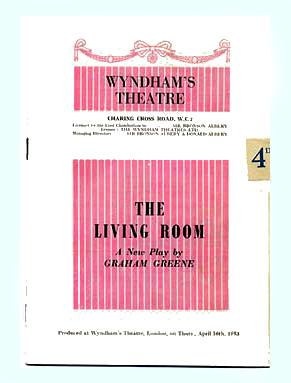
|
| |
ERIC PORTMAN • DOROTHY TUTIN
‘THE LIVING ROOM'
.. |
Mary |
|
Dorothy Dewhurst |
Michael Dennis |
|
John Robinson |
Rose Pemberton |
|
Dorothy Tutin |
Miss Teresa Browne |
|
Mary Jerrold |
Miss Helen Browne |
|
Violet Farebrother |
Father James Browne |
|
Eric Portman |
Mrs Dennis |
|
Valerie Taylor |
| |
|
|
Produced by Peter Glenville |
| |
|
|
|
|
GRAHAM GREENE QUOTE: " They are always saying God loves us. If that's love I'd rather have a bit of kindness".
'The Devil's General' had been a big hit in Germany and was about a dissident Luftwaffe general during World War II. This was to star Trevor Howard and Wilfred Lawson. To say that I jumped at the chance is an understatement.
We opened at the Lyceum theatre, Edinburgh and subsequently toured, prior to opening at the Savoy theatre on 23rd September 1953. Apart from being Deputy Stage Manager, I had to play two small parts, one of which entailed wearing a pair of jackboots which didn’t fit. The sheer agony in the first interval; dashing right up to the top of the theatre to my dressing room, and making a costume change in these wretched boots is indescribable and I couldn’t get a larger pair until we got back to London. It was a very big production with three large sets. George Ivor had enough faith in me to let me get on with organising the fit-ups and lighting on tour, which gave me a great deal of experience.
Trevor Howard was a well-known roisterer, but Wilfred Lawson by comparison, made him look like the Angel Gabriel. Wilfred seemed to be permanently drunk and because of this, from being one of the top stars of the thirties, he was black listed by most managements, following I understand, his tour de force of urinating on stage in full view of the audience. However Bill Linnit who was presenting ‘The Devil’s General’ had great affection for him and decided to give him one last chance.
Wilfred insisted that his contract contained a clause stipulating that he was to be given a bottle of Scotch on the first night. As good as his word, Bill Linnit presented this to him on the first night with a note saying, ‘One tablespoon full to be taken once a night after each performance,’ and signed it, Doctor Linnit.
Each day while we were rehearsing, Wilfred was always missing after lunch and I made it my job to collect him from the pub. He soon cottoned on to this and changed his pub every day, so I spent most of my lunch hours going round the various pubs in Soho trying to track him down.
One day I failed to find him and after lunch I had to stand in and read his part for him. When I was half way through the scene, I looked up and saw Wilfred on the side of the stage with floods of tears running down his face. He said in his particular high-pitched whine, ‘That is the most beautiful performance I have ever seen - I’ll never be missing again’. Of course, he was.
Once when the show was running, I took his pay packet in to him and gave him a pen to sign the receipt. He refused the pen and said, ‘This is blood money - I shall sign in blood’. He took out a penknife, cut his finger and scrawled his signature in blood. While this was going on, his wastebasket, into which he had probably dropped a lighted cigarette into, burst into flames. You or I would have filled a glass with water from the sink. But not Wilfred, who had probably forgotten that water existed, except for washing in. He reached under his dressing room table, removed a bottle from a crate of Guinness which he always kept stored there, opened the top and poured it over the flames.
Around Wilfred and Trevor was cast the biggest bunch of hell raisers that have ever been gathered together in one show. During performances there were card games in the dressing rooms almost non-stop; (they did have to appear on stage as well of course). In one dressing room - a bridge school, in another - a pontoon school, and the third had a poker game. As a side line, one of the actors, Geoffrey Hibbert, had a dispensing bar in his dressing room containing gin, whisky and vodka. This took ten pence pieces which gave you quite a generous measure. He did a roaring trade
Meanwhile I, poor sod, was stuck in the prompt corner running the show and missing all the fun. I must confess however, that I sometimes asked Prue Rennick, my A.S.M, to take the book for ten minutes while I popped up for the odd hand of pontoon. I didn’t miss too much of the action, because it usually continued after the curtain came down, until we were thrown out of the theatre by the resident fireman. Even then, a lot of us used to arrive early in the afternoon the next day to commence our activities. When we were on tour I used to have to call the half-hour in the nearest pub. When we were playing the Kings Theatre Glasgow, there was a pub opposite which had a giant horseshoe bar, and the locals complained they couldn’t get to it because all the company of ‘The Devil’s General’ were in the way.
While we were in Edinburgh, Trevor became a drinking pal of a local eccentric who claimed that he had the head of the Loch Ness monster in a bucket which he carried about with him. Each night he would try and bring this evil-smelling thing in the bucket into the stage door of the theatre, and each night he was turned away. When we moved to the Opera House Manchester, he turned up again outside the stage door with the ‘Thing’. On being refused admittance, he tied it to the top of a lamppost outside the stage door and was never seen again.
Trevor behaved reasonably well most of the time, but then he was onstage all of the time. In Newcastle however, he’d had one or two before the performance, and near the beginning of the play he became over-enthusiastic; he crushed a brandy glass in his hand. The blood started spurting everywhere. I signalled to him from the prompt corner asking if he wanted me to bring the curtain down, but he shook his head. He then proceeded to put his arm round some of the actors and patted others on the back. Then came the entrance of Jane Griffiths, one of the leading ladies, in a beautiful shimmering, white ball gown. He approached her, put his arms round her, gave her a big hug and left two bloody hand prints on her dress. I decided, whether he liked it or not, I was bringing the curtain down. He wasn’t very happy - he thought it was a big joke, a feeling not shared by the wardrobe mistress.
We got a doctor out of the audience who gave him three stitches whilst we continued to clear up all the blood. Our Company Manager, George Ivor, who was in his dressing room while all this was happening, became aware that I had brought the curtain down. George was the most laid-back man I have ever met in my life. No matter what happened, he always used to say, ‘Not to worry - everything will be alright tomorrow’. He arrived on the side of the stage, surveyed the carnage and still came up with his stock comment.
I did however make him crack on one occasion. Late on in the run at the Savoy Theatre, Trevor arrived at the theatre having had a skinful. We gave him several cups of black coffee and poured him onto the stage He got through Act I and II reasonably well, but I think he was supplementing the coffee with a drop of the hard stuff, and by the time we got to Act III he was legless and couldn’t remember a line. I was prompting him from the prompt corner, the fireplace, the door and the opposite prompt side. In the middle of this hysteria I felt a tap on my shoulder. It was Wilfred, pissed as a newt, saying, ‘It’s a disgrace. That man is drunk. He shouldn’t be allowed on the stage’. George hearing over the speaker that the show was disintegrating, came haring down to the prompt corner white faced and shaking, demanding to know what the hell was going on. By that time being beyond caring, I said, ‘Not to worry George - everything will be all right tomorrow’.
All things, be they good or bad come to an end, and ‘The Devils General’ closed after about three months.
Dear reader, I hope you will forgive me for telling the following hoary old apocryphal story, which most of you know anyway; but since it has been subscribed to Wilfred Lawson, as well as a dozen other actors who enjoy a drink, I'll tell it anyway. Wilfred was on a third-rate tour of 'Richard III' and prior to a matinee performance, he and one of his fellow actors decided to visit the local pub where they had one or two too many.
The curtain rose on the matinee and Wilfred lurched forward to deliver his opening speech:
Now is the winter of our discontent
Made glorious summer by this sun of York;
And all the clouds that lour'd upon our house
In the deep bosom of the ocean buried.
As he blundered his way through the following thirty or so lines, he started fluffing, paraphrasing and becoming inarticulate. Having put up with this for a minute or two, a voice from the front cried out: "Get off - you're pissed". Wilfred lurched even closer to the floats, shielded his eyes and directed a baleful glare to the gallery. "Pissed - you think I'm pissed? Wait until you see the Duke of Buckingham!"
|
|
|
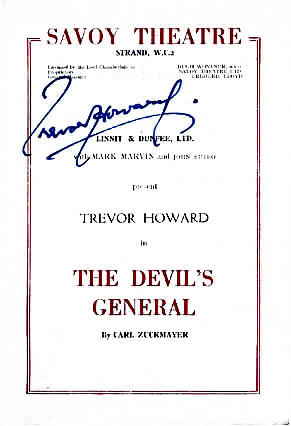
|
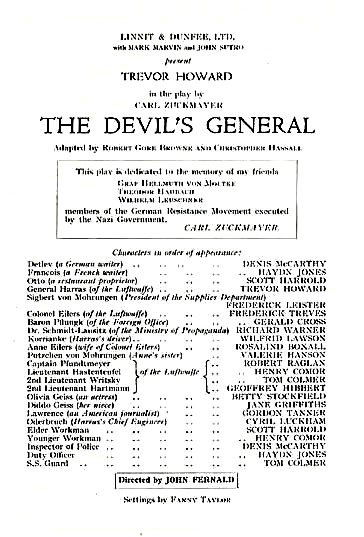 |
TREVOR HOWARD QUOTE: "I've been number two in films for donkey's years.
|
|
|
After the closure of 'The Devil's General', I was fortunate enough, thanks once again to George Ivor, to start rehearsing almost immediately with another show, 'I Capture the Castle', a romantic comedy by Dodie Smith, based on her best selling novel of the same name.
Dodie was one of the most successful novelists and playwrights of the time, having written several acclaimed works including the play 'Autumn Crocus', which was booed by the gallery on the first night at the Lyric Theatre in 1931; but the next day, received rave reviews in all the papers and went on to become an enormous success.
Dodie was a shop assistant at Heals when she wrote the play, but she stayed on for several months before deciding her career was in writing. Her next play was called 'Service', which was about a shop based on Heals, and was also a success. Her career continued to be glittering for the next twenty years, turning out success after success, including 'Call it a Day', 'Bonnet over the Windmill’ and 'Dear Octopus'. In view of her track record, I anticipated that the play would be a success and help pay the rent for at least a few months.
All the earmarks were good. The cast included Richard Greene, later to become the hero of the long running series, 'Robin Hood'; the new up and coming star Virginia McKenna, Bill Travers and a very handsome young juvenile, Roger Moore. After a short tour we were due to open at the Aldwych Theatre. Seat prices ranged from twenty pence in the balcony to seventy-five pence in the stalls.
My duties as stage manager consisted among other many things of sitting on the script, or book as it is known, prompting the actors if they dried, (forgot their lines), logging all the actors' movements on stage, for future reference - i.e. Virginia x.d.s.l (cross downstage left), Virginia m.u.s.c. (move upstage centre) etc etc, and noting and recording any script alterations and re-writes.
Dodie Smith's power and authority became apparent on the first day of rehearsal. Whilst the director, Murray Macdonald sat in the stalls directing, Dodie Smith insisted on sitting alongside me at the stage management table, instructing me to note every miniscule deviation from the script, (even as small as an, if, and, or but). At the end of each scene she would ask me to give the corrections to the cast and the director. Everyone sat up and took notice, such was her power.
I must have pleased her, because several times she and her husband Alec, (who was at rehearsals every day dancing attendance on her), took me out to lunch which was not viewed very well by the director and cast. On one occasion I suffered acute food poisoning from mussels she bought me. I managed to carry on with my duties in a fashion and Dodie was most attentive; but this above all things will remind me of Dodie. I have never since, from that day to this, eaten another mussel.
After a short tour, Murray Macdonald our director and one of our producers became concerned that the play wasn't working out as well as they had hoped, and at the instigation of Dodie, called upon one of the top directors of the day, Tyrone Guthrie, who was a friend of Murray’s, to help out. Tyrone came down to Southsea where we were playing the King’s theatre for a week like an impressive whirlwind, and tried to alter the entire play in two days; but alas, without success.
Just prior to the opening of the play in the West End at the Aldwych, in spite of an avid courtship by Bill Travers on the tour, Virginia McKenna married Denholm Elliott, to whom she had been engaged for several months. There was obviously something dreadfully wrong because she left him after a short time, and six months later married Bill Travers, with whom she had a loving and enduring marriage.
Roger Moore had to leave after a few weeks in the West End to fulfill a Hollywood commitment. Dodie Smith asked me if I would like to audition as a possible takeover. I said I really didn't think I was up to it. My feeling then, and for the rest of my stage career was, that while all actors when they walk on stage are silently willing the audience 'Look at me - look at me'; when I was on-stage I was always thinking, 'Don't look at me - don't look at me'. The play didn’t work and expired after a few weeks: Dodie's first failure. But she went on later to write her greatest success, 'One Hundred and One Dalmatians'.
Whilst the show was running, an actor called Roger Kimber who was understudying Bill Travers and Richard Greene, asked me if I would like to share a flat with him and a musician called Neil Hobson. I was anxious to get out of my attic at Bill Franklyn’s, so I readily agreed. The flat was in a rather decrepit block above a club called The Wishing Well at 7 ½ Thayer Street, Marylebone. It was up a rickety flight of stairs and had a sitting room, two bedrooms, a kitchen and bathroom. I slept in one bedroom, Roger in another and Neil in the sitting room. When the show closed all three of us were out of work, and it was back to hard times. Roger was lucky enough to receive a small allowance from his parents in South Africa which just about kept him afloat. |
|

|
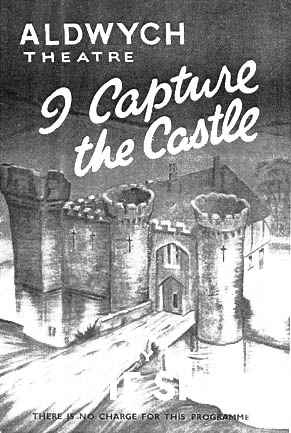
|
| |
‘I CAPTURE THE CASTLE '
In Order of Appearance:
...
|
Cassandra Mortmain |
|
Virginia McKenna |
Rose Mortmain |
|
Yvonne Furneaux |
Topaz Mortmain |
|
Goergina Cookson |
Thomas Mortmain |
|
Andrew Ray |
Stephen Colly |
|
Roger Moore |
James Mortmain |
|
George Relph |
Miss Marcy |
|
Joan White |
Simon Cotton |
|
Richard Greene |
Neil Cotton |
|
Bill Travers |
The Vicar |
|
Cyril Luckham |
|
|
Vivian Pickles |
Mrs Cotton |
|
Joan Henley |
Leda Fox-Cotton |
|
Elizabeth Ashley |
Aubrey Fox-Cotton |
|
Victor Lucas
|
Directed by Murray Macdonald
|
|
DODIE SMITH QUOTE: "The family, that dear octopus from whose tentacles we never quite escape, nor in our innermost hearts never quite wish to".
I was fortunate enough to obtain a job as showman/electrician at the Criterion theatre with a revue called ‘Intimacy at 8.30’. It starred among others: Ron Moody, Joan Heal, Joan Sims and Dilys Laye.
The cast were all extremely friendly to me, probably because it was such an intimate show in a tiny theatre, and I was the only stagehand. Michael Charnley, the director and choreographer, was holding ballet classes for the company and Dilys Laye asked if I’d like to attend. I was very excited at the prospect and said yes.
The Criterion is buried in the bowels of the earth in Piccadilly Circus and there are approximately eighty stairs from the stage door down to the stage. At the end of the first gruelling lesson with Michael Charnley, my untrained legs were so stiff it took me half an hour to climb the stairs, but I persevered and had several lessons which were great fun. Michael Charnley was asked by someone what a stagehand was doing in his class which was for the performers. Michael Charnley replied, ‘Because he has marvellous elevation’. When his friend laughed, Michael realising the double entendre hurriedly said, ‘No, I mean he goes up a long way’. More laughter - more confusion - rapid retreat of red-faced Michael Charnley. Nureyev must have realised what I was up to because he delayed his defection for a few more years. One of the understudies named Doreen became my girlfriend.
|
|
|
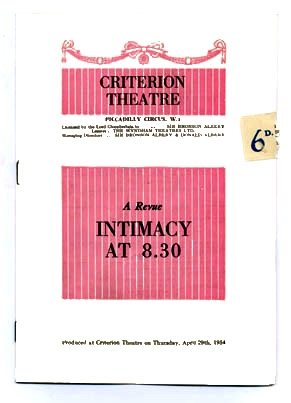
|
| |
‘INTIMACY AT 8.30'
...
|
Joan Heal |
Joan Sims |
Aud Johansen |
Dilys LayE |
ELEANOR FAZAN |
Ronnie Stevens |
geoffrey HibBERT |
Digby Woolfe |
Ron Moody |
Peter Felgate |
David Butler |
| |
Produced by Michael Charnley |
| |
|
RON MOODY QUOTE: "Working on a film, you don't get time to develop rivalries, but the theatre is like a little village, and the differences between me, Lionel and Georgia grew" - talking of Lionel Bart and Georgia Brown during the run of 'Oliver'.
I was still financially very much in trouble, receiving only a stagehand’s wage when salvation hove into sight. I was having a drink in ‘The Salisbury’, a well-known pub frequented by actors in St. Martins Lane, when I got into conversation with a Company Manager called Pat Farrell, who was about to start working on a play called ‘No Escape’. He asked me if I’d like to understudy the juvenile and act as Assistant Stage Manager. As I was broke at the time, I leapt at the chance.
The play starred Flora Robson and featured Miriam Karlin. Two more diverse personalities it would be hard to find. Flora was dignified, polite and a trifle withdrawn; a nice person, a brilliant actress - but not Marilyn Monroe. Miriam was loud and out-going, a lot of fun and sexy - also a fine actress. They didn’t get on together. It was at last a production where I managed to spend a little time in bed with someone of the opposite sex. No, I’m not talking about Dame Flora.
The part I was to understudy was played by a friend, Francis Matthews, whose career has subsequently spanned over fifty years, playing everything from a starring role as an Indian opposite Ava Gardner in ‘Bhowni Junction’, to Professor Higgins in ‘My Fair Lady’. He is probably best known for the television series, ‘Paul Temple’. One of the dates we played was the Opera House, Manchester. I had been rather lazy and hadn’t bothered to fix up any digs thinking it would be easy enough when we arrived. There was always the famous Ackers Street where virtually every house took in ‘pros’.
Theatrical digs came in various categories, almost if you like similar to hotels. Mrs McKay, the most famous landlady in the country, at 9-11 Daisy Avenue, Plymouth Grove Manchester, was the 5 Star ‘Savoy’ of digs where a lot of the stars stayed in preference to hotels - Flora Robson being one. Mrs McKay was strictly averse to any nocturnal activities in her bedrooms. She slept next to the stairs and if she heard the sound of two sets of footsteps coming up the stairs, she was out of her room in a flash to confront the couple. It is said that Eric Morecambe being aware of this, carried someone up the stairs on his back.
Right down at the other end of the scale, you could have a flea ridden bedroom in ‘The Gorbals’, where you could be eaten alive by bed bugs - it happened to me. The more experienced of touring people used to carry a travelling iron, and when they were shown to their bedroom, whilst the landlady left them for a moment, they would plug it in, turn the sheets back and run it over the bed. If there was any wild life there, it would appear and they would then rapidly depart. But to be fair, the majority of digs were well run and comfortable, as well as being reasonably priced. I suppose they had to be, because there was a lot of competition.
Many of the landladies could be quite particular in who they accommodated. They would get advance bills of the shows which were appearing in the town, and when they were approached by the artists looking for accommodation, they would check to see whether you were variety or legit, legit taking preference. They would then inspect the bill matter and obviously, the better your billing, the more chance you stood. This didn’t follow religiously, because on occasions, even I got into Mrs McKay’s Savoy. I believe also that the landladies used to tip the stage door keepers if they recommended an artist to them.
They were a very mixed bunch; most of them had a guest book which they kept and asked visitors to make comments in the book. There were various codes which could be used. ‘LDVG’ was one. When the landlady asked what it meant, she was told, ‘Landladies’ Dinners Very Good’. What it really meant was, ‘Landlady’s Daughter Very Good’. There was another frequent entry in some of the ‘bad digs’ books from Edgar Allan Poe’s poem: ‘quoth the raven’. For those who don’t know, the next word in the poem is ‘nevermore’.
There is a story which Harry Secombe tells. One morning he awoke at 6 a.m. and feeling a bit peckish, wandered down into the landlady’s kitchen where he saw her spread eagled on the kitchen table, with the milkman on top of her. She looked over the milkman’s shoulder, saw Harry and said, ‘Oh Mr Secombe, you must think I’m a terrible flirt’. Anyway, God bless them all. They provided us with shelter, food, even warmth sometimes. We certainly couldn’t have done without them.
Back to my arrival in Manchester. The train pulled in on a typical cold, wet, dark Manchester Sunday afternoon. I didn’t feel too enthused about trudging up Ackers Street looking for digs. Francis said that he had some good ones and was sure there would be room for me there too. I got a lecture from him about always booking digs in advance.
We arrived at his abode and the friendly landlady ushered us in to the warm and cosy front room where there was a roaring fire in the grate. She told Francis how nice it was to see him and that she had a hot meal ready to serve him. She was most apologetic to me and said she hadn’t any room but there was a commercial hotel a few hundred yards away that might be able to put me up; she served Francis his hot meal as I prepared to leave. As I walked down the dark path carrying my heavy suitcase in the cold rain, I looked back and saw Francis in the cosy room, sitting down to eat his hot meal in front of the fire. He waved a cheery farewell to me with two fingers extended and I proceeded on my way.
The commercial hotel was a grey sombre building, looking about as welcoming as Count Dracula’s Castle. I booked in, was shown to my poky bedroom with an iron bedstead and was informed the next meal that would be served was breakfast. I was also told that there was a sitting room downstairs which I could make my self comfortable in. Comfortable? It was a large cold room with linoleum on the floor, a couple of leather armchairs with the stuffing coming out, some bentwood chairs, and a table littered with some dog-eared prehistoric magazines that looked as if they’d been thrown out of a dentist’s waiting room. I picked up one of the magazines, moved some of the horsehair to one side and settled into an armchair.
I was idly flicking through, (I think the stop press contained the details of the latest Jack the Ripper murder), thinking what a bitch life was, when the door opened and in walked a young, tall and extremely attractive young lady followed by another and another and another - until I was surrounded by ten of the gorgeous creatures. Playing at the opposition theatre, The Palace, was ‘The Folies Bergère’ presented by Bernard Delfont, (this was the first of many times I had reason to be grateful to Bernie although he didn’t know at the time), and staying with me in the hotel were ten showgirls! They were just as bored as I was and in racing parlance ‘doubles and trebles’ were not out of the question.
When I staggered into the theatre the next day I received a cheery greeting from Francis asking me how the hotel was. ‘It’s a bit overcrowded’ I said, mentioning the ten showgirls. His face turned green with envy and he asked if I would be kind enough to ask him over. I said, ‘I’d like to, but I wouldn’t want you to miss your nice hot suppers - besides there aren’t enough girls to go round’, and returned the cheery two fingered wave he had given me the previous evening.
As the week wore on I arrived at the theatre looking worse and worse each day. On the Friday there was a trade show of a new film ‘On the Waterfront’ and as usual, the cinema invited the casts from various theatres to attend. It really upset Flora Robson who was sitting in the middle of the ‘No Escape’ cast when she turned round and saw me sitting in the middle of about sixteen girls in a different part of the theatre. ‘Why isn’t Richard sitting here where he belongs?’ she asked. No-one had the courage to tell her. What a way to spend a week in Manchester! I can’t think of a better one.
One of the dates we played on tour was the Olympia Theatre, Dublin and because of transportation difficulties we could only take the costumes and certain vital hand props. The theatre said, ‘no problem’; they would build the set and provide all the furnishings. When we arrived at the theatre on the Sunday evening they were still painting the set and there wasn’t a stick of furniture anywhere. I was told, ‘Don’t worry, be here at 9.00 am in the morning. A lorry will be waiting for you; the driver will take you round all the shops in Dublin and whatever you want. Just go in and ask for it; tell them you want it for the theatre and they will lend it to you without charge’.
This turned out to be true – no matter what we asked for, we got it. We went to some auction rooms for the furniture; what I picked out was due to be auctioned that week, but the auctioneer simply withdrew it until the following week. All the Dublin people I met turned out to be the most charming and generous I have ever come across. The other great thing about Dublin was that the pubs were open all day; the cigarettes were cheap and there were betting shops long before they became legal in England. Miriam and I spent a blissful week non-stop in either the pubs or the betting shops.
Francis was obsessed with the fact that he was too thin and he wanted to build his body up, so each day he would drink two pints of milk and eat a very large bar of chocolate. On the last week of the tour in Plymouth, I was in digs with him and he started complaining that he was losing his appetite and wasn’t feeling very well. This was the worst news I could imagine. I had thought he would never be off, so had never completely learnt the part. I was panic stricken.
Each day he would complain, and each day I would urge him to go on, telling him that there was nothing wrong with him; he was just eating too much chocolate and drinking too much milk; that was the reason he had no appetite. This went on all week with Francis soldiering on. The show closed on Saturday. He went to see his doctor on the Monday and I received a phone call from him later that day. ‘Thanks a lot,’ he said. ‘The doctor has told me I am just recovering from an attack of yellow jaundice’.
I finished that tour without a penny in my pocket. During the last week in Plymouth, I lost all my money in a poker game with Stubby Kaye who was appearing in ‘Guys and Dolls’ at the opposition theatre. Miriam, bless her, lent me the money to get out of town. |
|
|
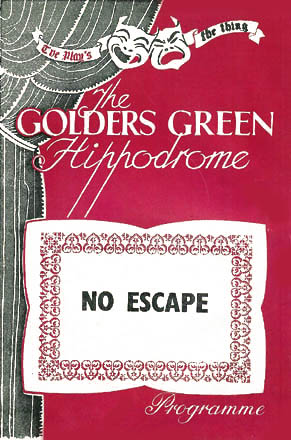 |
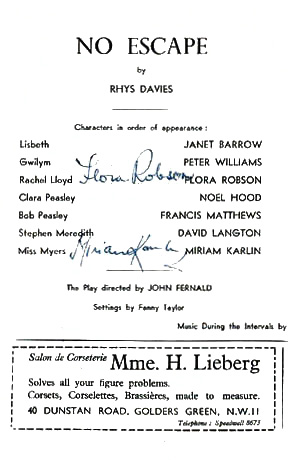
|
FLORA ROBSON QUOTE: "Ask God's blessing on your work, but don't ask him to do it for you.”
Next door to us in Thayer Street lived a hard up American commercial artist called Gabe Katz. His only source of income was designing covers for paperbacks, but he made enough money to get by. We became very friendly and occasionally he would share a meal with me. He was so generous that he even offered to share his girlfriend. His hobby was arranging orgies to which he invited me. I wasn’t, if you will pardon the expression ‘into it’ too much, since I always finished up trying to get one of the girls away on her own. Anyway, I met a lot of varied and interesting people and one of them was a young seventeen year old model who went on to have a very good career in films. I was rather keen on her, but she wasn’t that keen on me.
Later on, Gabe started to exclude me from his ‘get togethers’, and I remember on one occasion hearing the sounds of revelry coming from his apartment so I knocked on his door and was greeted by Gabe who said, ‘You can’t come in - this is a private gang bang’. I thought his words were a trifle irrelevant since if it had been public he would have had a queue round the block.
However Gabe was helpful in getting me some meals. He introduced me to a fairly well off forty year old Welsh nymphomaniac. She took me out to dinner a few times and to the odd film, one of which was ‘Seven Brides for Seven Brothers’, but she would insist of feeding me pills. I don’t know what they were, but she assured me it was only to increase my virility. She eventually went back to Wales and we lost touch.
There were one or two other young ladies; one worked as a photographer in a night club and lived on a barge on the Chelsea Embankment. Dear reader, I don’t know if you’ve ever slept on a tiny bunk in an old barge but I can assure you, it’s very uncomfortable.
Gabe also introduced me to a young Eurasian man called Jack Soo, who was appearing in the chorus of ‘South Pacific’ at the Theatre Royal, Drury lane. In conversation with Jack, he waxed lyrical about his friend who was also in the chorus, and kept telling me how marvellous he was. He even insisted on showing me a photograph of the two of them together. The man towered over Jack and was quite good looking in a rugged sort of way, but I couldn't understand why Jack was so taken with the man’s charisma. It transpired he was talking about Sean Connery. This was Sean’s first job in the theatre; he was acting as a lifeguard at an Edinburgh swimming pool when he heard they were auditioning for tough, rough performers to play marines in ‘South Pacific’ – no previous experience required. He came down, auditioned, got the part, and the rest is history.
I had to find a job of some sort in order to pay the rent and eat. I managed to get employment at a Cadbury’s chocolate dispatch warehouse just behind West Hampstead tube station. It was basically sorting out orders of chocolates etc., ready for dispatch to the small shops which had ordered supplies. Anything which was damaged, wrapper torn etc., was never dispatched. It was quite extraordinary that a large number of bars of chocolate happened to fall off the shelves and bounce into our pockets. In spite of the pittance of the salary we received, we were very short of food apart from chocolate, and I can remember on one occasion thinking on my way home to the flat - the cupboard is virtually bare, but there is half a tin of Heinz baked beans, so I was quite looking forward to a mini feast.
When I arrived back at the flat, I found Roger and Sandy, a young lady he had taken up with, sitting at the table by candlelight, eating baked beans on toast. That was my dinner out of the window. I was so upset by this that I went for the 6 ft. 4inches Roger, and only Sandy stopped us having a fist fight, although he did pick up a very heavy armchair at one stage and threatened to hit me over the head with it. Can you imagine picking a fight with somebody 6 feet 4 inches tall over half a tin of baked beans?
Sandy was an out-of-work actress and they made rather a strange couple since she was about 4 feet 10 inches tall – 1 foot 6 inches shorter than Roger, but they were very much in love and eventually got married, raised a family and I’m happy to say, they are still together today after fifty years.
I was desperately trying to escape from the job in the chocolate warehouse, when the opportunity presented itself to me to work as a stagehand on ‘Peter Pan’ at The Scala theatre for its annual Christmas season. Barbara Kelly played Peter and Richard Wordsworth doubled Mr Darling and Hook. There was a very pretty girl in the show called Pixie Murphy, and I desperately tried to get a date with her by asking her out for a drink, but each time she countered, by saying she’d love to, but she had to take home her young brother who was playing Nibs.
Wind the clock forward fifty years and I’m playing golf with a friend who I proposed for membership at the Stage Golfing Society. He had just retired from business having been the Managing Director of Curtis Brown, one of the top literary and theatrical agents in the country. He thanked me for proposing him for the club, and said, ‘This is the second time I’ve caused you a small amount of inconvenience. The first time was fifty years ago when you were trying to date my sister Pixie, and I was the little boy, Peter Murphy, who she had to take home after the show every evening’.
|
|
|
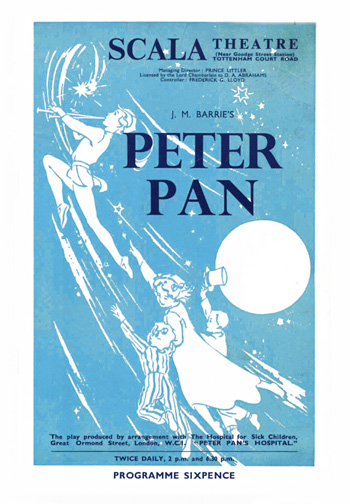 |
| |
‘PETER PAN '
.....
|
Peter Pan |
|
Barbara Kelly |
Mr Darling |
|
Richard Wordsworth |
Mrs Darling |
|
Patricia Marmont |
Wendy Moira Angela Darling |
|
Dorothy Bromiley |
John Napoleon Darling |
|
Julian Yardley |
Michael Nicholas Darling |
|
Colin Gibson |
Nana |
|
Eric Carr |
Liza
Baby Mermaid |
|
Wendy Perschky |
Tinker Bell |
|
Jane Wren |
Tootles |
|
Nicky Ednett |
Nibs |
|
Peter Murphy |
Slightly |
|
William Ingram |
Curly |
|
Robin Willett |
1st Twin |
|
Richard Peters |
2nd Twin |
|
Anthony Lang |
James Hook |
|
Richard Wordsworth |
Smee |
|
Russell Thorndike |
Gentleman Starkey |
|
Peter Collingwood |
Cookson |
|
Gilbert Bailey |
Cecco |
|
Joseph Chelton |
Mullins |
|
Ronald Vowles |
Jukes |
|
George D'Arcy |
Noodler |
|
Ken James |
Skylights |
|
Robert Lowe |
Cabin Boy |
|
Peter Lindsay |
Black Pirate |
|
Ayton Medas |
Great Big Little Panther |
|
Brian Panter |
Tiger Lily |
|
Karen Glazer |
Mermaid |
|
Desne Kniveton |
Badger |
|
Richard Ives |
Crocodile |
|
Bruce Heighley |
| |
|
|
Produced by John Fernald |
| |
|
|
|
|
| BARBARA KELLY QUOTE: "I tried to stop smoking cigarettes by telling myself I just didn't want to smoke, but I didn't believe myself". |
|
1955
|
Once ‘Peter Pan’ finished - no work, so I got a job as a night porter at the Dominion Hotel at Lancaster Gate. Plenty of food, but not much money. After only three weeks of this – Eureka! Another job offer. Pat Farrell had come up trumps again and asked me to be his Deputy Stage Manager on a play called ‘Misery Me’, written by Dennis Cannen, directed by Alastair Sim and starring George Cole and Yvonne Mitchell. George’s wife was also in the cast, a beautiful actress called Eileen Moore.
Although I got on very well with him, Alastair could be very hard on the actors. One actor called Colin Gordon came in for the brunt of his ire. I am not sure if Alastair was trying to create a carbon copy of how he himself would have played the role, but he nagged Colin incessantly. This went on for weeks even after we had opened, and then one day, Alastair said to Colin, ‘tonight you got it right - it’s absolutely perfect’. Colin replied, ‘Oh thank you very much Alastair, I’ll go away and think about it,’ to which Alastair replied, ‘Please don’t do that Colin - you’re not capable of it’.
The run was relatively uneventful. We toured for a short time and then we came into the Duchess theatre. The play was not successful and we only ran for a few weeks.
During the run, Eileen, George’s wife, approached me and asked if I would like to move into their flat in West Hampstead, since they were moving to a house which George had built at Nettlebed. They wanted to retain the flat for the odd stay in London and needed someone to keep an eye on it.
George who had been adopted at the age of fifteen days by a Mr and Mrs Cole, became a child actor and appeared in 1941 in a play entitled 'Cottage to Let', which starred Alastair Sim. Alastair and his wife, Naomi, became very attached to George and Alastair became his mentor.
Apparently, George, when he was a boy living at Nettlebed with Alastair and his wife, used to go and lie in the warm sunshine on top of a nearby hill and daydream that when he grew up, he was going to build a house on that hill and live there - and that’s what he did.
I was very happy to leave 7½ Thayer Street as it was almost uninhabitable. Water was running down the wall of my bedroom and the landlord didn’t want to do anything about it. George and Eileen’s flat was in a mansion block in West End Lane, and by coincidence, only about 200 yards from where Yvonne Marsh used to live with her family. I settled in, but had no job. George quite happily let me owe him the rent for a long time and Eileen, noting that I didn’t have much food whenever she and George came up to London, would deliberately over-stock the fridge and when it was time to leave would say, ‘Oh Dickie, there’s all that spare food in the fridge. Shall I throw it away or would you like it?’ Bless her.
|
|
|
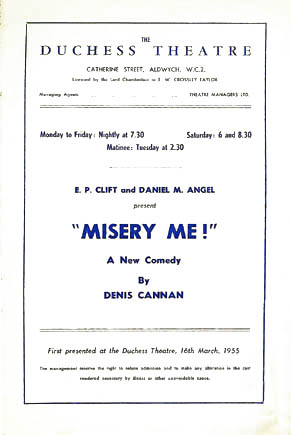
|
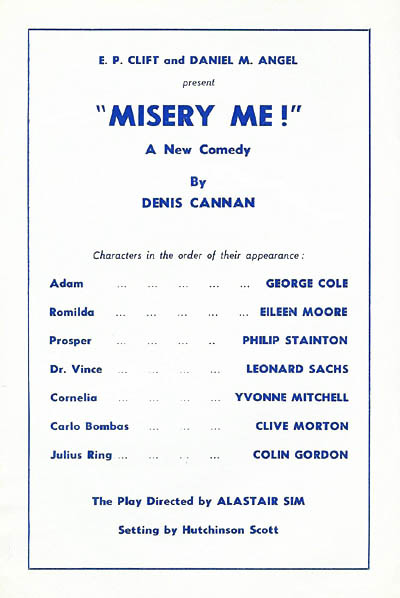
|
ALASTAIR SIM QUOTE: "It was revealed to me many years ago with conclusive certainty that I was a fool and that I had always been a fool. Since then I have been as happy as any man has a right to be".
Out of work after the closure of 'Misery Me', I saw there was a Folies Bergere show presented by Bernard Delfont at the Prince of Wales theatre, so I went along to the stage door and asked if they needed a show man/electrician. George Turner, the Chief Electrician, gave me a job on the O.P. side of the stage, plugging, unplugging and resetting spotlights for the various scenes. The show starred Benny Hill, Tommy Cooper and multitudes of dancers and showgirls. It was a very heavy show and every spare inch of back stage was fully utilized. There were many stage hands to sort out the various scene settings, and the ones on the prompt side didn’t necessarily know the stage hands on the O.P. side.
There were various tableaux scenes in the revue where exceedingly scantily clad showgirls had to pose on various pieces of scenery; columns, rocks, trees etc., and in order to reach their required positions, they had to clamber up step ladders from offstage. Being a perfect gentleman, I offered to hold the ladders whilst the girls climbed up. After a couple of days of this, one of the stage hands from the prompt side wandered over and said, ‘You’re a new boy, aren’t you?’ I said, ‘Yes, well, as a matter of fact I am - how did you know?’ He replied that the new boys always hold the step ladders for the showgirls.
One of the artists appearing in the show was a very tall beautiful blonde speciality dancer who’d been brought over from Las Vegas. Her name was Ilona. Prior to working in Las Vegas, she came from Germany, where she was born. She told me stories about the hardships her family suffered towards the end of the war, and after when there was virtually no food, they had to go out in the country at night to dig up turnips with their bare hands, just to give themselves something to eat, hoping they wouldn’t be caught. She subsequently married an American serviceman and moved to Las Vegas, where she learned how to dance and worked out this rather striking speciality act. She was by now divorced from the American and on her own.
She took a shine to me; we became an item and I spent most of the time staying at her flat in a mews just near Harrods. She had some records she had brought over from America and played one of them to me. It was the voice of someone she described as a fairly new entertainer who she had worked with in Las Vegas. On the record he did about twenty different impressions of various well-known personalities, whilst singing the same song. I’d never heard of him at the time, his name was Sammy Davis Jnr. So, if you like, that was my first introduction to him. In the meantime, George Turner, the chief electrician, offered me a permanent job as sound engineer. I thanked him, but said I wanted to be a Stage Manager. Little did I dream that ten years later I would be running the theatre.
After a while Ilona got bored with me and found somebody else.
|
|

|
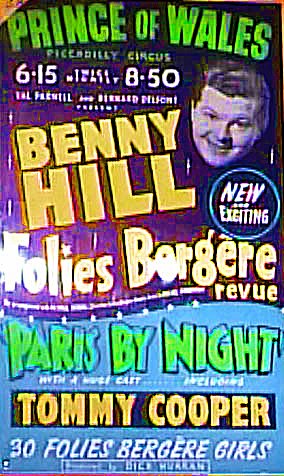
|
| |
‘PARIS BY NIGHT '
...
|
Benny Hill |
Tommy Cooper |
Jeremy Hawk |
Claudine Cereda |
Marqueez |
Ilona Adams |
Vicki and Fredi |
Trio Morlidor |
Ganjou Brothers and Juanita |
| |
Produced by Dick Hurran |
| |
|
BENNY HILL QUOTE: "I'm not against half naked girls - not as often as I'd like to be".
TOMMY COOPER QUOTE: "A woman tells her doctor, 'I've got a bad back.' The doctor says, 'It's old age.' The woman says, 'I want a second opinion.' The doctor says: 'Okay - you're ugly as well."
I was heartbroken, but it was a consolation when I was offered a job as Deputy Stage Manager on a show called ‘Three Times a Day’, written by Vernon Sylvane, starring Ralph Lynn and Robertson Hare. These were probably two of the greatest farce actors in the world during the 20s and 30s, and had appeared in many successes at the Aldwych theatre. They were by this time getting on a bit, and it looked as if it might be their last appearance on stage. Also in the cast, understudying them was another legend from the 20s and 30s called Douglas Byng, who had fallen upon hard times and therefore was reduced to understudying.
The show opened at the Grand Theatre, Leeds. Ralph Lynn had confided in me earlier that there was only one way to play farce, and that was to stand downstage centre with both your feet pointing towards the audience, then, just turn the upper body from side to side to converse with the other actors. I’m not sure that this was the best method, but he seemed to have used it very successfully for thirty years.
We arrived at the first night, and to say that Ralph Lynn was not prepared would be an understatement. I doubt if he knew fifty per cent of his lines. I was in the prompt corner on the book, giving him prompts every thirty seconds. Sometimes he could hear me and when he couldn’t, he would wander over to the prompt corner and say’, 'what’s the line?’ and then wander back to resume his position centre stage. I was getting quite hysterical, and I don’t mean funny hysterical, at the number of lines I was having to feed him. My voice was getting louder and louder, until towards the end of the play I was practically screaming the lines. When the curtain fell, he came and thanked me for all my hard work. The next day in the local paper, the notice for the play gave me a mention all to myself. The critic said that the Stage Manager was in very fine voice and we heard a lot more from him than we did from some other members of the cast!
It was at this time I decided to drop ‘Junior’ which followed my name in the programmes. This was to differentiate me and my father, who was also named Richard. My billing thereafter was Richard M. Mills.
In the cast of ‘Three Times a Day’ were two attractive young ladies; one was called Jessica, and she was rather off-hand with me. I wasn’t sure why; perhaps it was because I was too officious as Deputy Stage Manager, or perhaps, because I was too busy telling them about my lost love from the Folies, Ilona. On the second week of the tour, Jessica and another young lady in the cast finished up in the same digs as me. One night when we were having supper, I indulged in the usual badinage to which inexperienced young men are prone, implying - wouldn’t it be lovely if we could all share a bed together. Jessica replied, ‘Don’t be silly, you couldn’t even handle one girl, let alone two’, which was a bit of a put down.
Later that night when I was in bed, suddenly the door opened and in came Jessica with the other girl, and they both climbed into bed with me. The girl asked Jessica, ‘Are you sure we should be doing this?’ and Jessica said, ‘Don’t be silly darling, let’s teach him a lesson. I know men - he’ll be too frightened to do anything’. With that, I made a grab for the other girl who became extremely nervous. We spent the next half an hour with me trying to force my attentions on her, while Jessica had a stranglehold around my neck, pulling me off. The girls then retreated in disarray.
The next day Jessica continued to show her dislike of me and this went on for another week or two until we were in Liverpool. The weather was beautiful and most of the company went to a beach for part of the day. Whilst we were sunbathing, I asked Jessica if she would rub some sun tan oil on my back. She did, and it sparked off a beautiful friendship. She was dark haired, petite, had a great figure, a wonderful sense of humour and a heart of gold, and would take the mickey out of me unmercifully. She was a great comedienne, and had done various jobs in show business. One of them was when she and a female friend of hers were out of work, to earn some money they rode elephants in the Bertram Mills Circus. The name of her friend was Rachael Roberts.
‘Three Times a Day’ wasn’t working. In fact it wasn’t working to such an extent that on one matinee in Sheffield, there were about ten people in the audience and the box office receipts were about £3.16s. We had a hurried meeting on stage before the curtain went up. Ralph was in favour of not performing and giving the audience their money back. Bunny Hare, on the other hand, said the audience had taken the trouble to get there, so we should at least keep faith and give them a show. It was put to a vote and the company decided to perform; we didn’t get a lot of laughs that afternoon.
It was decided to close the show - have Vernon Sylvane re-write it and open it again later on in the year. Here I was, out of work again, but dear Jessica used to come round to the flat bearing food and cooking me meals. This lasted for about four weeks and then Pat Farrell produced yet another job for me.
He asked me if I would like to be Stage Manager of a show called ‘The Sun of York’ which was to open at the Royal Court theatre. It was a show which received the backing of the Fellowship of the White Boar, which sought to clear the name of Richard III and show him in what they considered was his true light of being a great king; one of their arguments being, that the politics of Shakespeare’s day was such that the bard had to portray him as an evil man. We didn’t have a Company Manager to take care of the salaries etc., so I was able to repay a favour. I got my father the job. The show was a disaster and folded very quickly.
|
|
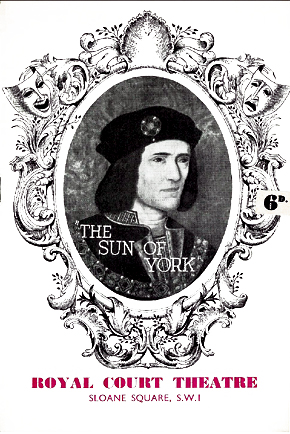 |
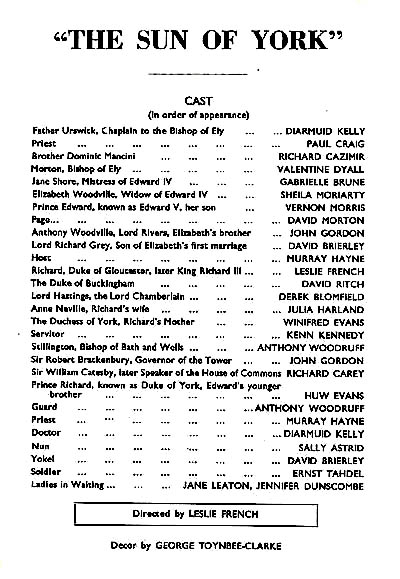 |
RICHARD III QUOTE: "Conscience is but a word cowards use."
‘Three Times a Day’ had now been re-written and was ready to go on tour again. Prior to the re-write, Vernon Sylvane, the author, whom I got on with very well, asked me how much money I was receiving for the first tour; I told him £10 a week. Vernon said, ‘I don’t think that’s quite enough. I’m going to write a part for you so you can earn some more money’; which he did, so, I had the honour of having a part specially written for me by one of England’s great farce writers.
When I went to see Philip Algar who was the General Manager for Linnit and Dunfee who were presenting the play, he said, ‘I think we ought to give you a little bit more money for this tour. You can have an extra £2 per week’. I said to him, ‘Thank you very much Mr Algar, but Mr Sylvane has written a part for me in the show and I wondered if you could also let me have an extra £2 for playing that’. Philip Algar said, ‘We’re not made of money!’ and he took the part away and gave it as a double to somebody else in the cast who was playing a small part. So there it was, a special part written for me by Vernon Sylvane and I couldn’t get an extra £2 out of it. Instead, I finished up understudying it for nothing.
During the tour I used to do all my own washing and I’d string it up in my dressing room to dry out. Among my garments was a pair of silkish type Y fronts, with red and white stripes which I thought were rather fetching, but nobody else got to see them, except Jessica. They were hanging up with the rest of my laundry when I unexpectedly came back to my dressing room, to find Douglas Byng (who had taken a shine to me), with his nose buried deep in them. Perhaps he liked the smell of soap powder; he was extremely embarrassed – so was I. After an inauspicious tour, it became apparent that the show was never going to work and it closed in Blackpool on Christmas Eve. What a lovely way to celebrate Christmas. No job – no money.
Whilst I was on tour, Francis Matthews had moved into George Cole’s flat. We had a spare bedroom and I had asked George if it was alright if Francis took it. George was more than happy to agree. Francis and I were very close friends. We had most of the same interests, played for the Stage Cricket Club together, we liked the same kind of music, and most nights we would be singing along to records from musicals, ‘Kismet’, ‘South Pacific’, ‘Carousel’ etc., and boy, did we both like girls.
Francis had difficulty in reconciling his penchant for girls since he was a fervent Roman Catholic. For those of you who are not aware, you cannot take Holy Communion if you are in a state of sin, and Francis was in a state of sin frequently. By sin, I mean sleeping with girls. Now the only way you can be absolved from this sin is to go to Confession. Francis used to religiously (if you will pardon the pun) go to Confession, between having slept with a girl and taking Holy Communion. The problem was, this happened so frequently, that he couldn’t face the thought of going back to the same priest, so he spent his time ducking and diving around London finding different Confessionals in which to confess his sins. He did on one occasion make the mistake of returning to the same priest who was a Jesuit. When Francis went to see him for the second time, the Jesuit remembered him and said, ‘Didn’t I hear your confession two weeks ago?’ and Francis shamefacedly confessed that he did, and the Jesuit shouted at him, ‘What! Are you a horse?’ He never went back to that one again.
At this time, Francis was having an affair with Ava Gardner, who he had just finished filming with on ‘Bhowani Junction’. Well, not quite an affair – more like a Command Performance. When she felt like it, she would phone Francis and summon him to her suite at the Savoy. I answered the phone on a couple of occasions, rather hoping she would summon me, but no such luck.
Although we shared most things in common, we were the epitome of Jack Lemmon and Walter Matthau in ‘The Odd Couple’. I was extremely untidy and Francis was tidy to almost paranoid pitch - so much so that he appeared to follow me around the flat tidying up after me. I remember on one occasion dishes mounting up in the sink. I think we had about four days worth and Francis was making a stand refusing to do my washing up, until finally he cracked. ‘We soon won’t have anything to eat off or anything to cook in. Why don’t we do the washing-up?’ My counter was, ‘Don’t be silly Francis. The cleaning lady who comes in once a week is due in two days time’. But on this occasion I acceded to his wishes.
We lived together from 1955 until 1960 and in the entire five years, we had only one argument (I think this must have been more due to Francis’ temperament rather than mine), and that was about the colour of some wallpaper. Another item we didn’t have in common, was the fact that I loved to play poker and Francis didn’t gamble at all. Twice a week when I wasn’t working, I used to have a poker game at the flat. It used to start at about six in the evening and go on for hours. I would make a mountain of sandwiches with ham and sliced Kraft cheese, and take sixpence out of each pot to cover the expenses.
Among some of the players was Paddy Stone the choreographer, Peter Charlesworth, an agent who looked after Shirley Bassey, a man called Maurice King and his partner Clive Sharp who managed Shirley Bassey, (Peter was her agent), and various other characters including Charles Palmer, who was at that time a 6th Dan Black Belt and Captain of the British Judo Team, who once fought a 20 stone, 6 ft 8 Dutchman called Geesink for the deciding bout of the World Judo Championships. Geesink threw him off the mat three times and each time dislocated Charles’ shoulder. Each time the referee put Charles’ shoulder back, he continued to fight this giant one-handed, knowing that if he got a draw, the World Championship would be tied. This is not a fairy story – he lost, and had his arm in a sling for months after.
But I digress. We’d be sitting there - about seven of us playing poker, the air so thick with smoke you could cut it with a knife, and at about ten in the evening Francis would come waltzing in with his latest pre-confessional acquisition. His plan was always to impress the girl in the sitting room by listening to music, watching television and having a drink etc., but instead he walked into this hell’s kitchen. Strangely enough, he didn’t get too upset by this because he certainly couldn’t entertain her in the sitting room, so where else could he take her? That’s right - the bedroom.
The next morning at about 9 or 10 o’clock, Francis would awake with his friend and come back into the sitting room and there we all were, still sitting there, still playing poker and the air was even thicker with smoke than it had been twelve hours beforehand. One day George Cole arrived unexpectedly in the morning to find us all sitting in the smoke filled room. He didn’t say anything, but I don’t think he was too happy.
On another occasion he wasn't too happy was when my cousin Michael, who was on leave from the army, came to stay with me overnight. Knowing there was no likelihood that George or Eileen would ever get to find out, I let him sleep in their bed. As luck would have it, George arrived early in the morning to find a complete stranger comfortably tucked up in his bed. Once again, he didn't say anything.
|
|

|
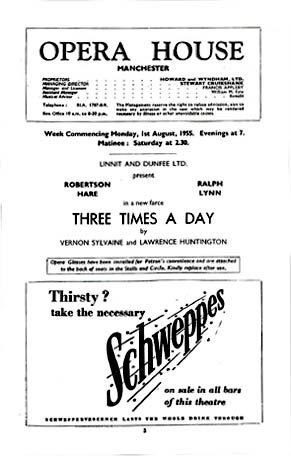
|
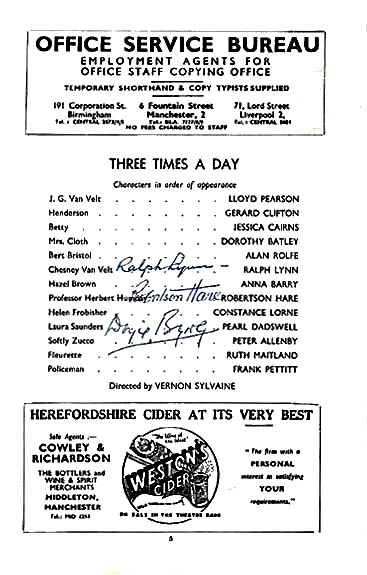 |
ROBERTSON HARE QUOTE: "Oh Calamity!" |
|

|
1956
|
‘Three Times a Day’ had finished on Christmas Eve and it was back to London with no prospects. Once again, I managed to get a temporary job as showman/electrician at The Scala with ‘Peter Pan’ working as a follow spot operator. This kept the wolf from the door for four weeks, but at the end of January I was out of work again. George Cole was happy to defer the rent and Jessica continued to ply me with food, so I survived reasonably well. During this period, George took me to lunch at a Greek restaurant and introduced me to the owner, a man called André. I won’t reveal the name of the restaurant or the owner, for reasons which will later on become apparent.
Pat Farrell rode to the rescue yet again. He asked me if I would like to be Company and Stage manager of a play called ‘El Baile’, which had been an enormous success in Madrid, starring a Spanish actress named Conchita Montes. An American, Anna Deere Wiman, was presenting the play, and Conchita had agreed to appear in London. It was a three hander; the other two characters were played by Dennis Price and Hugh Latimer. I was needless to say, flattered by the fact that Pat had thought I was experienced enough to be a Company and Stage Manager at the age of twenty-five. I learned later that my father had expressed his doubts to his friends as to whether I was old or experienced enough to hold down such a position.
The show charted the relationship of the character played by Conchita Montes and the two men, over a period of thirty years. It was in three acts, the second and third acts each moving ten years on. This meant that there were changes to the furniture and dressings of the set, but basically it remained the same setting, so it didn’t present any problems.
We opened at the Festival Theatre, Malvern. Our next date was the Olympia Theatre, Dublin. I had to charter a freight plane to get the scenery, props and costumes there in time for a Monday opening. When we arrived at Dublin airport we were greeted by the Head Customs Inspector, since a visit from an English touring company was an event.
I had visions of the authorities pouring over the entire cargo to see if there was any contraband. I feared this would have taken so long, that we might have been hard pressed to open in time. I asked him how long he thought it would take to examine the cargo. He said to me, ‘don’t worry about that, let’s you and I go and have a drink whilst they unload it from the plane onto the trucks. I won’t bother to examine it’. He then said, ‘Everything is fine as long as you haven’t got any plants’. I said, ‘Well, as a matter of fact I have - I have three large ferns’. He said, ‘Well you’re not allowed to bring live plants in, but if we pretend they are artificial, there won’t be a problem’. So this was my second experience of the charm and helpfulness of the Dublin people.
The tour passed relatively uneventfully. I got on very well with Dennis and Hugh and particularly well with Conchita, who was a very vibrant, attractive forty year old who’d been a big star in Spain for many years. Her understudy was Carmen Silvera, who later on played a great number of roles, but became known mainly for her appearances in the television series ‘Allo, Allo’.
We toured some of the usual dates, Kings Theatre, Southsea, Theatre Royal, Bath, Golders Green Hippodrome, Streatham Hill Theatre, Theatre Royal Brighton, Prince of Wales Theatre, Cardiff. In Cardiff we were in the middle of fitting-up when suddenly, the entire crew vanished - they just upped and left. I looked around for someone to ask what the problem was, and found the stage door keeper, who told me that all the crew were part-timers, and their main job was as firemen. This meant that if the fire alarm went off, they all had to down tools, jump on their fire engines and speed off to the conflagration. Fortunately on this occasion it was a relatively small one, so they were back on the job in a couple of hours. God knows what must have happened when a show was in the middle of a performance and the fire alarm went off!
Talking of firemen, during the run of ‘South Sea Bubble’ starring Vivian Leigh at the Lyric theatre, Shaftesbury Avenue, it was reported that after everyone had left the theatre and it was locked up, one of the firemen on duty would open the stage door and invite ladies of the night and their customers to use the dressing rooms in exchange for a fee. I suppose Vivian Leigh’s dressing room commanded the highest rent.
We changed the title of the play to ‘To My Love’ and it opened at the Fortune theatre on June 6th; the critics were under whelmed. But it was a cheap show to run and Anna had lots of money, so she kept it on until the end of August, which meant that I was able to repay George Cole the rent which he had deferred, and reciprocate to a certain extent, Jessica’s generosity.
Dennis Price was a character. He had been quite a big British movie star and had earned a lot of money, but he forgot that it wasn’t all his and there was such a thing as Income Tax. He had also gone through a divorce. One of his pieces of advice to me was, ‘Whatever you do, don’t get married – it costs ten and six for a wedding license and it costs £20,000 to get a divorce’. That was in those days. It’s a bit more expensive today. In order to get Dennis out of his financial mess, we had strict instructions from his agent to pay him only one hundred pounds a week and to send the balance to the agency. Dennis was usually broke by Wednesday and asking for a sub. He was the only star I had ever worked with who I can recall having to do this for.
Dennis was a trifle ambivalent with his sex life. He had a male friend who accompanied him and also acted as his dresser/gofer. Each night before the show, Dennis would dispatch him to the local hostelry, ‘The Opera Tavern’, with a canvas holdall and some cash; he would come back with half a dozen bottles of Guinness. Dennis didn’t want anyone to know that he was bringing drinks into the theatre, but I’m afraid the clinking of the bottles rather gave the game away.
To be fair, although he did drink during the show, it was never to excess, and it never affected his performance. His friend, whom I liked, wore a particularly ill-fitting hairpiece, and Dennis, knowing that people could spot that it was a rug at a hundred yards, would tell us that his friend had been in the French Foreign Legion and had been scalped by a Tuarag tribesman. This may or may not have been true, but I never saw him without the rug, so I don’t know if he had the scars to prove it.
|
|
|
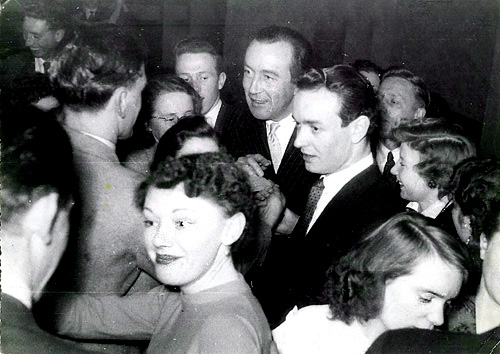
Me with Dennis Price on tour in Dublin
|
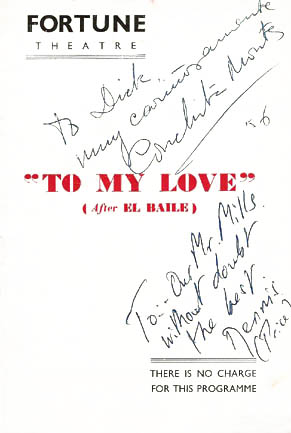
|
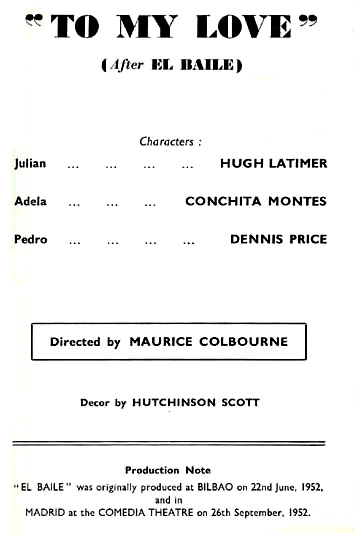
|
DENNIS PRICE QUOTE: "I am a second-rate feature actor. I am not a star and never was. I lack the essential spark."
Whilst the show was running, Anna Wiman used to occasionally invite me back to her flat for a drink, which was in a mews just opposite St. James Palace – purely socially. The show only lasted a few weeks and it looked like I was out of work again. However my benefactor, Pat Farrell, had an argument with Anna and left. Anna asked me if I would like to take over Pat’s job as General Manager. Naturally, although I wasn’t experienced enough, I said yes, and took up my job in her offices in Dover Street in the West End. There were only two other people there; a secretary and a very charming Irish gentleman who held the position of Social Secretary. That meant that he booked all the tables in restaurants, theatre tickets, arranged flowers and generally managed Anna’s social life. In the midst of doing this I believe he might have been enjoying quite a good social life of his own, on Anna’s bill.
Anna didn’t have much going on in London at that time apart from running the Fortune Theatre which she had leased. After I had been in the job four weeks she said, ‘We are off to New York’. She was going to co-present with an American impresario, Kermit Bloomgarden, a play called ‘Maiden Voyage’ by Paul Osbourne. It was a comedy, very loosely based on Homer’s Odyssey. This starred Melvin Douglas, Mildred Natwick and a promising young newcomer playing Odysseus, Walter Matthau. Before arriving in New York we were first of all due to stop off in Bermuda at her country home.
Anna was thirty-two, a petite blonde and fairly attractive. She had studied dancing in New York with the American Ballet Company under George Balanchine and in Paris with Serge Lifar and Egorova. She had danced in several shows in America, but then badly fractured her leg in a car accident which finished her career. Although she now couldn’t dance, her love was show business and she decided to try to emulate her father, Dwight Wiman, who was a famous American impresario from the mid twenties to 1951, presenting over fifty shows on Broadway, including: ‘On Yours Toes’, ‘Babes in Arms’, ‘Three Sisters’, ‘Mornings at Seven’, ‘The Big Knife’ and ‘The Country Girl’; so Anna had a hard act to follow. She was however blessed with great wealth.
John Deere, one of Anna’s ancestors, had invented in the early 1880s, a self-scoring steel plough which enabled the homesteaders to cultivate the mid West. The old ploughs which had been used on the East coast were not suitable since they continually clogged with the rich mid Western soil. The John Deere Company grew with leaps and bounds and today, is one of the top two hundred companies in America. In 2004, its company profits were nearly two billion dollars net. Unfortunately, Anna didn’t live to see this. She died at the very early age of thirty-nine on 22nd March, 1963.
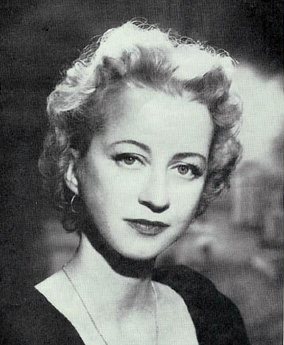
Anna Deere-Wiman
In 1951, apart from her trust funds and inheritances from the John Deere estate, her father died and left her even more money. She was warm, generous, had a good sense of humour and was keen on me. Had it been my inclination, I think I could have had almost anything I wanted, but there were two problems. One, I didn’t fancy her, although I was very fond of her, and two, she was an alcoholic. After just one drink she could turn from being loveable into a very hard lady. But I must add she never took it out on me, but it caused me great embarrassment when I was around and she took it out on other people.
Because of her wealth, when we flew to Bermuda from London we naturally went first class. In those days some of the planes were equipped with two tier bunk beds with curtains which you could draw across. Half way into the flight I was asleep in my bed and a change in the pitch of the engines woke me up. It was night; I looked out of the window and saw by bright moonlight, icebergs and an icy wasteland getting closer and closer. I got rather nervous at this because I didn’t expect icebergs on the way to Bermuda. I didn’t realise at the time that we were going to have to land in Greenland to refuel.
We arrived in Bermuda and were driven to her palatial home which was set on the top of a hill in its own vast grounds overlooking the sea. There are not many beaches in Bermuda because the coastline is very rocky, but her father Dwight Wiman had created his own beach, by dynamiting a great deal of the rock frontage on his property by the sea and creating a sandy cove.
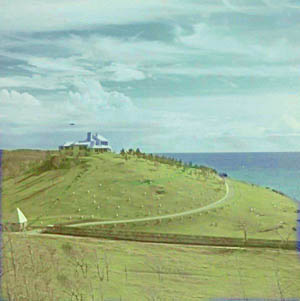
Anna's home in Bermuda
The time was spent entertaining her friends, and me learning to drive her car on her private road. She took me water skiing and fishing. You could go out in a shallow bottomed boat through the coral reefs which surrounded the island for about half a mile, and still, the coral was so close to the surface, you could get out of the boat and walk on it.
I did sleep with Anna once in Bermuda, but she didn’t seem particularly upset with me when I didn’t want to make it a regular thing. I can only assume she liked having me around as her companion and escort. Anyway, I had a wonderful time and Anna didn’t take too many drinks.
On the last night before we were due to fly to New York we went out to a club situated at the other end of the island from Anna’s house. Anna was chatting to some friends and I saw that the owner of the club was playing poker at the bar with three other people, one of whom was the Captain of a British submarine which was in port. I got involved in the game, and after about an hour Anna said it was getting late and she was leaving, but was happy for me to stay.
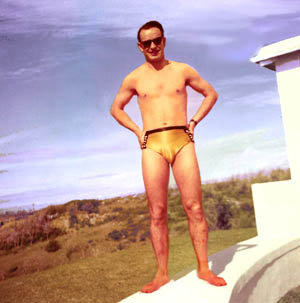
Me - at Anna's home in Bermuda
The flight to New York was due to leave at noon the next day. By four a.m. I had lost half of all the dollars that was supposed to last me for three months, (there was very strict currency regulations in those days), and I was starting to panic. I had worked out that it would take about three quarters of an hour to get back to Anna’s, and then three quarters of an hour to get to the airport after packing. By 6 a.m. I had lost three quarters of my bankroll - now I was really in trouble. By seven a.m. I had lost the lot. ‘Will you take an English cheque?’ I asked. ‘For up to one hundred pounds’, the bar owner answered. I phoned for a taxi and asked it to wait by the entrance. The clock ticked on - a sort of ‘High Noon’. Then my luck turned - by eight o’clock I had a quarter of my bankroll back - I was on a roll - by nine o’clock I had half of it back - but I couldn’t stay any longer. I rushed out, got into the taxi and sped back to Anna’s.
She didn’t say a word when I arrived or reproach me in any way. I ran into my bedroom, threw all my clothes into my suitcase and hurried out to join Anna who was waiting in the taxi. We arrived at the airport, just in time I thought, but as we went through the main doors, a voice came over the loud speakers – ‘The flight to New York has been delayed by five hours’. Just think, if I’d known, I would have had time to get all my dollars back - but on the other hand? (In any event, Anna decided to pay me $100 a week in expenses).
I didn’t normally get excited, but on this occasion, on my first visit to New York - I was. We touched down when it was dark, so my first glimpse of the Manhattan skyline was when it was lit up in all its glory. We arrived at 219 East 49th Street, a four storey brown stone house which Anna owned. The ground floor was rented out; Anna’s apartment was on the first floor and the top two floors consisted of a magnificent, unoccupied, furnished penthouse. As soon as we got our cases in the front door of Anna’s flat, she said, ‘we now better sort out the sleeping arrangements. You can stay here with me or you can have the penthouse. The choice is entirely yours’. Because I didn’t really fancy her sexually although I liked her a lot, and possibly stupidly, was not interested in her money, I opted for the penthouse.
The next day I couldn’t wait to start exploring New York - a regular ‘rubber-necker’. However it was time for business, not pleasure. Anna took me to her office suite backstage at the Alvin theatre on 52nd Street, which at the time was playing ‘No Time for Sergeants’. She introduced me to her secretary and then showed me into an enormous office, beautifully furnished and decorated and said, ‘This is for you. It’s really my office but I’ll work from home. It is the office that my father Dwight Wiman worked from when he was presenting so many Broadway shows’. And with that, she left me to get on with it.
Now, what was I going to do? I sat behind this enormous desk and thought. Anna wants me to be creative, but I’m not old enough or experienced enough at the age of twenty-five to quite know where to start. Yes, I was good at stage management and organisation, but had not developed any creative abilities. I considered that we might be able to transfer some Broadway hits but this was extremely unlikely, since Binkie Beaumont had a virtual stranglehold on anything which was successful.
We had on the stocks ‘Maiden Voyage’, which was due to open in Philadelphia and then transfer to Broadway. We also had an interest in a play which was due to open in Toronto. We were running the Fortune theatre back in London which I was responsible for, we had a play running, ‘The Devil Was Sick’ which didn’t work, and to follow this in, I booked ‘Who Cares’, a play by Leo Lehman starring Alec Clunes. This didn’t work either, but soon to come our way was the Flanders and Swan show, ‘At the Drop of a Hat’, which opened on 24th January and was a great success. We were also in the process of setting up a deal with Sam Wanamaker to run the New Shakespeare theatre, Liverpool, (completely funded by Anna), which was to present plays directed by Sam, and have a social club, a children’s theatre, a restaurant, an art gallery and be open twelve hours a day. Eventually, this got underway in October 1957.
The first few evenings in New York were spent squiring Anna round all the Broadway hits except one, which was ‘My Fair Lady’, starring Rex Harrison and Julie Andrews. Even Anna couldn’t get two seats for this. The management said to her that they could illegally put one bentwood chair in a side aisle - but only one. Anna said to me, ‘You have it’. We dined at Twenty One, Sardis and The Copacabana and met lots of her friends. But my favourite outing was going to see Bobby Short at the Café Carlyle, which I revisited several times.
One day Anna said, ‘I’ve got a special treat for you tonight. We’re having dinner at home and one of my very best friends is dining with us’. That evening her friend arrived at the flat sporting a black eye and a bloody nose. Her first words were, ‘Don’t worry about my appearance - I’ve just been having a fight with two sailors’. It was Diana Barrymore, the daughter of the legendary John Barrymore.
Diana had had a very hard life trying to emulate the success of the Barrymore family. She appeared on stage and in films, but didn’t make much of an impression. In 1955 suffering from alcoholism and severe depression, she committed herself to a sanatorium for a year. In 1957 she published her ‘warts and all’ autobiography, ‘Too Much Too Soon’, which was made into a film the following year, starring Dorothy Malone as Diana and Errol Flynn as John Barrymore. She committed suicide two years after the film was released. She was thirty-nine.
The evening started well enough; Diana was very tough but charming, but as time went on and a few drinks had been downed, she started to get a little nasty. Because of Anna, I didn’t wish to be impolite to her friend, so I put up with it. It got worse and worse until eventually I was forced to say, ‘Look, just because you’ve got your period, don’t take it out on me’. With that, she hit me over the head with a champagne bucket and knocked me out. When I came to she had left, and that was my only meeting with a most unusual and very interesting lady.
I got in touch with my old friend Gabe Katz who’d moved back to New York to a studio in Greenwich Village. I phoned him and arranged to meet him. I took a taxi to the street where he lived but couldn’t find the number, so I paid off the taxi and walked up and down trying to find it. It was snowing at the time, and from the roofs of various buildings I started to get pelted with snowballs – but no direct hits. I finally found Gabe’s flat. When I got inside I told him that some of the local kids were having a bit of fun throwing snowballs at me. ‘A bit of fun?’ he said. ‘You were lucky they didn’t hit you. They put rocks in them down here’.
Gabe introduced me to the English contingent in New York; one was a twenty-one year old who worked in the bookshop of an art gallery but he desperately wanted to get into the theatre. I think he was impressed with what I’d done, and he was certainly impressed when I took him and some other friends back to meet Anna in her apartment. He eventually made it in the theatre, his name - Michael White. Among the many shows he subsequently produced in London were: ‘A Chorus Line’, ‘Annie’, 'Crazy for You’ and ‘Oh Calcutta’.
One of the English contingent was a girl called Pamela. She was married to a Polish count, (they were plentiful in those days), and they had what is euphemistically known as an ‘understanding’. He screwed who he liked and she could make her own arrangements. To be fair to Pamela, I don’t believe she availed herself of this opportunity. When I met her, her husband was away in Europe; we formed a very close relationship which endured for the period of my stay. I expected Anna to be a bit pissed off with this, but she took it in her stride. Sometimes, when she obtained tickets for the theatre she would pass them to me and say, ‘Here – you can take your little blonde friend’. I’ve never quite understood Anna’s feelings towards me – whether she was genuinely indifferent to my relationship with Pamela or whether it hurt, but she didn’t want to make a scene about it.
One day Anna asked me to help her open her safe which had a tricky combination. After a great deal of fiddling about, we finally we finally opened it; she removed all the contents and spread them across the dining room table. There was every conceivable kind of jewelry; watches, earrings, diamond necklaces, gold lighters etc., and a solid gold cigarette case with the map of America engraved upon it, including various cities which were picked out in rubies. I asked Anna what the significance of this was. She said it was her father’s cigarette case, highlighting the cities in which he previewed his shows before bringing them to New York. Anna then said, ‘Would you like something?’ I said ‘What do you mean?’ She said, ‘Help yourself to anything you like’. I said, ‘You’re joking’. She said, ‘No - take anything you like’. I took the cigarette case.
Four weeks later when I returned to my flat from the office, I couldn’t get my key into the lock. After fiddling about for a while trying to get the door open, I went downstairs to Anna’s apartment and called a locksmith. When he arrived, he tinkered with the Yale lock and pulled out a broken toothpick. ‘You’ve been burgled’, he said. He let me in and I went upstairs to the bedroom. It was in total disarray, all the drawers had been pulled out and all my clothes had been taken from the wardrobe and were on the bed ready to be packed in two of my suitcases, which were alongside. For some reason, which I have never been able to work out, there were black handprints all over the white paintwork in the bedroom. Everything small was gone, including the gold cigarette case - even a jar which had some one cent pieces in it. I called the police, and a real hard- bitten New York detective arrived very quickly and took all the details. ‘You were very lucky. He heard you trying to get in, otherwise you might be dead’. That made me feel a bit better
When I told Anna about the burglary and the fact that the cigarette case was gone, she said ‘Well, you should have been using it shouldn’t you, but never mind, I’ll get the value of it back on insurance’ - which she did. But she didn’t offer me any of the money.
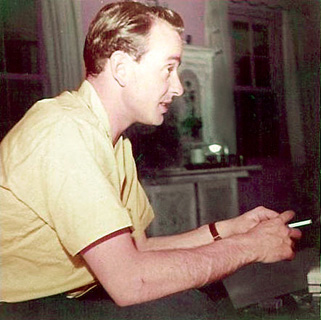
Me, listening to Anna tell me I wasn't getting any of
the insurance money
Anna and I went to Philadelphia for the rehearsals and opening of ‘Maiden Voyage’ but in spite of a lot of cutting and re-writing and a brilliant performance by Walter Matthau, it just didn’t work, so it was reluctantly decided to cancel the Broadway opening.
At Christmas, magnanimous as always, Anna said I could invite Gabe Katz, Pamela and all the English contingent back to her flat to celebrate Christmas Day. They were all rather surprised at being entertained by this fabulously wealthy lady who had just three or four of her own friends present, but they thoroughly enjoyed themselves. The more I think about it, the more I think that Anna was probably basically very lonely and with good cause. She was always concerned that the people who flocked around her were after her money.
There had been an occasion back in London when after the opening night of one of her plays, ‘Plaintive in a Pretty Hat’, she invited me and twelve of her friends to dinner at Les Ambassadeurs, one of the most expensive restaurants in London. Several of the guests were free-loaders, and Anna, near the end of the meal, rose to her feet and said, ‘I’m fed up with you lot using me as your meal ticket. I’m off and you can pay the bill yourselves’. With that, she swept out. There was a furore – everyone desperately scrambling through the contents of their wallets and purses to see if between us, we could scrape together enough to pay the gargantuan bill, since we had been eating and drinking the best of everything. When we finished pooling all our resources, we found we had just about got enough to cover it – but we passed on the coffee. The next day at the office, Anna breezed in and said, ‘Hi Richard - sorry about last night - didn’t mean for you to pay a share. How much was it?’ and wrote me a cheque to reimburse me.
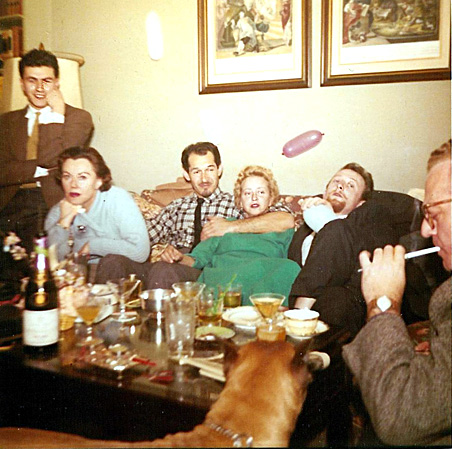
Michael White (1st left), Anna (4th from left), Gabe Katz (5th from left)
One evening in New York, Anna told me we’d been invited to dinner at her mother’s, just the two of us. I was a little nervous at the prospect of this, thinking that her mother wanted to vet who this potential new con artist might be helping Anna spend her money. We arrived at her apartment on 5th Avenue, the opulence of which was stunning. Her mother, a beautiful aristocratic lady was dressed impeccably; she greeted me, patted the seat beside her and said, ‘Now, tell me all about yourself’ - which I did, sparing very few details. I think the penny dropped that I wasn’t after Anna’s money, and she, for her part was pleased that Anna had an escort who wasn’t a fortune hunter. She was absolutely charming to me all evening and at the end said, ‘Anna, you really must bring Richard again’. Regretfully, we never had the opportunity to return.
At about this time Pamela’s husband returned from Europe and Pamela threw a party to welcome him home. All the usual people were there, plus two English nurses who were working in a hospital in New York. The evening started well, but contrary to the arrangements which were supposed to exist between Pamela and her husband, he got exceedingly jealous and wanted to fight me. During the scuffle which ensued, I had the better of him but just could not bring myself to punch him: (a), because I could understand him being jealous and (b), I didn’t want to upset Pamela, so it was more of a defensive battle on my part. The culmination of this was that I banged my head on the wall and got concussion. I was escorted back to my penthouse by the two nurses who stayed the night. What a waste – two nurses in one room and me in another suffering from concussion.
I received one hundred dollars a week, which was for my salary and living expenses, more than adequate for my needs, since I had no rent, gas or electricity to pay in New York, just my share of the expenses of the flat in London. Each working day I took great delight in having lunch at a different restaurant in New York of which there are hundreds. I experienced every conceivable type of cuisine; the only one I didn’t enjoy was the uncooked Japanese. I would save my receipts and give them to Gabe Katz who used them to claim against his income tax.
Anna and I flew up to Toronto to see the play ‘Be My Guest’ which she had an option on. I had thought New York was cold; when I went out on the streets in winter it was so bitter, I felt as if my face was cracking. In Toronto, I felt if somebody struck me a glancing blow; my whole body would disintegrate into shards of frozen, splintered flesh; that’s what being brought up in a temperate climate does for you.
The play was fair and we tied up the arrangements to present it in London. It was then getting near time to return to England, but Anna kept changing her mind about how we were going to do it. First we were going to fly to Bermuda; then we were going to sail on the Isle de France; then we were going to sail on the Queen Mary and finally, we finished up on a grotty ship called the Empress of Scotland. The voyage took six days; Anna had taken a girlfriend along with her so I was left to my own devices. I can honestly say at that time I never wanted to set foot on a boat again. It just felt completely claustrophobic.
On the morning of the day we set sail, I thought I had better not return from New York without visiting the Empire State Building. I jumped in a taxi, drove there, took the lift to the top, had a quick look round, went back to the flat and made ready for my departure. To my surprise, by the gangway on the dock stood Gabe Katz with a weeping Pamela to see me off. New York was a pleasant interlude in my life and I was very fond of Pamela – but not fond enough.
|
|
GENERAL MANAGER ADW PRODUCTIONS
|
1957 |
We landed at Liverpool on April 6th. I decided that as generous as Anna was, the pressure of coping with her vacillations and mood swings once she had had a drink, (not particularly applied to me but to other people), and the fact that whenever we dined out, she was in the habit of taking the cutlery and ashtrays. On one occasion, she even appropriated a silver teapot. But the restaurants knew her and the missing items usually finished up on her bill. It was becoming too much of a strain, so I reluctantly gave her a month’s notice to finish on May 17th.
We parted the very best of friends, but I felt that not only was the job was extremely difficult, but it wasn’t particularly taking my career forward. Anna asked me, although I was resigning as General Manager, would I be the Company and Stage Manager on ‘Be My Guest’, - the play we saw in Toronto. I readily agreed to this although the show wasn’t due to commence rehearsals until August, which meant that I was going to be out of work for about ten weeks. I managed to survive by drawing my dole from the Labour Exchange each Friday, which in those days was £2.50 a week. I would then take the money to a poker game on Friday evenings, and usually managed to parlay it up to £10 or £12, which was enough to keep the wolf from the door
It was quite an enjoyable time; it was a warm summer and I was able to play lots of cricket - not just for the Stage Cricket Club, but also with some other theatrical cricketers, and together we founded the London Theatre’s Cricket League. We played 20 over matches on Parliament Hill fields. The league was relatively small, consisting of Covent Garden, Drury Lane, The Coliseum, The Arts Theatre Club, which was my team, and out of this, grew a cricket club called The London Theatre’s, which is still thriving today with a very full fixture list.
The summer had passed pleasantly, and we commenced rehearsals in August. In the cast were Jane Baxter, my friend Dennis Price, Peter Sallis, who later became very well known for his performance in ‘Last of the Summer Wine’, and a rather attractive twenty-one year old ingenue with whom I became very friendly. She invited me to stay with her mother and father for a few nights whilst we were rehearsing. They asked me if I would look after their daughter whilst we were on tour, as she’d never been away from home before. I don’t think they realised they were asking a wolf to guard the sheep. Anyway, when I told Francis Matthews I was guarding this particular sheep he was livid, because he’d just been in a show with her and she’d very much taken his fancy - but nothing had materialised.
We opened at the Theatre Royal Brighton and on the first night, Dennis Price lost his voice which meant that his understudy was on – and the understudy’s understudy was on – and the understudy’s understudy’s understudy was also on. That was me! I only had two lines, but I was very nervous. I was the playing a Chief of Detectives; we were raiding the house where Jane Baxter lived. All I had to do was burst in ahead of a group of detectives and say: ‘This is a raid – you’re all under arrest’. I paced up and down at the side of the stage for an hour rehearsing these two lines, putting every conceivable inflexion that I could think of on the lines. The moment arrived - I burst onto the stage - opened my mouth and - ‘dried’. Thank God Dennis returned the next night.
On the tour we had to play Dublin, which meant chartering a freight plane which also had a dozen seats in the cargo hold. To save money, I arranged that the company (not the stars) should fly with the scenery. At the time I didn’t realise what a tight squeeze it was going to be. By the time we had jammed all the scenery and props into the aircraft, there wasn’t a lot of room left for the passengers; so there we were, sitting in our seats with bits of scenery poking between us and over our heads, whipping backwards and forwards as we took off. ‘Don’t panic!’ I cried - ‘Just hang on to the scenery’. There were a lot of green faces when we de-planed in Dublin. When it was time to return from Dublin the scenery flew on its own, and the cast came by a commercial airline.
The tour progressed favourably; I fell deeply in love with the ingenue and this was reciprocated, or so I thought. The relationship for the tour was wonderful. It commenced when we were both staying at the famous Mrs. McKay’s in Manchester. However, since we were both in the annexe, unlike Eric Morecambe I didn’t have to carry her upstairs on my back to avoid the sound of two sets of footsteps. But when we got to the last night of the tour, she said to me, ‘I’m afraid this cannot continue – this is the end of our relationship’. I don’t know what prompted it – maybe it was a desire to pursue her career unfettered by romantic entanglements - but it left me broken hearted for some time to come.
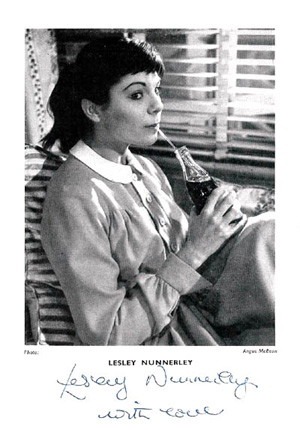
After the tour, we opened at the Winter Gardens Theatre in Drury Lane. The show was not a success, but it limped on for a while for a few weeks and paid the rent before closing on Jan 4th. (The Winter Gardens has long since gone having been torn down and replaced by the New London theatre).
|
|

|
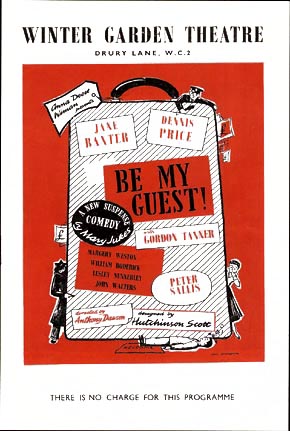
|
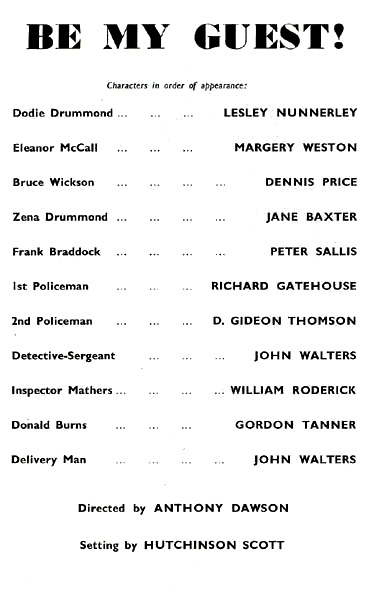 |
DENNIS PRICE QUOTE: "It costs 10s/6p to get married and £20,000 to get a divorce".
|
|
1958 |
Within a week of closing I received a phone call out of the blue, asking if I would company and stage manage a play called ‘Hunter’s Moon’ by the famous author Marc Connelly, who wrote ‘The Green Pastures’, which won the Pulitzer Prize. He also wrote ‘The Solid Gold Cadillac’, ‘The Farmer Takes a Wife’ and he collaborated with George S. Kaufmann on several occasions.
Mark was also a member of the famous Algonquin Round Table in the 20s and 30s, which included such prestigious personalities as Dorothy Parker and Robert Benchley and briefly, such luminaries as Noël Coward and Tallulah Bankhead. At one of the meetings, one of his friends crept up behind him, placed his hands on Marc's bald head and said: 'Marc, your head feels as smooth as my wife's arse'. Without pausing, Marc raised his hands to his bald head , rubbed them back and forwards and said: 'So it does - so it does'.
When I met him for the first time, he said, ‘We are due to start rehearsals on the 17th and we are going to open cold at the Winter Gardens - but I have a problem. I haven’t yet been able to find a suitable leading lady’. By this time I had read the script and I asked him – ‘does she have to be a star?’ ‘No’, he said. ‘Then I’ve got just the girl for you’, I replied. I arranged for my ingenue from ‘Be My Guest’ to audition for him and he was over the moon. ‘She’s just like a young Greta Garbo’, he said, and signed her on the spot.
The Winter Garden which was a monumental white elephant, had let all the staff in the theatre go after the closure of ‘Be My Guest’. All that was left was the manager of the theatre, a box office manager, an electrician and the fireman. ‘Hunter’s Moon’ was a big show with a cast of about thirty, with four big sets. The first scene was the attic of a house full of children’s toys and playthings. Act II was a village, Act III, Scene I, was a classical living room furnished with antiques, Act III, Scene II was a forest.
We were due to open on 26th February and as the show was on a very tight budget, (I also had to act as Production Manager), every conceivable task seemed to land in my lap. I had to find and hire the entire staff of the theatre, which included the Master Carpenter and his team, flymen, electricians, follow spot operators, stage hands, wardrobe mistress and staff, - chase up the scenery contractors, (who were well behind in their delivery times, so we couldn’t rehearse with the scenery), and supervise the liaison between the costume makers and the designer. Fortunately I had a very good Deputy Stage Manager called Ruth Atkinson, who was a tower of strength. So at least my stage management team was good.
In the middle of running around trying to organise all these various elements, Marc Connelly, who was also directing the piece, one day said to me, ‘Do you mind taking the rehearsals in the afternoons for the next week - I’d like to play poker at my club’. I said, ‘I don’t mind supervising them along with my Stage Manager, Ruth - but don’t expect me to give any directions’. ‘Oh, no’, he said, ‘just keep it all ticking over’. Then came the bombshell. ‘Would you light it as well?’ the General Manager asked. ‘Not bloody likely’, I said. ‘Enough is enough!’
Towards the end of all this turmoil, we finally reached the stage where we had all the scenery, all the stage hands, all the costumes, and everything necessary to proceed. Unfortunately, Timothy O’Brien, who was a brilliant television designer, was cutting his teeth in the theatre - this was his first show; his design wasn’t very practical.
The first time we ran it, the scene change from Act I to Act II took two hours. The scene change from Act II to Act III took one hour. The scene change from Scene I to Scene II in Act III was a black-out change, and was supposed to take thirty seconds at the outside. The living room which we were changing out of was furnished with beautiful antique furniture, exquisite candelabra and cut glass ornaments, and this had to change into a forest.
The black-out came, and all that was heard was the sound of stage hands cursing and falling over each other, the tinkling of broken glass and the thudding of antique furniture being dropped. We’d had one or two dummy runs with the working light on so everyone could see what they were supposed to do, but it was a different kettle of fish in the black-out.
Not being able to bear the sound of devastation any longer, I ordered the working lights to be switched on and surveyed the scene of mayhem. ‘We’ve got to stop here’, I said to Marc Connelly. To Timothy O’Brien the designer, I said, ‘The insurance bill is already astronomic; if you don’t simplify the furnishings of this living room and get rid of all the crystal glassware, everything will be smashed and the insurance company will not pay out’.
He did cut out a lot of the ornaments and furniture, and we were able to stagger through the change without any further breakages - but it certainly took a lot longer than thirty seconds.
This is the only show I’ve ever done which had more previews than performances. We started on a Monday with unpaid public dress rehearsals, by which time we had managed to get the First Act scene change down to one hour. We previewed up until Thursday, opened on Friday and closed on Saturday. We had a child actor called Bunny May in the show, and because of his schooling requirements, he missed two of the performances that week. I think that has to be some sort of record!
Bunny later on went on to run the theatrical club, Gerry’s. Among a multitude of other parts in his career he played the Donald O’Connor role opposite Tommy Steele at the London Palladium in ‘Singing in the Rain’.
During the rehearsals and performances of this show, I think I was averaging about three and a half hour’s sleep a night, so it seemed that no matter how hard I thought I’d worked on some shows in the past, there was always another bridge to cross. |
|

|
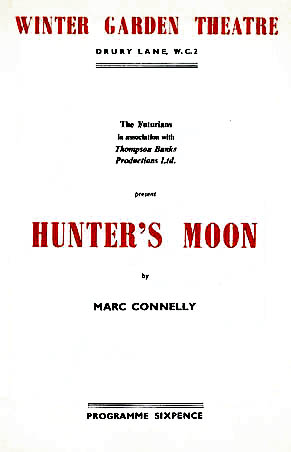
|
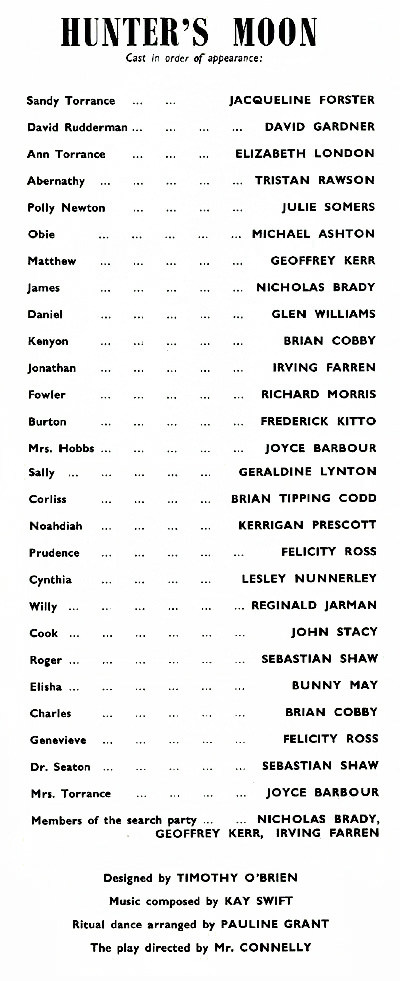
|
After ‘Hunter’s Moon’ closed, still no money - back to the Labour Exchange and to the poker game; George Cole once again was deferring the rent. Jessica, with whom I’d remained close friends in spite of our split up, informed me that she was going to give up acting and become a nurse. There had been a period in our relationship when she had been grievously ill in hospital; she had always spoken very highly of the care and devotion of the nurses. It was something she had been dwelling on for some time and she finally decided it was her vocation. She was certainly right about that. A couple of years later she won the Nurse of the Year award.
I was still friendly with Anna Wiman; we would meet from time to time and she told me that all was going well with Sam Wanamaker and the New Shakespeare theatre. It transpired that this didn’t last, and she withdrew her backing after a disagreement in 1959. It was a very brave venture, but Anna and Sam were a highly volatile combination.
In the middle of March I received a call from Bernard Gillman who was the General Manager of the Arts Theatre, asking me if I would like to company and stage manage ‘The Iceman Cometh’ by Eugene O’Neill, which had opened at the Arts Theatre on 29th January. It was such a success that Campbell Williams, the owner of the Arts theatre, decided to transfer it in association with Emile Littler.
The play which was written in 1941, was a failure when it was first presented on Broadway. At that time it was thought that O’Neill, who was a Nobel Prize winner and a leading light of the American theatre for two decades, was in decline. The up and coming new playwrights were Tennessee Williams and Arthur Miller. Ten years later the play was revived and was a huge success. Unfortunately, O’Neill didn’t live to see this, nor the success of the ‘Long Day’s Journey into Night’; he died an underrated and disappointed playwright in 1953.
With ‘The Iceman Cometh’ I was going to be back at the graveyard of the Winter Garden Theatre, since this was where it was to transfer to. The play was set in a seedy bar in New York. The cast was wonderful, led by Ian Bannen who played Hickey, a character whom the whole play revolves around. It was a very long piece, starting at 6.30.p.m. and finishing at 11.00p.m. The first act ran for one and a half hours, followed by a three-quarter hour interval. Cold prepared airline type dinners were sold to the audience; I had a three-course meal sent in from an Italian restaurant next door.
Apart from being Company and Stage manager, I had to understudy the part of Moran, who didn’t appear until the last twenty minutes of the play, but was pivotal to everything that had happened before. He was a sinister figure who appeared, just as Hickey who was downstage centre in a single spotlight, launched into a fifteen-minute monologue.
The rest of the cast were seated around the stage in relative darkness, while upstage centre stood this sinister figure Moran who nobody knew, and all were wondering who he was, and what he was doing there; (he was a detective who had come to arrest Hickey for murder). He was lit with a single bright light and had to stand there motionless, looking like the Grim Reaper, waiting to take Hickey away. This position had to be frozen while Hickey delivered his monologue.
You’ve guessed it! One evening at about 5.30 pm, I found out that I had to go on; this left me with five hours of toilet time. The problems I had were that I had a severe streaming cold, and Tony Burley, the man I was going on for, was twice my size and I had to get into his costume. I went about it methodically, as I had five hours to prepare. First of all I put on his trousers which were about ten inches too wide for me, (these were secured with safety pins and a belt); his jacket was pulled in at the back and once again was pinned, and his bowler hat I stuffed with a copy of the Evening Standard.
Now I was ready - with two hours to go. I looked in the dressing room mirror and what I saw staring back at me was not the Grim Reaper - it was more like Stan Laurel in Oliver Hardy’s clothes. ‘What’s sinister?’ I thought - ‘I know - a large black moustache’. I raced round the company. ‘Has any one got a moustache in their make-up box?’ ‘No’, they all said. ‘I’ve got some spirit gum’, said one. Great - I thought - I’ll get some scissors, cut some of my hair off and stick it on my lip. Because of my cold, I wouldn’t do the moustache until just before I was due to go on.
After what seemed an eternity - the moment arrived. I glued on my moustache, adjusted my hat and made my entrance. I got through my first lines okay, and took up my position upstage in the bright light. Terrified - I stood there motionless. The rest of the cast who were in relative darkness, and knew of my acting shortcomings were studying me with great interest, whilst Hickey spoke his monologue.
After a few minutes I started to get cramp, and as I eased myself slightly, the trousers felt as if they were loosening. Then the cold took over and my nose started to run - it became runnier - I felt it start to wash away part of my false moustache - part of which was starting to reach my chin. Game to the last, I did not move until Michael Bryant who was playing Willie, and was seated upstage facing me, whispered, ‘You know you would have made a marvellous screen actor’. With that, I must confess I was guilty of a slight titter. With the rest of the cast it was more than slight.
Ian Bannen must have wondered what was happening - if indeed he heard, or was aware of the scene taking place behind him. Most of the casts’ shoulders were shaking with silent laughter. They were watching me with even greater interest now. Would I remember my next line when it was due? Would my moustache fall on the floor? Could I keep my trousers up? Somehow I got through it without any major disasters.
Earlier in the evening, the word had spread among some of my theatrical colleagues working in the West End, that they could probably just catch my performance if they hurried to the Winter Gardens Theatre after their respective shows finished.
As my fame as an actor had spread before me, they were interested to view my acting master class. About twelve of them arrived before I had made my entrance, and they managed to persuade the manager of the theatre to let them stand in the gangway at the back of the stalls. After the curtain fell, they rushed back to Gerry’s Theatre Club to report back to our mutual friends. When I arrived a little later, I received a standing ovation.
During the run, my love life took a brief turn for the better. Julie Hamilton, a lovely lady with a great sense of humour, paid a visit to the theatre to see Ian Bannen, with whom she had become friendly following the break up of her relationship with Sean Connery.
Out of earshot of Ian, we fell into conversation. She invited me back to her flat in the West End with some friends from Gerry’s,this led to a romance between us, but it fizzled out after a few weeks. I suppose she felt she could do better, but I was always grateful to her for the odd nights we spent in Michael Foot’s bed at his flat in St. John’s Wood, whilst he was away in the country with Julie’s mother, Jill Craigie.
One night before the show, I received a deputation from the three ladies who were playing streetwalkers - Margaret Whiting, Hilda Braid and Prunella Scales. They gathered in my office and launched straight into the attack. They informed me that one of the actors smelt so much, it was making them feel sick and consequently, they were finding it almost impossible to work with him. They weren’t sure where the smell was coming from, but they thought it was his feet.
This was a new problem for me - I don’t think it was one that had been experienced by many Company Managers through the ages. ‘What do you what me to do about it?’ I asked. ‘We don’t know - but you must do something. You are the Company Manager’, they replied. I promised I would give it some thought, to which they responded, ‘Be quick about it’. I meditated. I couldn’t tell the actor because I didn’t want to make an enemy. Anyway, I would have to tell him someone had complained, and he would want to know who. Could I get someone else to tell him? No, that wouldn’t work. You all know the line ‘What even your best friends won’t tell you’.
Eventually I came up with a possible solution. I went to the chemist’s and purchased a bottle of rosewater. I got to the theatre early the next afternoon, long before anyone else was due to arrive, let myself into the dressing room which he shared with several other actors. Why didn’t any of them complain? I thought. Maybe it was just a woman’s thing - maybe their sense of smell was more acute.
Now I had to identify which were his shoes among the several pairs that were lying about. So, there I am on my hands and knees sniffing all the actor’s shoes, wondering what on earth I am going to say if one of them comes in unexpectedly and finds me indulging in this fetish of shoe sniffing. Fortunately no one did and I was able to identify the offending footwear, and I doused them with rosewater.
That must have solved the problem, because I never heard anymore on the subject. But I did continue to sprinkle the rosewater every two or three days. Thank God the show had to close after run of about five weeks, since the chemist from whom I was purchasing the rosewater was starting to look at me rather quizzically.
|
|

|
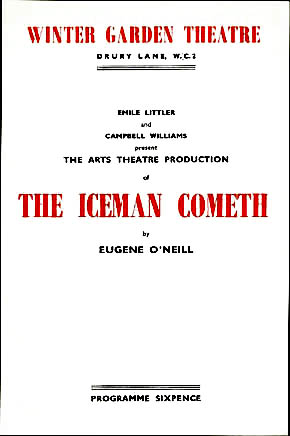
|
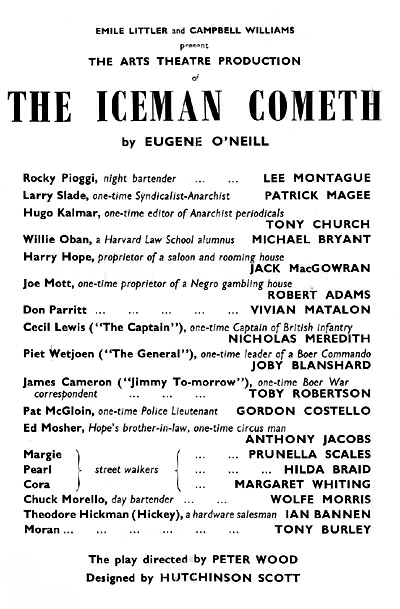
|
EUGENE O'NEILL QUOTE: "There is no present or future, only the past, happening over and over again, now".
After the show closed - still no money. Usual routine - Labour Exchange - poker - George deferring the rent. I received a phone call from a producer, Toby Rowland, at the beginning of June asking me if I would like a job as Company and Stage Manager on ‘Brouhaha’ starring Peter Sellers. I readily agreed. Little did I know of the aggravation that was in store for me. Toby Rowland had apparently asked Ruth Atkinson, my Deputy Stage Manager on ‘Hunter’s Moon’ who her Company Manager was. Ruth told him and Toby said, ‘I’ve never heard of him’. Ruth recommended me.
Toby was a charming man. He originally came from Libby, Montana with his wife, Milly and started to work with Binkie Beaumont at H.M. Tennent's. Apparently there was a falling out, since John Perry, who was Binkie’s partner, was jealous of the relationship that developed between Toby and Binkie.
Toby left to set up on his own with the backing of Prince Littler, the head of Stoll Moss Theatres. He hadn’t had much success and was hard up. His office consisted of three tiny rooms in Chandos Place; his room was at the back. There were no windows, just a skylight and it was very damp. Toby and I hit if off very well – so well, that for years afterwards he always asked to look in my diary to see what my poker winnings or losses were for each week. He was the only one I ever showed it to.
An excerpt from a letter Toby wrote to Sheila years later
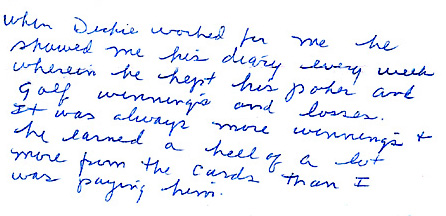
Toby had a great capacity for drink. I had on more than one occasion seen him put a whole bottle of Scotch away in about two and a half hours, and not appear the slightest bit worse for wear. Toby formed an important part of my theatrical life over the next few years, as you will read later. (That is if you continue to read).
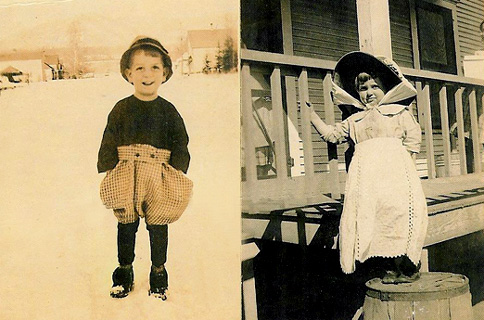
Toby and Millie Rowland as children in Libby Montana
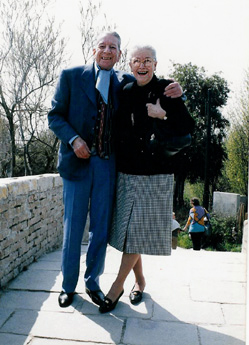
Toby and Millie just a year or two later
‘Brouhaha’ was a comedy written by George Tabori, set in the 1950s in a tiny Arabian country by the sea, which was formerly a British Protectorate. Because of its position on the map, both America and Russia were anxious to be an influence in its development. Its ruler, the Sultan, was played by Peter Sellars, who in order to receive aid from both the Russians and the Americans, pretends that there is internal strife, and there might be a coup, which would be to the detriment of one of the two countries.
The two nations sent representatives to try and gain a foothold in the country. The American representative, Stitch Allentock, was played by Jules Munshin, a charming American who had appeared in many Hollywood films including ‘On the Town’, in which he played one of three American sailors. The other two sailors were played by Frank Sinatra and Gene Kelly. You are not going to believe the following - but it's true - one of the captions on the trailer for 'On the Town' read 'Twice as Gay as Anchors Aweigh'!
Among the rest of the ‘Brouhaha’ cast, the Russian representative, O. Tyekin, was played by Leo McKern and Buscombe, the British resident, was played by Lionel Jeffries. Also appearing among the large cast were John Wood, Hermione Harvey, Anne Leon, Timothy Bateson and John Cater.
Francis, my flatmate was also initially cast, but he didn’t know how big his part was. After he looked at my script, which I had some weeks before we started rehearsing, he decided his part was too small and asked his agent to get him released. Peter Hall, the director, was not very pleased when he found out how Francis had seen a copy of the script.
Whilst ‘Brouhaha’ was running I formed a relationship with my Assistant Stage Manager, Prue, who was the daughter of Mrs Campbell-Williams by a previous marriage. The Campbell-Williams’s owned The Arts Theatre, and had a flat on the top floor. In their absence in the country, Prue and I used their flat. Mrs Cambell-Williams who had a great sense of humour, tackled me one day at the bar in the Arts Theatre and said, ‘Who’s been sleeping in my bed then?’ I don’t know how she found out, but I had to own up.
It was during this period that I heard that they were looking for a Stage Manager for the Arts Theatre and as my father was out of work, I introduced him to Campbell-Williams. He joined them as Resident Stage Manager.
During rehearsals for ‘Brouhaha’, Peter Hall was nearly lost to the theatre. We had a scene in the play in which John Wood was to be guillotined, but the blade sticks. Peter, being a perfectionist for detail, wanted a real guillotine with a very heavy steel blade, so that it made a loud crash when it was tried out onstage, prior to John Wood putting his head into it ready for execution. The way we caused it to jam was that after it was tried out, without the audience being able to see, the actors surrounding it inserted four heavy steel bolts into the track supporting the blade, which stopped it on the way down.
Because it was such an important and dangerous prop, during the rehearsal period, Peter Hall, John Wood and I went to the property makers to see it in action. We set it up to fall without the steel bolts in position. We released the heavy steel blade and it fell with a crash that shook the floor. John Wood turned green, ‘I’m NOT going to put my head in that’, he muttered. Peter said, ‘John there’s no problem. Once we insert the steel bolts, it will stick. I’ll show you’. We put the steel bolts in and tested it three times and it worked perfectly. ‘I’m still not putting my head in it’, said John.
Peter said, ‘John, would I ask you to do anything that wasn’t perfectly safe? I’ll put my head in it to show you how confident I am that it’s safe’. ‘Just a minute Peter’, I said. ‘Let’s try it out a few more times before you do’. We tried it three times, and it worked perfectly. ‘Okay, let’s do it’, Peter said. My nervous response was, ‘Just one more test for luck’. We raised the blade and released it. The blade clattered down, jumped out of its guide tracks, bypassed the steel pins, and smashed into the floor just below where Peter’s neck would have been. Many green faces and back to the drawing board.
I sometimes, in subsequent years when I was sitting round the table with Peter Hall at National Theatre Board meetings, used to wonder who would have been running the National Theatre if we hadn’t had ‘Just one more for luck’.
Peter Sellers revealed himself as a total monster during the run. On the first night in Brighton I received the first inkling of what might lie ahead when he said to me, ‘If I’d known I was going to have to have to do the same thing every night, I wouldn’t have signed the contract’. As it turned out, he never did do the same thing two nights running.
Whilst we were in Brighton he said to me, ‘It takes too long to put all this bloody body make-up on for every performance. Will you go out and buy me a car paint spray so I can spray it on every night?’ A strange request, I thought; but as my job was to keep him happy, I obliged. He tried it once and then said that it bored him - he wasn’t going to use body make up after all. I got a rocket from the producers for wasting money. After a two week try-out in Brighton, we opened on August 27th 1958 at the Aldwych in the West End.
The play was constructed rather like a revue, with all short scenes running between five and ten minutes, except for the last one which lasted for half an hour. The total theoretical running time of the play was just under three hours, including interval, but according to the whims of Peter, it varied enormously. The fastest recorded running time was two hours and thirty-one minutes, and the longest, three hours thirty-one minutes. If Peter was enjoying himself, he really padded it out.
One night he took a film camera on stage with him and said to the audience, ‘This is my favourite scene in the play - do you mind if I film it?’ This he proceeded to do, including several retakes. He also asked other members of the cast to take the camera and film him in various shots, both close-up and long shots. The audience was a trifle bemused.
On another occasion he had been out drinking before the show. Upon his first entrance he went forward to the footlights and said to the audience, ‘I’m pissed, I’m very pissed. Would you please vote and let me know if you would prefer to see me pissed, or the understudy sober’. Of course, the audience all shouted, ‘You’
You might ask why this was tolerated by the management. The answer was that without him the play would have closed, so I was instructed not to make any waves, just let him do his own thing. In the meantime, the management and Peter Hall were noticeable by their absence, just in case they felt compelled to say anything. After a while, things deteriorated to such an extent that I said to Toby Rowland, ‘You really must send Peter Hall in to see what is happening’. Toby and Peter reluctantly agreed, and the evening arrived when Peter was due to see the show.
In the interval he told me to call everyone onstage after the performance for notes, but not Peter Sellers, and asked me to make sure the float mikes are left on, so Peter could hear what was being said in his dressing room. The cast were assembled onstage. This is it, I thought. Now Peter Hall is going to address the situation. Peter spoke. ‘Ladies and gentlemen’, he said. ‘I have just watched the performance and you should all be ashamed - it was terrible. The only person who is being true to the piece is Peter Sellers’.
He knew which side of the bread was buttered, for the show, the cast and everyone in the theatre. If he had criticised Peter, Peter would have walked out. The company realised that too. Honour had been served - the director had been in, and it was every man for himself. If I’d been Peter Hall I would have done the same thing.
Peter Sellers was starring in the film ‘Mouse on the Moon’ which he shot in the daytime while appearing in ‘Brouhaha’. There was a great deal of location work in Southampton, and he hired an ambulance to take him back and forth from London so that he could sleep. On occasions he would either be delayed, or, I assumed he felt he just didn’t want to perform. About one hour before the curtain went up each night, I used to dread getting a phone call at the stage door from him telling me he wouldn’t be appearing. This happened frequently. In fact so often, that his understudy Colin Ellis, held a party to celebrate his 25th appearance.
Among all the artists who suffered from his activities was the very lovely actress, Hermione Harvey. One evening when he had had a little too much to drink, he was dancing with her along the footlights, when he took one step too many and fell into the orchestra pit, taking her with him. There was a hell of a crash and a long pause. I rushed onstage, and peered down into the darkness asking, ‘Are you all right down there?’ There was a groan, followed by another pause, and then he slowly clambered out of the pit and wandered off into the wings. Hermione called out, ‘What about me?’ He reluctantly came back, and helped her out of the pit. Hermione said, ‘Let’s continue,’ and he said, ‘I’ve had enough for the night’, and went to his dressing room, leaving Hermione and me looking at each other. I said to the audience, ‘You’ve all seen what happened - I’m afraid Mr. Sellers can’t continue - the understudy will have to take over’, which he did, and Hermione, the trouper that she was, continued as if nothing had happened.
The press were at the stage door within ten minutes, trying to find out what had happened. It seems that we must have had a mole in the theatre, because whenever there was a problem, the press were always there looking for a story within ten minutes. The mole must have earned a fortune during the run, whoever he/she was.
Peter was always trying to corpse Hermione, but she somehow always managed to take it with good grace, even on the occasion when he said to her, ‘I want you to wear a moustache tonight’. She protested - but he was adamant, and, rather than upset him and possibly cause him to miss the performance, she agreed. She appeared that evening, this beautiful actress, most unhappy, with a huge black curly moustache painted on. God knows what the audience thought of it all.
No one escaped. One night while playing a scene with Leo McKern, Peter suddenly said, ‘Would you like to dance?’ Leo was not sure what to do, but thought he had better go along with it and said, ‘I would be delighted’, and they performed a dainty minuet along the footlights. He tried to throw Lionel Jeffries, but Lionel with his own eccentric style of performing was always able to hold his own.
Jules Munshin came in for it. One night I had invited Charles Palmer to see the show. Peter who was a Judo enthusiast, was most impressed by the fact that the Captain of the British Judo team was in front, and in the middle of a scene with Jules he suddenly stopped, and said to Jules, ‘I want to introduce Charles Palmer to the audience’.
Jules, not knowing who Charles Palmer was, and wondering what was about to happen, muttered something to the effect of, ‘Okay’, and sat down on a dustbin at the side of the stage. Peter came forward to the floats and said, ‘Ladies and Gentlemen, may I introduce Charles Palmer who is a fourth Dan black belt Judo expert, and Captain of the British Judo team. I would like to do some demonstration falls and throws for him, using the authentic Japanese descriptions. Do you have any objections?’ There weren’t any from the audience, but Jules and Charles Palmer looked extremely uncomfortable. Peter then proceeded to do three of four minutes of Judo instruction from the stage, accompanied by break falls etc., and then moved back to do the plot. When I saw Jules later he just shrugged and said, ‘That’s Peter.’
After a few months when his contract was up, Jules was replaced in the show by Graham Payne, Noël Coward’s partner. Everything Graham had done prior to this had been for the large part, criticised. The much maligned Graham first met Noël Coward in the early 30s as a teenager, when he auditioned for him. Later on in the 40s, he became Noël’s life companion until Noël’s death in 1973. Graham had had an indifferent career, in spite of all Noël’s efforts on his behalf. He gave him leading roles in ‘Sigh No More’ and ‘Pacific 1860’, opposite Mary Martin, (which my father stage managed), in a revival of the revue ‘Tonight at Eight Thirty’ alongside Gertrude Lawrence, a leading role in ‘The Ace of Clubs’ opposite Pat Kirkwood and ‘Waiting in the Wings’ in 1960.
When Coward died, he left him his homes in Montreux and Jamaica, and a very large sum of money. Graham died at the age of eighty-seven, an alcoholic. (If you can live to eighty-seven, please pass me another bottle). Graham was said to have been given the part in ‘Brouhaha’, only because he was Noël’s partner. I, for my part found he played his role as a foil to Peter Sellers extremely well, and was very charming to everyone in the theatre. More than that, you could not ask.
Lester Osterman, the co-producer with Toby, was planning to present the show in New York. He told me that he wanted me to go with it since I could save them tens of thousands of dollars in view of my knowledge of the production. I asked him how much he was going to pay me for this knowledge and he replied: 'I wasn't actually planning to share it with you'.
When I was allocating the dressing rooms for the large cast, we got rather stuck for space, and I finished up without an office. Timothy Bateson, John Wood and two other actors were in a large dressing room; I floated the idea that I might take a corner of the room. This met with disagreement, particularly from Timothy who said, ‘Suppose Noël Coward comes round to see me and finds you in the dressing room?’ I couldn’t answer that one, so I made alternative arrangements, and moved into the Fireman’s room which I shared for the run.
Later, Noël Coward did indeed come to see his friend Graham Payne in the play. Timothy Bateson asked me if Noël had been backstage, and I said, ‘Yes, he came back to see the Fireman, and was very surprised to find me sharing his dressing room’.
Speaking of Firemen, I was sitting in his room one Friday afternoon making up the casts’ salaries, with pound notes spread out everywhere, when suddenly the door opened and a head came round it. ‘Can I help you?’ I asked. ‘No, thank you’, came a guilty sounding reply. ‘I am just looking for the Waldorf Hotel’. ‘Well what are you doing backstage at the Aldwych theatre?’ I asked, and with that, he took off. I chased him down the stairs, out of the stage door and up Drury Lane. I managed to collar him by the Winter Garden Theatre, (I was young and fit then). I marched him back to the stage door, and asked the stage door keeper to phone the police.
The fugitive broke away from me again, ran down the street, and past the front of the Theatre Royal, Drury Lane. Unfortunately it wasn’t his lucky day, because there was a Royal Gala matinee taking place at Drury Lane; there were about twenty policemen standing there on duty. He ran straight into the middle of them and was apprehended.
That’s a good job done I thought, and feeling quite self-satisfied with myself, made my way back to the theatre, up the stairs and saw that I’d left the door of the Fireman’s room open, with all the money spread out for anyone to walk in and help themselves. Fortunately, no-one did. I subsequently received a present from Frederick Lloyd, the General Manager at Stoll Moss theatres, of two bottles of Scotch for valour. With hindsight, it might have been for stupidity.
Sometimes Peter would wear his costume; at other times he would appear in all sorts of strange garb. He was like a mad baby, indulging himself regardless of anyone else on-stage. But although he upset me, and others connected with the show, what shone through was this mad comic genius, whose anarchic comedy kept everyone in the audience on the edge of their seats.
He once said to me when he was coming to the end of his contract, and it looked as if we might try and replace him, ‘I hear you’re thinking of replacing me with Spike Milligan. Well if you do, and you think you’ve had trouble with me, boy, are you in for a big surprise!’
I think it was about that time that Peter who had an obsession with cars, and seemed to change them every few weeks, bought a new Rolls Royce. He was very happy with it, apart from the fact that he kept hearing a squeak that seemed to be coming from the boot, and he couldn’t work out what it was. So, at about two in the morning, he turned up at Spike Milligan’s house and rang the bell. When Milligan came to the door in his pyjamas, Peter said, ‘Spike, you’ve got to help me. Will you get into the boot and I’ll drive around, and you try and find out where the squeak is coming from’. Spike, being as mad as Peter, agreed.
He got into the boot and Peter drove off. He did U turns, braked, sped up and slowed down. The local constabulary, who happened to be passing in a police car observed this, and pulled him over. They started to ask all the usual questions - have you been drinking? etc. They then said, ‘Will you open the boot please?’ Peter duly obliged, and they peered in to see Spike looking up at them. All the policeman could bring himself to say was, ‘Oh, it’s you, is it’.
There was only one long scene, which lasted for about half an hour in the play. This was a transformation scene, at the end of which, the whole town is blown up, and all that is left is a smouldering ruin. All the stagehands were hard drinking Covent Garden porters, and the only time that they could go to the pub for a drink was during this scene
On the evening in question, the act started as normal - all the stagehands left the theatre for their pint, and then five minutes later, Peter decided to cut to the end of the scene. This deleted several actors’ scenes, and left us with others not ready to make their entrances. But more importantly - there were no stagehands to make the transformation.
The only man left was in the flies, and he was trying to fly away the main structure, which weighed about half a ton. All he could manage was to make it lurch a little. As for the rest - nothing happened - so we came to the end of the play in chaos, with no one in the audience knowing what on earth was happening. Having already been told to give Peter his head, no matter what, and bearing in mind the sort of mood he was in, I thought I’d give him a chance to cool down and tackle it the next night.
The next evening half an hour before the curtain went up, I went to see him in his dressing room where he was chatting to Jules Munshin. ‘Pete’, I said, in what I considered to be my most ingratiating tone, ‘I hope you don’t mind my mentioning it, since I’ve been told that whatever you do is fine, but, if you decide you want to cut twenty-five minutes out of the last scene, would you mind letting me know, so I can tell all the artists concerned, and also tell the stage hands not to go out for a drink - then we can do the transformation’.
He went absolutely berserk. ‘You’re a fucker. All the management are fucking poufs, and I’m fucking off out of here’. With that, he put on his hat and coat and swept out of the dressing room, leaving Jules and me staring at each other open mouthed. ‘Perhaps he’ll come back’, said Jules. ‘I don’t think so’, was my reply.
The understudy went on as normal. Later on that evening, I received a phone call from Toby Rowland the producer, saying that Peter had been on the phone to him, saying that I been grossly rude and insulting to him, and unless Toby fired me, he wasn’t returning to the show. Toby asked me for my side of the story, and I said, ‘Don’t believe me - ask Jules Munshin who was present’. Jules confirmed what had happened, and that Peter had suffered one of his brainstorms.
I wouldn’t have blamed Toby for replacing me in order placate Peter, but to his eternal credit, he refused to do that, and for once, caused Peter to back down. But from then on, there was no communication between Peter and me for some time. All messages were passed back and forward through my stalwart Deputy Stage Manager, Ruth Atkinson.
Late on in the run, much as he didn’t want to, Toby Rowland thought he had better come in and show the flag one night. He worked out that if he came in for the last five minutes and saw the curtain calls, he could then have a chat with various actors, to show he was thinking about them. All went well with the last five minutes, but on the curtain calls, Lionel Jeffries banged his head on the scenery, split it open and concussed himself. Toby spent until four in the morning with Lionel in the casualty department of the hospital.
Someone asked me later on, ‘Apart from Peter Sellers, you have some very difficult actors in the show. How do you cope with them?’ ‘I suppose you don’t notice a snake biting your ankle when an elephant is trampling on you’, was my reply.
The business for ‘Brouhaha’ had slackened off slightly towards the end of the year, and we did a three-quarters of an hour television excerpt. Immediately the business rocketed back to capacity. It then got to the end of Peter’s contract, and the show closed, much to my relief, since the possibility of working with Spike Milligan, was not one that filled me with joy.
It was the most traumatic period of my show business career. In retrospect, to quote someone else, ‘It was a bit like the Blitz. It was quite an experience, but you wouldn’t want to go through it again’.
While ‘Brouhaha’ was running, André, the restauranteur whom George Cole had introduced me to, was operating an illegal chemin de fer game, and I got into a little financial difficulty playing in it. Sharing my difficulty was a friend of mine, Peter Rollason, who worked as a film extra, and had helped me out on a couple of occasions, by getting me a job as an extra on ‘Carve Her name With Pride’ and ‘The Dunkirk Story’.
To help pay off part of the debt,I borrowed some money from my girlfriend Prue who was rather wealthy, having inherited a great deal of money from her grandmother. André said to Peter and me, ‘To help you pay off the rest of the debt and earn you some money, I will make you junior partners in the chemin de fer game. All you have to do is let us occasionally use Peter’s flat’, which was in Bryanston Street. André had to keep changing the location of the game in case the law cottoned on to it.
Everything was going along reasonably well; the games were always catered for magnificently; with great food and fine wines from André’s restaurant, together with his head waiter in attendance, looking after the players. One night while the game was taking place at Peter’s flat, it got to 2 a.m. and André, having been up all the previous night went home to bed, leaving Peter and me in charge. The game looked as if it was going to break up at about 3 a.m. To keep it going, we made the mistake of playing ourselves and started to lose a great deal of money
The waiter who was keeping an eye on us, phoned Andre at home to warn him what was happening. André arrived back post haste, by which time we had recovered some of the money. He let the game continue until we had more or less broken even, but he wasn’t very happy. There was one big loser who owed about £10,000, and there were several winners – all of whom were paid by André. The loser gave a cheque to André which bounced. This meant that André was very much out of pocket.
The loser owned a hairdressing salon. What I didn’t know at the time, was that André had sent someone to see him. In the ‘interview’, several of the hairdryers happened to get knocked over. Following that, the man phoned André and said, ‘Please - I will settle. I’ll give you another cheque’. This cheque also bounced. André was now livid. He phoned the man and said, ‘You will meet me tomorrow at twelve o’clock in the bar at the Regent Palace Hotel with the cash. If you don’t – I will shoot you’. The man frightened, said, ‘I’ll definitely be there with the cash’.
André told me this conversation, and said, ‘I want you to come with me to the Regent Palace to meet the man’. So, I reluctantly went along. The man appeared with a briefcase which he opened for André, and it was stuffed full of five pound notes - £10,000 worth.
André asked me to accompany him back to his flat, with the money. When we arrived, I said, ‘André, you really frightened him to death, didn’t you. What a bluff! He really thought you were going to shoot him’. ‘Yes, he did’, said André, taking a gun out of his pocket and unloading it. I was horror-stricken. I thought - Christ, he was going to shoot him – with me sitting next to him - I’m out of here. ‘Andre’, I said, ‘The partnership is dissolved. I don’t want to be involved anymore’ and that was my brief foray into illegal gaming.
I started taking driving lessons during this time with BSM. The baptism of fire was the test, because the starting off point was the Charing Cross Road, and the route was Trafalgar Square, Whitehall, then back through the West End. I passed my test first time, and Peter Rolloson sold me a beautiful vintage Jaguar for £20. I drove it from Elgin Avenue to Marylebone High Road, and the gear box fell out. He did give me my money back.
Apart from the chemin de fer, there was lots of poker during this year, mainly with me finishing up a winner. There was also, lots of cricket, and in one match against Old Merchant Taylors, I shared a record last wicket partnership for the Stage with Brian Rix, now Lord Rix, of 117 runs. I scored 66 not out, he scored 44 and there were 7 extras. I don’t believe this record has been beaten for the Stage Cricket Club.
The poker game was now in full swing every Wednesday and Friday evenings, at Charles Palmer’s flat.
Charles, a self-made man, had studied Judo in Japan; he could speak fluent Japanese and French. Among many honours, he was made President of the British Judo Association in 1977, Chairman of the British Olympic Association in 1983, Gold Medal - Judo Union, and honours throughout the world, too numerous to mention. He was also Member of the Board of Governors - Royal Albert Hall, and years later became the only Tenth Dan in the world outside Japan.
He ruled the poker game with a rod of iron. It usually started at about seven in the evening, (I got there after the show), and you could play until eight o’clock the next morning, if you so desired, but before the game started, you had to write in a book the time you were going to finish, be it two or three in the morning, and once you had written a time - that was it. You could not go beyond it - there were no extensions. You could leave before, but only if you were losing. And that is usually unlikely, since losers want to stay - winners want to leave.
Charles had an incredibly short fuse, so nobody dared argue with him. On one occasion, one of the players had brought a friend who Charles did not know, as an observer. This man was wandering around the flat, inspecting everything and generally being nosy. I could see that Charles was getting very irritated by this, but he didn’t say anything. Then the man reached up above the mantelpiece, and started to lift down a Samurai sword which was in a scabbard. Charles shouted, ‘Don’t touch that’, and as he did, the sword slid out of the scabbard and took the man’s little finger off. Charles jumped up from the table, picked up the man’s finger, stuffed it in his hand and threw him out of the door saying, ‘Don’t bleed on my carpet. Now fuck off!’
I used to take great delight in teasing him. On one occasion, we were playing poker and he was leaning with his forearms (which were enormous) on the table, and I said something to upset him; he started to get angry. I laughed at him and said, ‘It doesn’t matter how angry you get, there’s nothing you can do. In view of your Judo prowess, you can’t touch me because you’ll be put in prison. And, while we’re at it – take your legs of the table!’
Things had been quite good at poker this year, and I achieved one of my life’s ambitions. I had seen a beautiful Omega gold wrist watch in Asprey, which cost £240. With my winnings, I was able to buy it and, in order to irritate Charles, I used to take it off, put it on the table under his nose and spin it round. He hadn’t got a gold watch – so he got very upset.
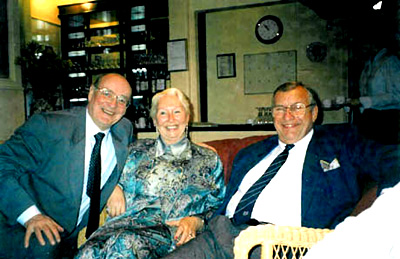
Years later - me with Charles and his girlfriend from the 50s
Maggie Golding who went on to become Headmistress of
several schools for autistic children
At this time, Charles persuaded me to have Judo lessons with him at the Budokwai Club, which was a bit late in life to start but I thought – give it a shot. I got only as far as yellow belt, and then decided I really couldn’t devote the time to it, so I stopped.
QUOTE ABOUT CHARLES PALMER: Mr YS Park, president of the International Judo Federation, said, "Charles Palmer is the father of modern Judo.The sport was highly modernised by his efforts.
THE TIMES OBITUARY 20th AUGUST 2001: Charles Palmer, Chairman of the British Olympic Association who played a key role in sending athletes to the Moscow Games in defiance of the Government. Few Britons have ever played such a significant and contentious role in the administration of world and domestic sport as Charles Palmer.
I knew Joe and Bruce Robinson, who were both actors, fight co-ordinators and stuntmen; Joe played opposite Diana Dors in ‘A Kid for Two Farthings’; they also ran Judo classes in a gym next door to the Comedy theatre.
The difference between them and the Budokwai, was that they were not officially recognised by the Judo authorities, since they were professionals. They invited me to go to their class to see what it was like. I think their method of awarding belts to their pupils was a little less stringent than the methods used at the Budokwai, because I went on the mat with a green belt that I knocked over, and then a brown belt, who I managed to throw.
Doug who had a short fuse, unlike the easy-going Joe, said, ‘You’re so good, come and practice with me’. He proceeded to bounce me round the gym like a tennis ball. He kicked me so hard on my shin that I developed phlebitis, and I could sink my finger into the bone for weeks afterwards. Joe saw what was happening, and fortunately stopped him before he injured me really badly.
Since I was winning at poker, coupled with the fact that I was in a reasonably lengthy run with ‘Brouhaha’, I could pay off all my arrears of rent and any other debts, and still have enough left over to purchase a second hand Austin Healy sports car. It was racing green, and a convertible. It was essentially a two seater, but you could just about squeeze two vertically challenged people into the back. I confess, I did drive it too fast.
I was once proudly driving my new acquisition through the West End, when the lights changed, and the car in front of me stopped very abruptly. I wasn’t able to pull up in time, and I ran into the back of the car. No great damage, but my two headlights were broken. Imagine my horror, when out of the car in front stepped Alastair Sim. ‘Oh Dickie’, he said. ‘I see you’ve broken your car’.
On another occasion, at 2 a.m. in the morning I was going to a poker game, speeding down the Embankment which was deserted, at 100 miles per hour. I suddenly noticed in my rear view mirror, a police motorcyclist pull out from a side street behind me. I didn’t put the brakes on, because I didn’t want him to see the braking lights; instead, I changed down through the gears. When he caught up with me, he said, ‘I must congratulate you on your use of the rear view mirror, but on a conservative estimate, I think you were doing about 95 miles per hour. But since it’s clear and deserted, and you were observant, I’m going to let you off, but don’t let any of the young ones catch you, otherwise you’ll be in trouble’.
About four weeks later, I was going to play in a cricket match against the police at Imber Court; I was doing about 35 miles per hour alongside Tooting Common, when I was pulled over by a police car and given a ticket. I said to the officer, ‘I’m awfully sorry, I am a bit over the speed limit and I’m late for a cricket match against the police’. ‘Well, I don’t play cricket myself’, he said as he handed me the ticket. So far, that’s the only ticket I’ve ever had for speeding. I do drive a lot slower nowadays, but I really enjoyed driving that car.
|
|

|
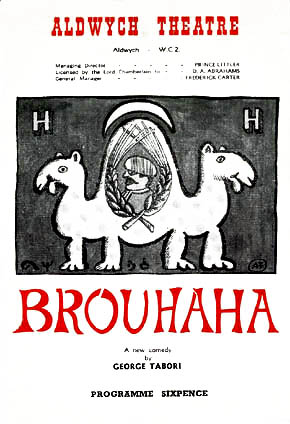
|
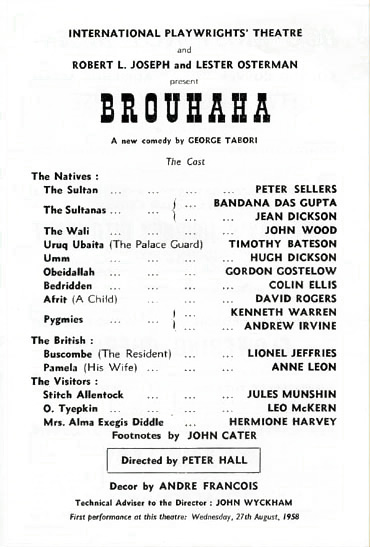
|
PETER SELLERS QUOTE: "There used to be a real me, but I had it surgically removed".
|
|
1959 |
After ‘Brouhaha’ closed in the spring, it was back to the Labour Exchange and more poker. Toby Rowland gave me a job as Company and Stage Manager with a play called ‘Detour After Dark’, which did a short tour and then opened at the Fortune Theatre on 8th June. In the original cast were Maxine Audley and Albert Dekker, who was a Hollywood film actor who had made many films, usually westerns, playing the villain. Bill Franklyn my late landlord, and Moira Redmond were also in the cast.
The show wasn’t working very well on tour, and Maxine Audley and Albert Dekker decided to leave. They were replaced for London by Lyndall Barbour and Steven Murray.
It was whilst we on tour that I first met Freddie Granville, who was married to Maxine Audley (he met her when they were both appearing in ‘Tobias and the Angel’ at the Arts theatre in 1953), and he accompanied her everywhere.
Freddie wasn’t sure what he wanted to do. He’d been an interpreter in the army during the war, and afterwards, swanned around a bit doing various jobs – one of them playing an Indian drummer in the play at the Arts theatre when he met and married Maxine. Freddie and I hit it off very well together for the short time on tour.
The show opened in the West End on Monday 8th June; the daily press were scathing. It was decided to close immediately, and we finished on Saturday night. The Sunday papers came out and we got several rave reviews. Too late; out of work again, but no financial problems - thanks to poker. |
|

|
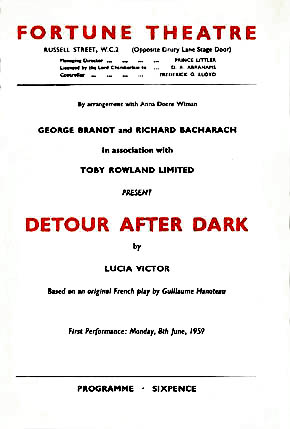
|
| |
‘DETOUR AFTER DARK'
In Order of Appearance:
...
|
Luc |
|
William Franklyn |
Chris |
|
Moira Redmond |
Chauffeur |
|
Michael hawkins |
Batil'e |
|
Lyndall Barbour |
Antoine |
|
Stephen Murray
|
| |
Directed by David Alexander |
| |
On tour Maxine Audley played Batil'e and Albert Dekker played Antoine |
| |
| |
|
TOBY ROWLAND QUOTE: "We should have waited for the Sunday notices."
The next show I was engaged on as Company and Stage Manager was ‘The Ginger Man’, which was a stage version of J.P. Donleavy’s successful novel. One of the producers of the show who also designed it, was Tony Walton, the husband of Julie Andrews; one of the highlights of the meetings planning the show, was being invited back to Tony’s home for tea, provided by the very charming and talented Julie.
In the cast were Richard Harris, Isabel Dean, Wendy Craig and Ronald Fraser. Richard had trained at LAMDA and then joined Joan Littlewood’s Theatre Workshop; Joan’s style of improvised creation and acting appealed to him. His first production with her company was ‘The Quare Fellow‘. He was a tall, craggy, boisterous individual, with a large capacity for Guinness, and an enormous ego. He was born in 1930 in Limerick, and at nineteen years old, contracted tuberculosis.
After two years recovering from this, he decided to take up acting and enrolled at LAMDA. He always said the illness was the best thing that happened to him because, instead of continuing to play Rugby for his province, Munster, with a possibility of playing for Ireland, during the two years he was ill he read most of the classics, which made him decide to be an actor.
During rehearsals he had an argument with the director, Philip Wiseman, and walked out of the theatre. The cast and director were left looking at each other with their mouths open wondering how to proceed next, since Richard was virtually in every scene. I suggested it might be an idea if I went to his flat in the Earls Court Road to try and persuade him to return.
I’d forgotten the exact address, but knew it approximately. I was dithering on the pavement, when from the third floor window of the house I was standing in front of, I heard the sound of an altercation between a man and a woman, furniture being thrown about and glass shattering. Something, I’m not sure what it was, hurtled through the window. This, I thought must be the place. The front door was open and I proceeded up to the third floor flat, and sure enough, there was Richard involved in the most terrible row with his wife.
Previously the Honourable Lady Elizabeth Rees-Williams, daughter of the Liberal peer Lord Ogmore, she had married Richard approximately two years earlier, when she was nineteen,. After a great deal of persuasion from me, and a great deal of help from the lovely Elizabeth, he returned to rehearsals.
We opened at the Fortune Theatre on September 15th 1959. During the run of the play, he was obsessed with keeping his energy levels up to a high enough standard to cope with the taxing role of Sebastian Dangerfield. With this in mind, he invariably had the theatre doctor come in, to administer an injection of vitamins before the performance.
The run of the play was largely uneventful, apart from the fact that Ronnie Fraser, who had been known to sink a few jars, tried to match Richard drink for drink - I think it was a dead heat.
Shortly after, Ronnie was told by his doctor to give up drinking or die. I met him one night in Gerry’s club and he seemed very happy. ‘You haven’t been drinking, have you, Ronnie?’ I asked. ‘No, my darling - I’m smoking pot instead’.
On one occasion, Richard invited me to have a Guinness with him before the show. Knowing where it was likely to lead I declined, saying that I didn’t like Guinness. He grasped me by the collar and fixing me with a baleful look, said, ‘I never trust a man who doesn’t like Guinness’. After about five seconds he gave one of his great shouts of laughter, and let me go. ‘Only joking’, he shouted.
Apart from his odd tantrum, generally I got on well with him, but he did tease me a great deal about my racing green Austin Healy. The play was not a success, and we closed after five weeks.
Later on, Richard’s egomania and drinking habits started to get out of control, and his marriage to Elizabeth broke up. I came into contact with Elizabeth later when she was married to Rex Harrison, who was starring in a play I presented with Bernie Delfont, entitled ‘Henry IV’ by Pirandello.
My next encounter with Richard was years later when I was working with Bernard Delfont. He and Arthur Lewis were co-presenting a play entitled ‘Dylan’ which was to star Richard; the play had been successful on Broadway starring Alec Guiness. It was to be directed by Lindsay Anderson, who had directed Richard in the film ‘The Sporting Life’. On the film, they had struck up a great working relationship, but unfortunately this was not to last.
The play was cast, the set half built, and we were due to start rehearsing the following Monday. On Friday, we received a phone call from Richard saying he couldn’t work with Lindsay Anderson. Bernie and Arthur had decided they were going away for the weekend; they didn’t want to alter their arrangements, so they left me, as a director of Bernard Delfont Limited, to deal with the problem.
I arranged a meeting with Lindsay and Richard in Bernie’s office at the Prince of Wales theatre on Saturday afternoon. Neither Lindsay, nor Richard, would direct one word to each other. The entire conversation was conducted through me, as a third party. ‘You tell him’………‘I’m not listening to that crap' etc., etc. It finished with Richard repeatedly saying, ‘There is no way I am going to work with Lindsay Anderson, unless he directs my character the way I want it!’ and Lindsay Anderson responding, ‘I have no intention in directing this play, unless Richard Harris does as he’s told!’ Throughout the meeting, Lindsay kept saying, ‘Do not expect me at rehearsals on Monday morning’, and Richard responding, ‘Do not expect me either’. After three hours of this, I knew there was no way to break this deadlock so I reluctantly threw in the towel, saying, ‘As neither of you will work with the other, I’m afraid we will have to cancel the production’
We could have tried to find a new director, but this would have cost us more money through delays, and I think Richard had changed his mind, and was looking for an excuse not to do it.
Lindsay Anderson left, and Richard Harris asked if I would like to go out and join him for several pints of Guinness. I thanked him, but told him I had to make several urgent phone calls. I phoned Bernie and Arthur Lewis, told them what had happened, and they accepted that there was no way out. We agreed to meet the cast at 10 a.m. on Monday morning, to tell them that the production was cancelled, and that they would all be paid in accordance with the Equity contract. What with this, and paying for the scenery which was half-built, and the costumes which were half-made, it turned out to be a very expensive non-event.
I subsequently read in the papers of all Richard’s trials and tribulations during the Hollywood years, of his liquor consumption, of up to two bottles of spirits a day, the legendary rows with co-stars, particularly Marlon Brando in ‘Mutiny on the Bounty’, and how they eventually refused to be in the same shot together. I understand the scenes with each other were actually played into blank space off-camera.
Richard spent some of his last years living in a suite at the Savoy Hotel. He was a trifle eccentric in his behavior, usually wearing shabby clothes, with long unkempt hair and a beard. He spent most of his time in various pubs about London, his favourite being the Coal Hole, next door to the Savoy. He died on 25th October 2002, aged seventy-two. A great, hell-raising character, sorely missed by most.
|
|

|
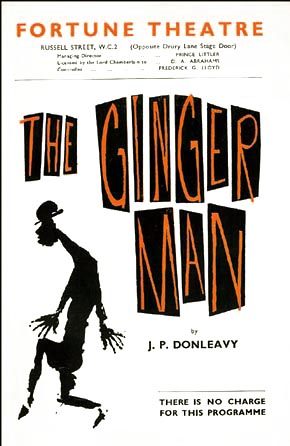
|
| |
‘THE GINGER MAN'
In order of Appearance
... |
Sebastian Balfe Dangerfield |
|
Richard Harris |
Kenneth O'Keefe l |
|
Ronald Fraser |
Marion Dangerfield |
|
Wendy Craig |
Miss Frost |
|
Isabel Dean |
| |
Directed by Philip Wiseman
|
| |
|
|
RICHARD HARRIS QUOTE: "I formed a new group called Alcoholics-Unanimous. If you don't feel like a drink, you ring another member and he comes over to persuade you."
After ‘The Ginger Man’ had been running for a short while, Toby Rowland who was associated with it, asked me if I’d like to double, by taking over as Company Manager of a play entitled ‘The Sound of Murder’ starring Elizabeth Sellars and Peter Cushing. This was easy to do, because the show was at the Aldwych, and I was literally round the corner at the Fortune theatre, and neither of the shows were testing. This was a tremendous bonus, because it meant that I was getting two salaries.
While working there, my cousin Michael asked if I would like to go to a party he was throwing after the show. Among the people present were two extremely attractive blonde girls - Lynda and Penelope Taylor; they were eighteen and sixteen respectively. Lynda had been to modeling school and was trying to break into photographic modeling. She got a few jobs, but it wasn’t exactly a brilliantly successful career.
We went out together and she would always accompany me to cricket matches in my Austin Healy. Bill Franklyn commented, ‘You’ve got all the props haven’t you – a beautiful tall blonde girl and an Austin Healy sports car’.
‘The Ginger Man’ eventually closed, but I was still in employment with ‘The Sound of Murder’ which took me through to the end of the year.
|
|

|
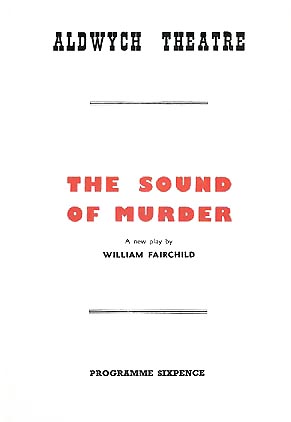
|
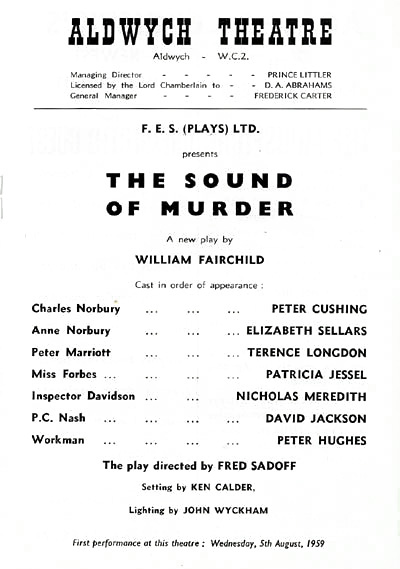
|
PETER CUSHING QUOTE: "There are all sorts of reasons why I don't do much work in the theatre, the main one being that after two performances I feel I've given all I can. I hate repetition, I really do. It's like asking a painter to paint he same picture every day of his life."
|
|
1960 |
The ‘Sound of Murder’ closed on Saturday 20th February. There was no work on the horizon, but my time was fully occupied with poker, cricket practise indoors at the Middlesex Cricket School, and Judo lessons at the Budokwai club with Charles Palmer. His favourite joke was to pin me down, and then offer me a free lesson if I could escape. After a couple of attempts, I said, ‘Don’t be silly, it’s impossible’. He replied, ‘Well, if you were drowning you’d clutch at straws’. My response was, ‘Since I’m not drowning, and you are certainly not a straw, I’ll just pay for the lesson, if you don’t mind’.
He told me a story about after a very good lunch on a hot day; he fell asleep whilst in a hold-down grip on top of a novice, and was awoken by a gurgling sound. He looked down and saw his pupil purple in the face, gasping for breath. ‘I was just demonstrating taking to your endurance limits’, said Charles quickly. ‘Endurance limits – nothing’, gasped the pupil. ‘You were snoring’.
Tommy Steele joined the poker game about this time – one of the most multi-talented people I know. He was one of the first people to introduce rock and roll to this country. After he left school, he joined the Merchant Navy. Whilst he was working as a cabin boy on one of the Trans-Atlantic liners, each time he docked in New York, he would listen on the radio to the latest trends in popular music, and buy the most recently released records, which couldn’t be obtained in England.
He taught himself how to play the guitar, then when he returned to London, he used the material he had found in America, and played and sang in the 2i’s coffee bar in Old Compton Street, where he was discovered.
Entertainer, composer, painter, sculptor, singer, dancer, actor and a hard-headed business man. Some people’s conception of him is that he is tough and rather mean; this is a persona he cultivates, rather like Jack Benny. I used to tease him by saying he still had the original white fivers that he earned. Years later in the 1980s, he said to me, ‘You’re never going to believe this, but the other day I put on a suit that I haven’t worn for twenty years, and in one of the pockets was a white fiver’.
As far as I am concerned, knowing him well, or better than most people, he is extremely caring and generous. After his Anniversary Show in Coventry in 1976, he presented me with a picture which he painted especially for me, called ‘The Poker Player’.
He never misses the birthday of his godson, my autistic son Matthew. Over the years, Tommy always appeared announced or unannounced, for Christmas and Matthew’s birthday bearing a present, and usually one for my other son, Christopher. Now, Matthew is in a special placement just outside Doncaster. Tommy always sends him something for Christmas and his birthday, and makes a point of asking me to thank on his behalf the people who are looking after Matthew.
A sample of Tommy’s jokey meanness was at a theatrical club we used to frequent, called Gerry’s, which was named after the original owner Gerald Campion, and was subsequently taken over and run by Bunny May. Tommy suddenly took to appearing at lunchtimes, carrying his own meat pies and would ask Bunny, (who had understudied him in ‘Servant of Two Masters’), if he would be kind enough to heat them up for him. Bunny stood for this about three or four times, and then, had a large notice posted on the wall saying: ‘All members are respectfully requested not to bring in their own food’.
One day an excited Tommy came up with a scheme for Bunny. ‘We’ll get an old stop-me-and-buy-one tricycle, with a big container on the front, and we’ll put hot drinks and sandwiches in it. You cycle round with it to film locations in London, as since the outside catering is usually not very good, they’ll buy from you - we’ll make a fortune’. Bunny’s reply was, ‘No thank you - you cycle round with it’.
It was about this time Tommy told me the story of when he was starring in a television spectacular. He was standing at the top of a long staircase behind some closed doors, waiting to make his first entrance - feeling extremely nervous, when the stagehand who was standing next to him, positioned to open the doors, turned, and said to him, ‘You know there are 15 million people watching this show’ - which didn’t do a lot for Tommy’s nerves.
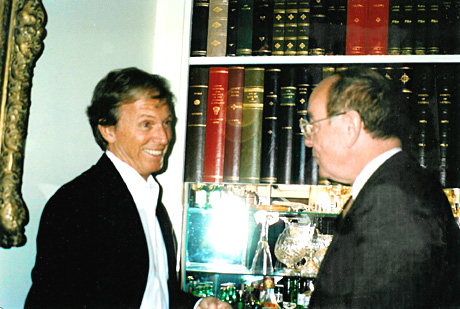
Tommy and me years later
My ex-girlfriend Jessica and I remained firm friends, seeing each other occasionally. However, seeing Jessica or indeed any other girls had to stop for the time being, since I married Lynda Taylor on March 28th.
She obviously couldn’t move in with me at George’s flat, so it was a question of finding somewhere else to live. Her parents, Daphne and Charles Taylor, (Charles was a geo-physicist who was responsible for interpreting the sysmic charts which ascertained the position of the North Sea oil wells).were both delightful,they asked if we would like to go and live with them at a big house they had just purchased in Streatham. This, we did.
You hear horrendous stories about mothers-in-law, but Daphne, who was only about ten years older than me, (she’d had Lynda when she was eighteen), was wonderful. She was like an elder sister, and for years I still kept in touch with her, speaking to her once every two or three weeks. Sadly she passed away in 2008.
Life was great with Daphne and Chas; they had no problem with my poker playing or backing horses, which I used to do in those days – in fact Daphne used to join me, and every Saturday afternoon we’d sit watching the racing, and placing bets on the telephone. It was very draining - the volatility of the results – in fact it was so draining, I used to have to go to bed for an hour afterwards, to recover. But when I woke, Daphne was always ready with another splendid dinner for me.
It was shortly after this that I decided to give up horse racing, because I was never happy. If I lost – I was unhappy, and if I won – I was unhappy that I hadn’t put more money on. So, I figured if I was going to be unhappy either way, I might as well stop.
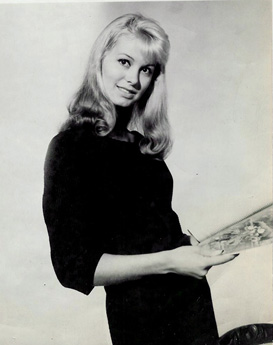
Lynda - my first wife
This pleasant life was rudely interrupted by Toby offering me another job. It was a play called ‘Will You Walk a Little Faster’ by Patricia Joudry, starring Diana Churchill and Michael Gwynn, directed by John Clements.
When we were auditioning, John Clements said to me, ‘I have a way of working which you will probably find unusual. I block out what I am going to rehearse for the whole rehearsal period. I will be able to tell you what page I will be on, at four o’clock in the afternoon, in three weeks time’. I thought to myself – I’m not quite sure how he’s going to pull this off, but let’s go along with it. His system was to spend five minutes on a page of dialogue. The moment the five minutes was up, the Deputy Stage Manager had to stop him regardless, and they would move onto the next page. If however he had completed the page in four minutes, the additional minute could be added on to the five minutes to be spent on the following page.
Strange as it may seem, the system worked very well for the first weeks of rehearsal; of course, at the end it became more fluid.
In the cast there was a very attractive twelve year old girl with red hair who was extremely confident. John Clements confided in me one day that she was so talented and self possessed, that she frightened him; it was Jane Asher. Apart from her extremely successful career as an actress and cake maker, for many years, she has, with enormous energy and devotion, with every spare moment of her time, supported the National Autistic Society, of which she is currently President.
The play had a short tour and opened at The Duke of York’s theatre on 7th June 1960. Once again – bad press and the show closed quickly. Toby never really had much luck with all the plays he presented, although among them were some good ones.
In later years when I was chatting to him, I asked him what he was going to do next. ‘Oh, some play which the theatrical agents Blanche and Eric Glass want me to do. I don’t particularly want to, but they’re putting up all they finance’. It was called, ‘Watch It Sailor’ and it turned out to be the biggest success he ever had, running for over two years at the Apollo, and making him a great deal of money.
John Roberts, who was Toby’s General Manager, left at about this time to join Peter Hall in setting up Peter’s brainchild, the Royal Shakespeare Company at the Aldwych theatre. As I was out of work, I used to pop into Toby’s office to keep him company, and do some of the work that John used to do, plus any odd jobs. Toby was always very interested in reading my diary, to see how my poker sessions were going. He told me that with my poker winnings, sometimes, I was earning more than him! |
|

|
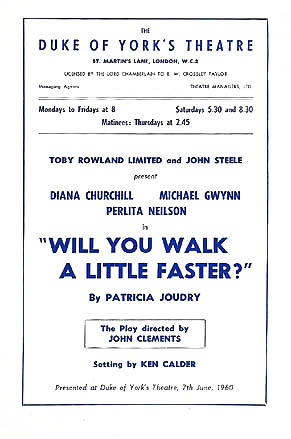
|
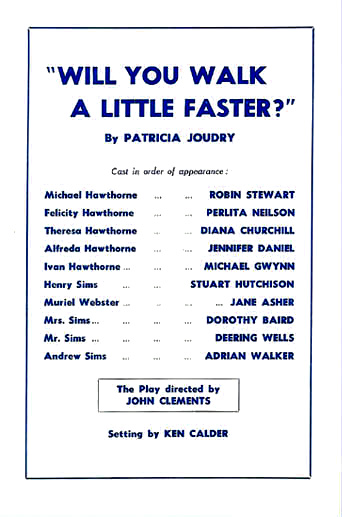
|
JANE ASHER QUOTE: "Of all the things I do, acting is the thing that grabs most, but there's another level on which it strikes me as being a little silly. In the end you're dressing up and deciding to be somebody."
The next job Toby offered me was ‘Pool’s Paradise’, by Philip King, starring the married couple, Pat Kirkwood and Hubert Gregg. Patsy Rowlands, who played a small part, formed an attachment with my Deputy Stage Manager, John Walters. Patsy’s father was a butcher, and she used to feed John enormous fillet steak sandwiches - I never got any.
The production was uneventful. Pat Kirkwood was very pleasant and unassuming, considering what an important star she had been. At the age of eighteen, a West End revue, 'Black Velvet', was her entry into stardom. For several years she was probably England's number one musical performer. She then went to Hollywood to star in an MGM picture, but various dramas which arose during the filming caused her to have a severe nervous breakdown. It was reported that she tried to commit suicide and was in a sanitorium for eight months. (This apparently caused her to lose the leading role in the British production of 'Annie Get Your Gun').
She eventually returned to the West End Stage and had several triumphs - among them, starring in Noël Coward's musical 'Ace of Clubs', 'Peter Pan', and 'Wonderful Town'. However, she could never escape the label of being rumoured as Prince Philip’s girlfriend.
Hubert Gregg was a bit of a pain, always complaining among other things, about the amount of starch the wardrobe mistress put in his dog collar, (he was playing a vicar).
Whilst the show was in Manchester on tour, Lynda was taken into hospital to have our baby. I couldn’t be present, so all I could do was keep phoning the hospital. I was in the middle of a poker game after the show at a pub near the Opera House stage door, when it came time for me to make my phone call. I excused myself from the game, phoned the hospital, who informed me that Lynda had just delivered a baby girl and they were both fine, but it wasn’t possible to speak to her at that time.
I rejoined the poker game; Garfield Morgan who was one of the players, recounts that he’d never seen such a cool reaction to fatherhood, because I didn’t say anything for about half an hour and then, in-between hands, I said, ‘Oh, by the way, I’ve just become a father’. I’d guessed they couldn't have cared less, and were more interested in the poker game.
The show wasn’t working very well, so it was decided to take it off for re-writes, and present it hopefully in a much improved state at a later date.
During the out of work period, I was playing quite a bit of squash, mainly at the ‘In and Out Club’, and having Judo lessons once or twice a week. I thought I was reasonably fit, but one day I made the mistake of playing squash with Bill Franklyn for an hour, and then going straight to a Judo lesson, at the end of which, I nearly passed out with exhaustion. This was a mistake I was not to repeat.
I went in for the Judo gradings in December, and received my Yellow belt. I think if I’d really applied myself to it, I could have eventually obtained much higher grades - possibly even a Black belt, but I felt I was too old by now, and I couldn’t afford to devote the necessary time and dedication to it. I therefore reluctantly gave it up, and instead tried to become a Black belt at poker.
In January recommenced rehearsing ‘Pool’s Paradise’, which had now been re-written and had some cast changes. We opened in February at the Phoenix Theatre - we closed on March 11th - another failure for Toby.
Whilst we were at the Phoenix, our theatre cricket team tried playing football. The team included Sam Kydd, Lee Montague and Ray Cooney. We played for about half an hour and then we were all so knackered, we decided to stop, and in future concentrate on cricket instead.
|
|

|
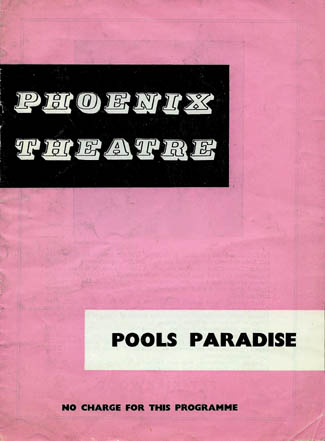
|
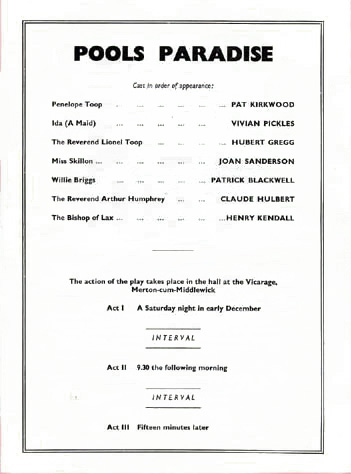
|
1961 |
In the last two weeks of the run of ‘Pool’s Paradise’, I received a phone call, asking me if I would meet Wolf Mankowitz who was producing a new musical. I saw Wolf in his small office above the Spode china shop in the arcade running between Piccadilly and Jermyn Street. We got on well, and he engaged me as Company and Stage Manager. The musical was called ‘Belle or The Ballad of Doctor Crippen’, music and lyrics by Monty Norman, book by Wolf Mankowitz.
Billed as a music hall musical, it told in a music hall setting, the story of Dr Crippen, his wife Belle Elmore, and Ethel le Neve, his mistress. George Benson played Crippen, Rose Hill - Belle, Virginia Vernon - Ethel. Davy Kaye and Jerry Desmonde played a music hall double act, performing as narrators.
As history tells us, Dr Crippen murdered his wife Belle Elmore, a second-rate music hall performer, and fled with Ethel, his mistress, who was disguised as a boy pretending to be Crippen’s son, on the SS Montrose bound for Canada. He was the first person ever to be apprehended using the new found technology of the wireless telegraph.
The captain of the ship, Kendall, who had read about the search for Crippen in the papers, had become suspicious of Mr Robinson, (which was the name Crippen was travelling under), and his ‘son’. He telegraphed Scotland Yard, and detectives were dispatched on a faster ship, the SS Laurentic, which only took seven days to cross the Atlantic, as opposed to the eleven days taken by the Montrose. They were there, ready to arrest Dr Crippen and Ethel le Neve when they docked at Father Point, in the St. Lawrence river in Canada.
At the subsequent trial, Crippen was sentenced to death, but Ethel le Neve was found not guilty, and released as there was no evidence that she was involved, or indeed even knew about Belle Elmore’s death. Ethel was still alive when we presented ‘Belle’ but she didn’t send us a first night telegram wishing us luck, nor did she come backstage to congratulate the cast when she came to see the show incognito.
Such ingratitude - after we had made her a star. She died at the age of eighty-four in 1967.
‘Belle’, because it was performed in a music hall manner, was quite up-beat and amusing. The budget for the show was rather tight, and I finished up acting as Production Manager as well as Company Manager. Wolf also asked me to work out some old-fashioned musical hall gags for use in the show.
It was a very heavy production, and we all worked flat out. By the end of the tour, my weight had dropped from twelve and a half stone to eleven stone. Fortunately, I was assisted by two very good Deputy Stage Managers, Barry Busbridge and Peter Gardner, otherwise I would have probably weighed ten stone.
We had opened at the Kings Theatre Southsea, toured for a short while before opening in the West End at the Strand theatre on May 4th. The critics failed to see the joke - considering it in rather bad taste. We closed on June 10th. Just prior to closure, Wolf Mankowitz, who was known for not taking things lying down, arranged for the entire cast in costume to parade up and down Fleet Street, with a coffin which was used in the show, carrying a banner saying: ‘Here lies the corpse of the musical Belle which the critics have murdered’.
Ethel le Neve was asked in 1954 if she would marry Crippen if he were miraculously to reappear. She replied without hesitation, 'Yes I would'.
|
|

|
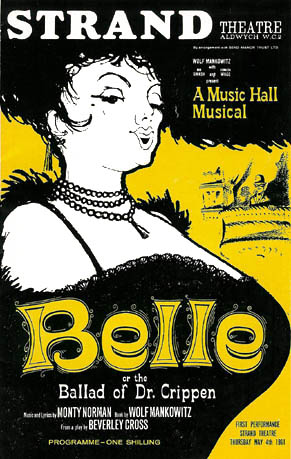
|
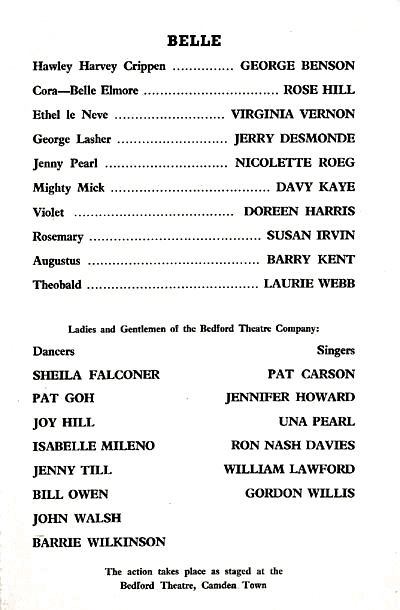
|
1962 |
There was no immediate prospect of any work, so as usual, I spent a lot of time playing poker and cricket, and wondering where the next job was coming from. After a few weeks, I decided that with a wife and child to support, the insecurities of the West End theatre were not for me, so I wrote letters to television companies, asking if there was any possibility of obtaining work as a floor manager.
Before there was time for any responses, which incidentally I never received, Freddie Granville, (whom I had met doing ‘Detour After Dark’ with his wife Maxine Audley), phoned me and told me he had acquired the rights to a play running on Broadway called ‘Come Blow Your Horn’.
Although an extremely prolific comedy writer, this was Neil Simon’s first play, turning out to be the only one that was a really big financial success, out of the many critically acclaimed plays of his that were presented in London. Although all the others were well received and had good reviews, they didn’t fully capture the imagination of the general public. They all ran, but they didn't make serious money for the investors. His musicals did better, but didn't make megabucks.
Freddie explained to me, that although he could make deals, he knew nothing about the nuts and bolts of putting shows on, and asked me if I would like to be his silent partner, but with a 50% share of the business. I accepted with alacrity. I found a room for us at the Arts Theatre Club which we used as an office, and we set to work.
Cy Enfield, who later on went on to produce ‘Zulu’ and other films, was to direct the play. Bob Monkhouse played the leading role, supported by David Kossoff, Libby Morris and a young man aged twenty, whose first job it was in the West End ‘proper’ - Michael Crawford - although he had just done a play at The Arts theatre.
Cy was very meticulous with his casting, and I think we saw virtually every young actress in London for the role opposite Bob Monkhouse. Among the many people Cy turned down were: Susannah York, Sarah Miles and Samantha Eggar, but he finally plumped for Nyree Dawn Porter.
In the meantime, Jimmy Grafton, an agent who looked after Harry Secombe among others, obtained an introduction for us to meet Bernard Delfont who liked the idea, and offered to put up all the money and open the play at the Prince of Wales theatre, which was absolutely perfect for the show. Saying was one thing - doing was another.
Freddie and I got involved in all sorts of expense prior to rehearsals, but we could not get one penny out of Douglas Harrison, who was Bernie’s Chief Accountant. It was a classic case of ‘there’s a cheque in the post’. After about three weeks of this procrastination I said to Freddie, ‘We can’t wait any longer. I’m going to see Prince Littler’s representative, Frederick Lloyd, maybe he will be interested.
Mr Lloyd had sent me the two bottles of whisky for catching the burglar during ‘Brouhaha’ and he listened with courtesy and interest. The news of our meeting got back to Bernard Delfont very quickly and there was a cheque from Dougie within two days.
Freddie who was a nightly frequenter of the White Elephant where he and Maxine used to hold court, met up with designer Maurice Binder, who designed the striking credits for most of the Bond films; Maurice agreed to do our poster for nothing. When Freddie insisted we pay him, he said, ‘Well just give me £100 as an investment in the show’. I’m happy to say, that although it nowhere near approached his astronomic normal fee, he did quite well out of his investment.
As well as being a silent partner, I appointed myself Company Manager of ‘Come Blow Your Horn’; we opened at the Princess Theatre, Torquay. During our time there, in conversation, Michael Crawford told me about the play he had just done at the Arts Theatre and that there was a particularly nasty man who was the Stage Manager. ‘That’s my father,’ I said. ‘Well perhaps he wasn’t that nasty’, he quickly replied.
Michael’s comic genius soon became rather apparent. During an early performance, he was playing a scene in which he was trying clumsily to seduce a girl, played by Clare Gordon. By mistake, a piece of ice he was about to put in her drink, slipped out of his fingers and fell on her dress; in trying to retrieve it he got a laugh.
The next day when Cy Enfield was giving notes, he said to Michael, ‘Don’t go for cheap laughs – play for truth, because if you carried that to its logical conclusion, you would do all sorts of things with that piece of ice’. Michael said, ‘Okay’, and at the next performance, went into a routine with the ice slipping down the front of her dress, and him trying to retrieve it, falling over the telephone, and many associated gags. This routine went on for about three minutes, accompanied by hysteria from the audience. Next day at notes, Cy Enfield agreed to sacrifice truth for comedy.
We opened at the Prince of Wales theatre on 27th February and was an enormous success. Bob Monkhouse was very pleasant and unassuming to work with, and blessed with a mind which was quite remarkable in its retentive ability. He was extremely successful as a script writer and as a comedian on television, but this was his first straight role in a play.
At the Prince of Wales, whilst he was not onstage he was never unoccupied for a moment. His dressing room consisted of two rooms; one, a small room where he made- up, the other, a reception room. This room was literally covered from floor to ceiling, (with a gangway for access), with every comedy record that had ever been released, every book on gags, and any comedy material that he could lay his hands on. He studied these avidly, and on many occasions later demonstrated on television that one keyword thrown to him at random, by a member of the audience, could result in a ten minute routine, with plenty more to come if required.
After the show had been running for about nine months, I received a phone call saying that Bob had slipped off a ladder whilst doing some house repairs, and had fractured his ankle, which meant he was unable to perform. By coincidence, his agent, Peter Prichard, had someone available who could take over – Pete Murray. Pete very quickly learnt the part, and took over successfully for a couple of weeks. I thought it was a put up job and that Bob wanted a rest but there was nothing I could do about it.
Later on in the run, Bob who wasn’t very keen on animals, adopted a baby chimpanzee at Chessington Zoo, as a publicity stunt. In spite of his antipathy towards animals, he became more and more attached to the baby chimp, and would visit it and feed it on most days. This seemed to give Bob a new purpose in life. Unfortunately, it all ended in tragedy when the baby chimp was killed by its mother – probably jealous at the attention Bob had given to it. Needless to say, Bob was devastated, and I don’t believe he ever allowed himself to become close to an animal again.
At the start of our run, which was obviously going to be a long one, I thought I would get comfortable in my dressing room. I installed a television set and a divan bed, which I could sleep on to recover from the late night poker sessions.
Freddie and I had by now moved from the Arts Theatre to a single room, just off Pall Mall. There was not a lot happening in the office, so most of the day was spent with me playing Freddie the odd two-handed game of poker, and many games of chess, at which he was far superior. If he concentrated, he could always beat me. If he got bored and lost his concentration, I sometimes won.
Each lunch time I would take a taxi to the Nosh Bar in Windmill Street, and return to the office with several of their delicious salt beef sandwiches and new green cucumbers, which Freddie and I would devour with great enthusiasm whilst playing chess. At the end of this taxing day, it was time to go to the theatre for the evening performance.
Michael Crawford was doing a TV series alongside appearing in ‘Come Blow Your Horn’, and once a week would ask if he could come into my dressing room and watch himself on television; this I was very happy to agree to. Many years later, I was staying at the Mirage Hotel in Las Vegas, investigating the viability of bringing the show ‘Legends’, (which consisted of top quality star impersonators of Elvis, Frank Sinatra, Sammy Davis etc), or one like it, to the Prince of Wales, or alternatively, using it as a Summer Show. Michael was also in Las Vegas appearing in an extravaganza called F.X, which was full of staggering effects. In one scene a fire eating dragon appeared, the size of a London bus, and Michael Crawford, who was playing Merlin in this sketch said, ‘You call that a dragon – this is a dragon’, and a dragon appeared which was almost the size of Piccadilly Circus.
I wanted to see F.X and Michael, but to get through to him was impossible. I went through a procession of people guarding their superstar; the telephone receptionist, the secretary’s secretary, the secretary, and the PA. The PA asked me who I was, where I came from, how I knew Michael, how long had I known him, and what did I want. I said, ‘I’m fed up with all this bullshit – you just tell Mr Crawford, if he doesn’t call me back within five minutes, he can’t watch my television anymore’. He was on the phone in two minutes.
My wife Sheila and I went backstage to see him between the shows, and I sat on the edge of his dressing room table, whilst he reapplied his extremely extravagant makeup for the second show. He explained to me that the theatre was so large, his makeup had to be exaggerated. otherwise his face would just be a pale blob.
We had a very pleasant chat about the old days. and Sheila told him that when Gene Kelly had come over to England to do some casting for the film Hello Dolly, starring Barbra Streisand. not only had he selected Michael, but also Sheila to play Minnie Fay and Isla Blair to play Irene Molloy but American Equity stepped in. and said he could only have Michael.
As usual, Michael was doing some hazardous stunts in the show, and one night he was supposed to leap off a tall rostrum, holding onto a rope which would let him down slowly, but for some reason the rope slackened and he crashed onto the stage. This put him out of the show and resulted in a very protracted lawsuit.
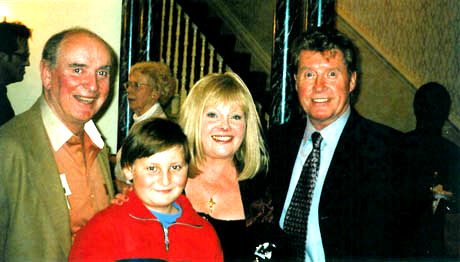
Me, my son Christopher, Sheila and Michael Crawford
I was playing so much poker at Crockfords, that I was approached by the management, and asked if I’d like a job as a Junior Director of the club, running the card room. Although the money was good and the offer tempting, (as a boy watching black and white films, I’d always imagined myself as George Raft, or Glenn Ford in a dinner jacket, running a gaming club), I declined. I was in love with show business, and in any event, although I was happy to gamble, I would have felt guilty about earning my living trading on the weaknesses of people, who sometimes gamble more than they could afford.
I was married, spending an inordinate amount of time playing cards, and working. I didn’t even think about women other than my wife, until suddenly Nyree Dawn Porter told us she was exercising her right to leave the show after six months; we had to find a replacement.
There was an actress that I’d seen on film, who I think I fancied almost more than anyone ever before, (with the possible exception when I was twelve years old of Veronica Lake), and to my delight, she was to be the replacement. It was Shirley Eaton. She was married with a small child, as I was. We became very close friends. She performed for six months in the show, then she left, and her place was taken by April Wilding.
During this time, I had very little contact with Bernard Delfont, but Freddie became very close friends with him; most evenings at 6 o’clock he would have a drink with Bernie in his office, and chat about various things. One evening, Bernie was chatting with Freddie, and told him that he wanted to expand his entertainment empire, and concentrate more on plays and musicals in the West End. He said to Freddie, ‘Obviously if I’m going to branch out and undertake all this additional work, I need someone who knows the West End side to help me. (Freddie told this story against himself). Freddie preened himself, knowing what was coming next, and was dumbstruck when Bernie then said, ‘So, do you mind if I approach your partner, Richard Mills?’ Freddie, being a great guy covered up his disappointment, and said, ‘No – of course not’.
I think Bernie thought of me because I’d bumped into him in the foyer of the Prince of Wales a few weeks beforehand, and had suggested that he might like to see some of the profit projections I had made for the show. He subsequently asked me to meet him in his office in Jermyn Street. Of course, I already knew what the meeting was to be about, since the conversation with Freddy Granville.
Bernie who was born in Russia, was the brother of Lew and Leslie Grade, who had formed their own agency years before. Later on, Lew went on to become the head of ATV. Bernie came to England at the age of two with his parents, who arrived in London virtually penniless.
He was brought up in the East End of London and left school at the age of fourteen. Shortly after, he won a Charleston competition and launched into a career as a dancer. He later teamed up with a dancer called Toko, and toured all over England and the continent as a double act, known as Delfont and Toko. His real name was Winogradsky, but knowing this wouldn’t look very appealing on posters, elected to change it to Delfont, since he felt this gave him a French touch, (at the time Continental acts were very much in vogue).
After various trials and tribulations, at times having no money or food, he decided that this was no way to own a Rolls Royce, so he became an impresario in 1941 with a tour of a play entitled ‘Room for Two’.
He was not called up for Military Service, since he was not yet naturalised, and was still technically Russian. The following year, he presented his first West End production ‘Jam Today’, at the St. Martins Theatre. Thereafter, his career went from strength to strength, with him presenting revivals such as ‘The Student Prince’, ‘Rookery Nook’ and ‘Old Chelsea’, starring Richard Tauber and Carole Lynne. Carole was receiving thirty pounds a week at this time, but when Bernie subsequently asked her to appear in ‘The Student Prince’, she decided to ask for one hundred pounds a week, which was a fortune in those days.
Bernie years later, used to tell the story that the only way out of his dilemma of meeting her excessive salary demands was to marry her, so that at least the money was coming back into the family coffers. Paradoxically enough, in spite of the fact that his mother Olga always wanted a Jewish daughter-in-law, her three sons all married Christian girls. Only her daughter, Rita, married a Jew. Joe Freeman, who was not only Jewish, but a doctor to boot, was a perfect match as far as Olga was concerned.
Bernie, apart from presenting shows, also found time to manage a number of London theatres: The Whitehall, St. Martins and The Winter Garden, which was eventually knocked down to be replaced by the New London theatre. He also acquired the rights to present ‘The Folies Bergere’, and presented a series of these shows, first at the London Hippodrome, then at the Prince of Wales theatre.
At our meeting at his office, Bernie explained his plans about branching out, and undertaking a big programme of West End shows, and how he needed an assistant to help him. He explained that from what he knew, and had been told about me, I might be the person to fill the bill. ‘Well, I’m very flattered Mr Delfont’, I said, ‘and I would like to take the job. But I feel I must warn you that I play a great deal of poker, and I would prefer that you heard it from me rather than someone else - but of course I wouldn’t allow it to interfere with my work’. His response was, ‘If you win, and I’m told that you do - no problem. And incidentally, call me Bernie, all my friends do, and if you cease to be my friend I will soon let you know’.
He went on to explain that he was moving to the Prince of Wales theatre, and that I would be based in Jermyn Street, sharing an office with Billy Marsh, whom I would also assist with the preparation of the many summer shows and light entertainment which Bernie presented. There was also the running of the show side of the Talk of the Town, which was under the supervision of Robert Nesbitt. I was not to get too involved in the agency side of the business, which Billy Marsh was the head of.
Imagine my excitement! Here I was, - to be associated with the Talk of the Town - the best known and most successful night spot in Europe - presenting all the top stars from around the world - Sammy Davis - Ethel Merman - Judy Garland - Tony Bennett - Liza Minnelli etc, etc; and be Bernie’s right-hand man in the presentation of musicals and plays in the West End and running his two West End theatres, the Saville and the Prince of Wales.
Bernard Delfont Blooper: Bernie was always immaculately turned out, but his crowning glory was his beautifully coiffured silver hair. Each morning Carol, his wife, would prepare him for the office by spending five minutes blow-drying and setting his hair. One day, someone asked Bernie how his hair always looked so immaculate. Bernie, not being used to some of the day-to-day expressions replied, 'every morning Carol gives me a blow-job'.
|
|

|
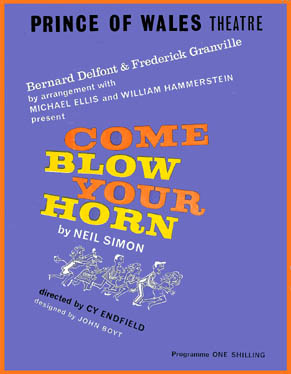
|
| |
‘COME BLOW YOUR HORN'
In order of Appearance:
|
Alan Baker |
|
Bob Monkhouse |
Peggy Evans |
|
Claire Gordon |
Buddy Baker |
|
Michael Crawford |
Mr Baker |
|
David Kossoff |
Connie Dayton |
|
Nyree Dawn Porter |
Mrs Baker |
|
Libby Morris |
A Visitor |
|
Ada Ship |
| |
|
|
Directed by Cy Endfield |
| |
| |
|
BOB MONKHOUSE QUOTE: "I can still enjoy sex at 74 - I live at 75, so it's no distance."
|
|
|














































































